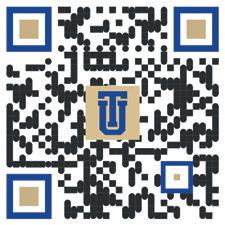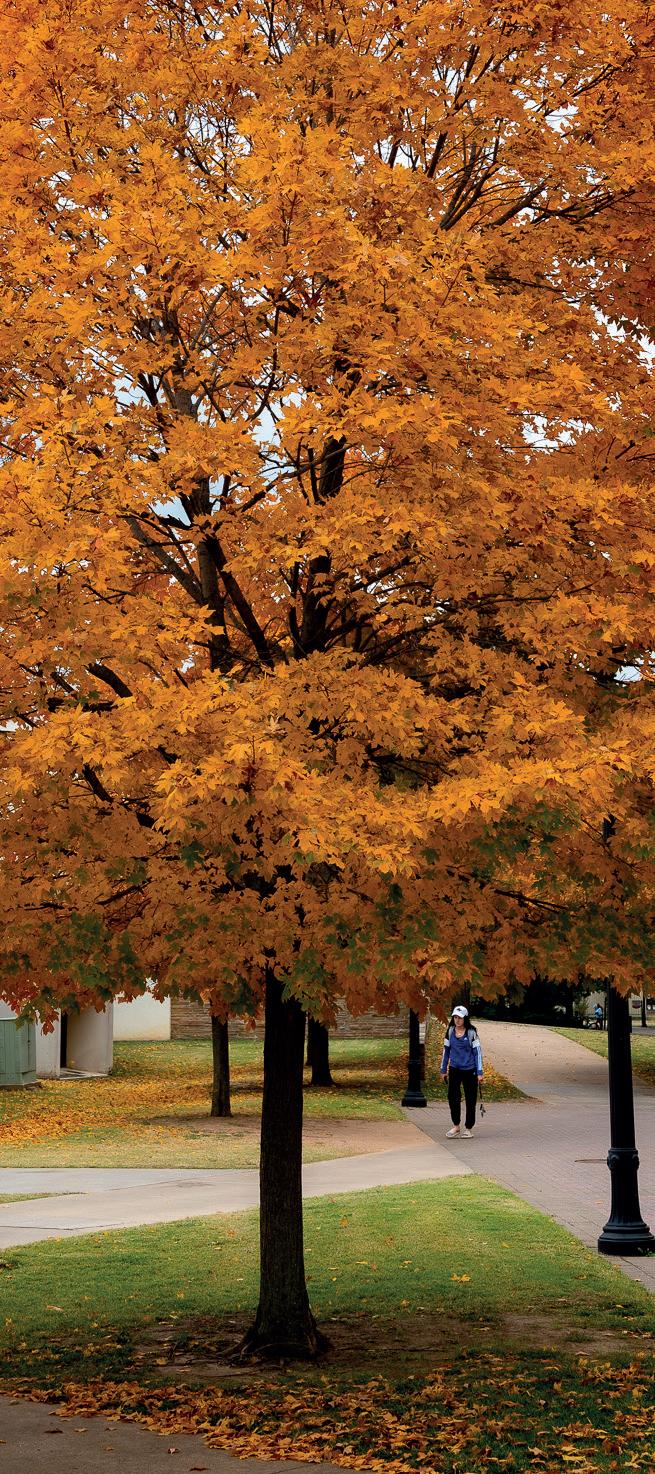



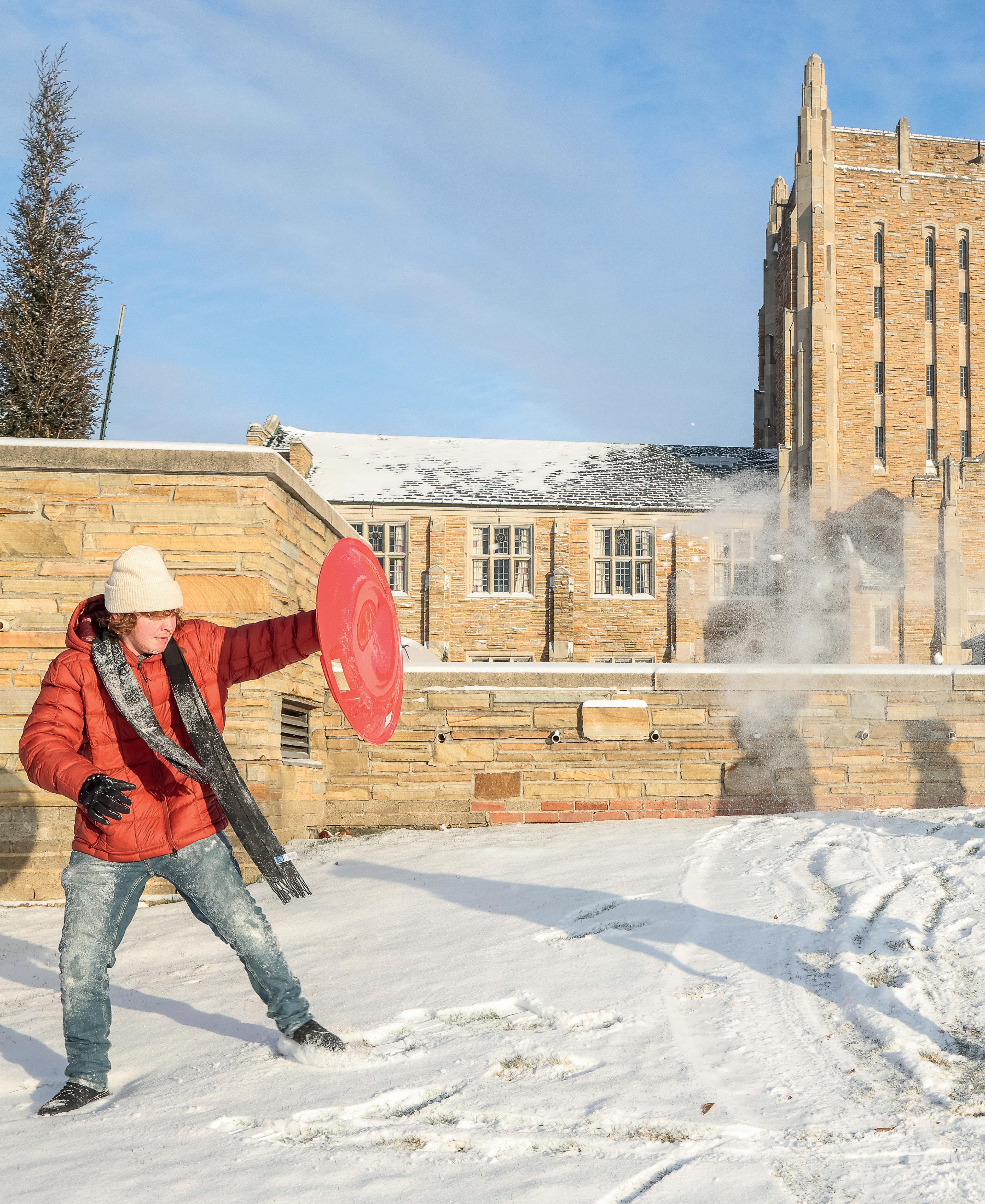








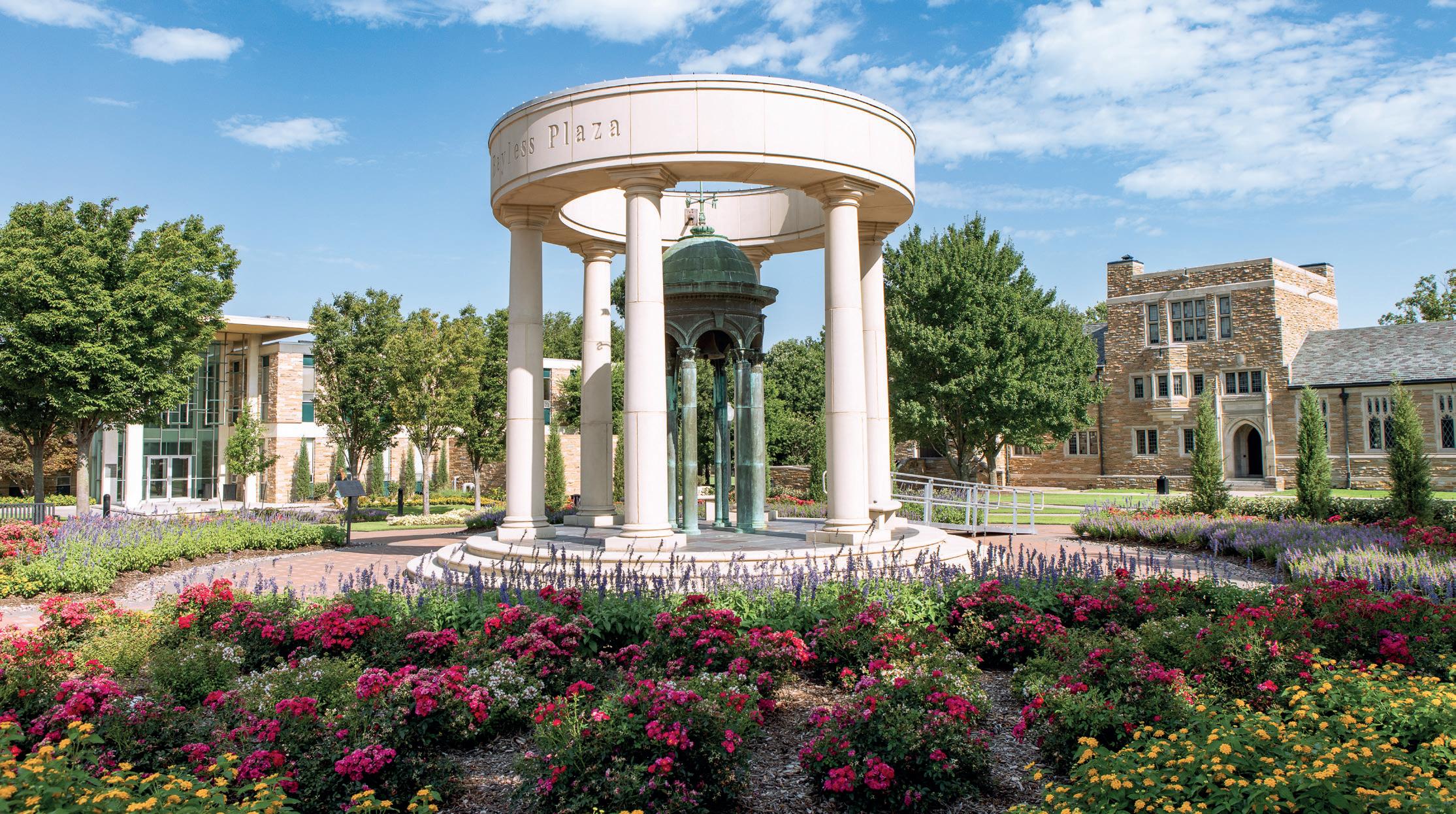
Brad R. Carson, President
Tricia Milford-Hoyt, Vice President, Strategic Marketing and Communications
Amanda Hodges, Creative Director
Mona Chamberlin, Senior Media Relations
and Editorial Director
Leslie Cairns (MA ‘99), Senior Graphic Designer
Ty Lewis, Visual Resources Manager
Kelly Kurt Brown, Photographer
Tom Gilbert, Photographer
Ace Cuervo, Photographer
João Pascoal, Publication Designer
We recognize the Tribal lands on which The University of Tulsa’s main campus resides. We would like to honor and acknowledge the Indigenous tribes including the Ni-u-kon-ska (Osage), Kitikiti’sh (Wichita), and Kadohadacho (Caddo) Tribal Nations as the original inhabitants and keepers of the land and water of which we now call Tulsa, Oklahoma. TU recognizes that our campus is located on the Mvskoke (Muscogee [Creek]) Nation and Tsálăgĭ (Cherokee) Nation, as a result of the U.S. Indian Removal Act of 1830. We acknowledge that the university was first established as a Presbyterian School for Indian Girls with its own history and relationship to the land and campus. We recognize this foundation and assume the responsibility to educate ourselves and others on the history and importance of the land and water that we occupy.
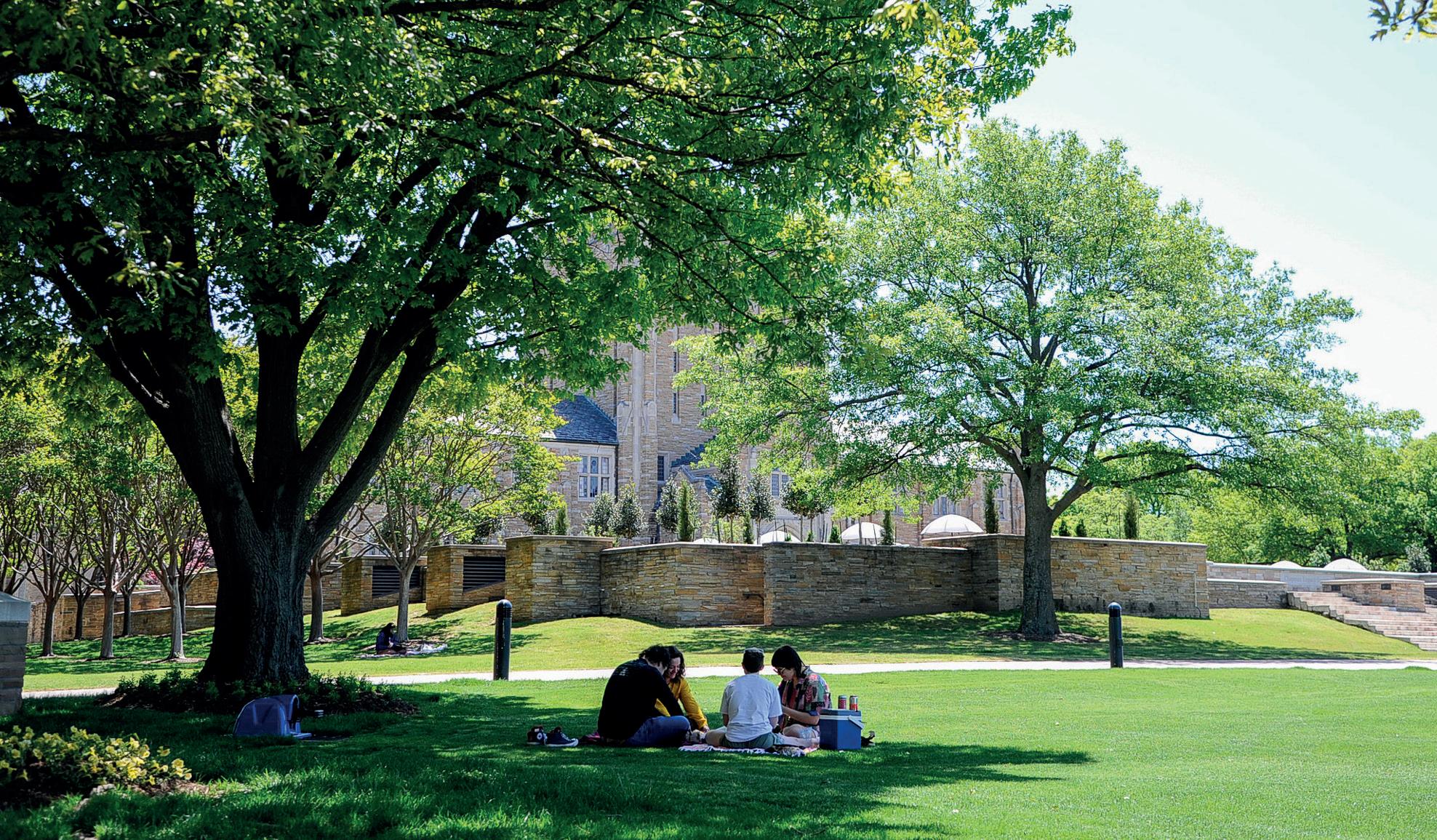

TU blends natural and social sciences in well-rounded, versatile degree

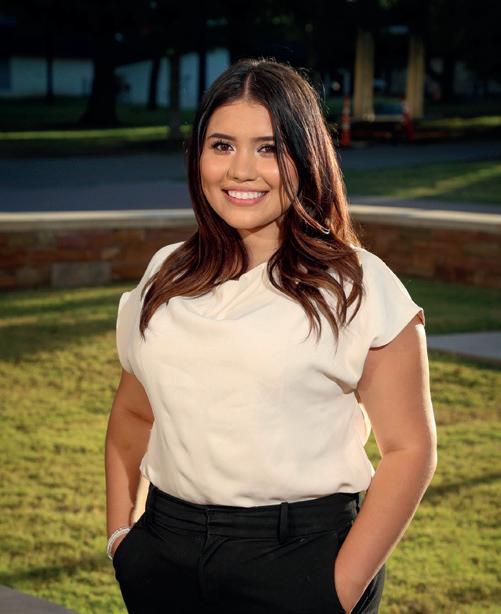
The University of Tulsa reflects on the resiliency of the students, faculty, and staff who weathered the COVID-19 storm
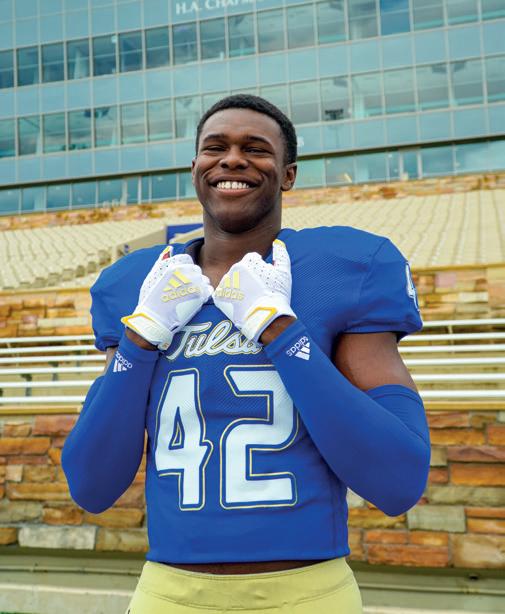
Recruiting Success TU scores with an incoming football class that’s already drawing attention
Why does TU attract National Merit Scholars the most per capita?
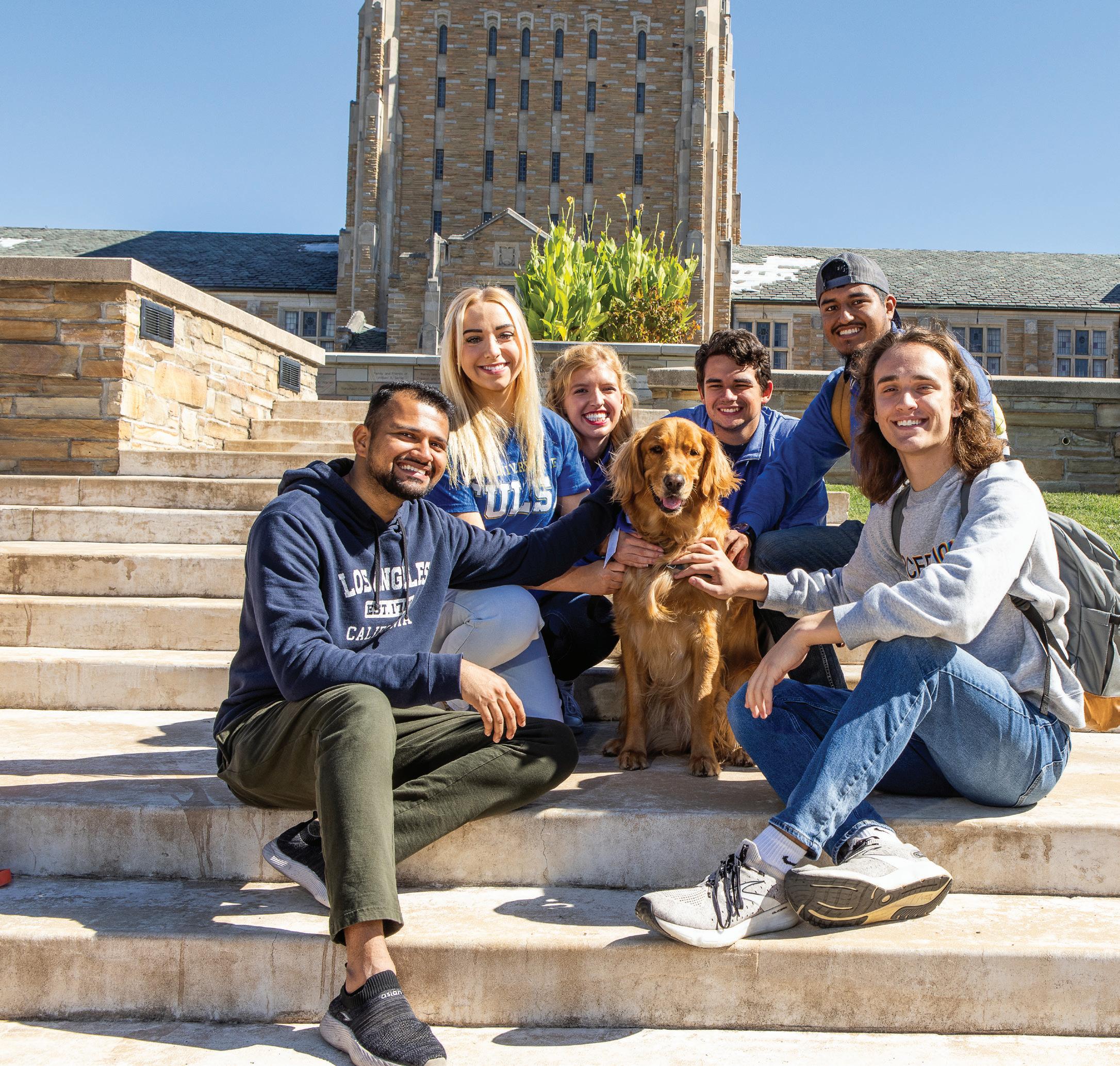
student-to-faculty ratio
$7M+ cyber security program 25
9:1 medical school admits 2x student-managed investment fund

Gilcrease 75th Kickoff
May 3 – 4
Gilcrease kicks off its 75th year with a special First Friday Art Crawl (May 3) and Brewed for Gilcrease (May 4)
Tulsa Mayfest
May 10 – 12
Free, family-friendly outdoor festival in the Tulsa Arts and Historic Greenwood Districts

TU Football hosts Oklahoma State

Saturday, Sept. 14
Tailgating on Chapman Commons
Kickoff at H.A. Chapman Stadium
40 Years with Friends of Finance
Wednesday, Sept. 18
Farhad Azizi (BSIBL ’05), CEO of Azizi Developments
Allen Chapman Student Union, Mary K. Chapman Great Hall

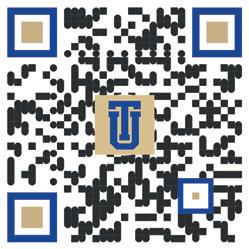
For full details and a list of additional events, please check calendar.utulsa.edu VS

Oklahoma Center for Humanities
2024-25 theme: Space
Lectures, exhibitions, and other programs
101 E. Archer St., Tulsa Arts District
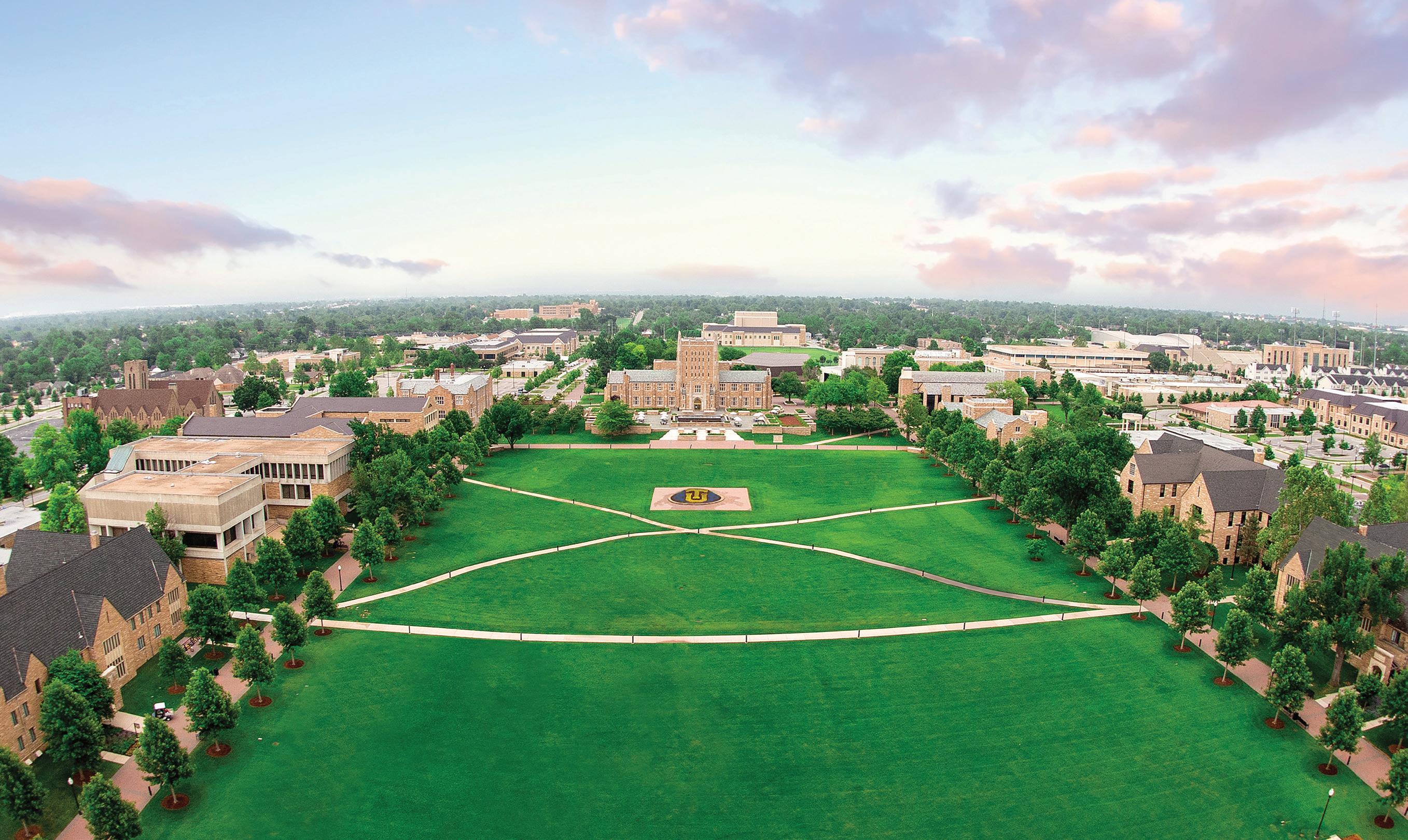
If you have ever visited The University of Tulsa, lived on campus, or spent time in the hallowed halls of TU, you’ve overheard the buzz: “What a beautiful campus!” Now more than ever, the university scenery is drawing “oohs” and “ahs” from students, alumni, and friends. We welcome you to experience it in person!

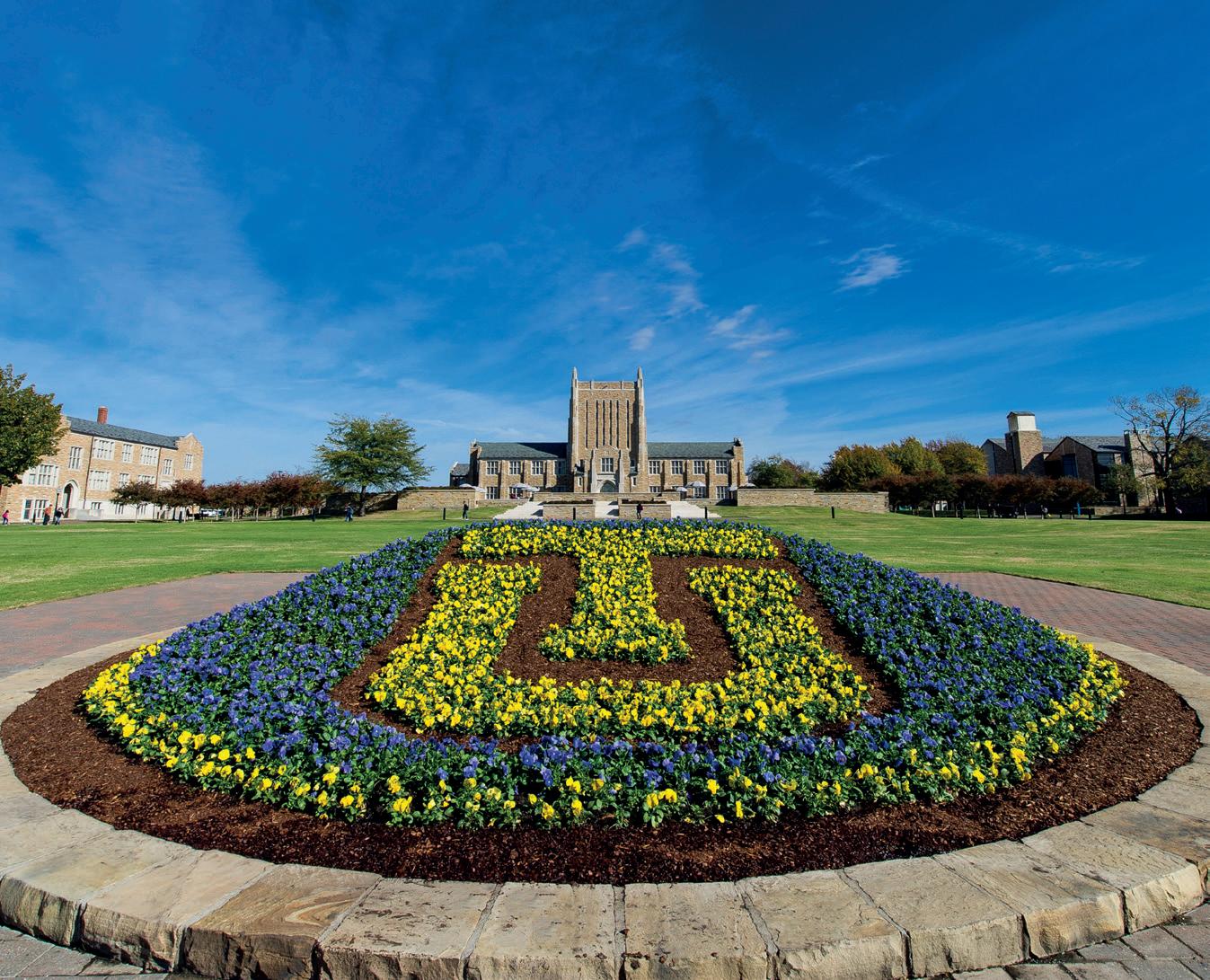
At the heart of campus is McFarlin Library, the university’s academic town square, which is nearly a century old and designed in the iconic collegiate Gothic style. A tiled roof and gables reinforce timehonored campus architecture, while the stained-glass windows adorned with medallions evoke a cathedral grandeur. In front of the McFarlin are the sweeping Dietler Commons, almost 10 acres of emerald that stretches from the library down to Delaware Avenue. Bordered by brick-lined paths and acorn streetlamps, Dietler Commons is adorned with a rich variety of trees, including Blue Atlas Cedars and Highbeam Overcup Oaks. In the center of the green is a raised garden, displaying pansies or other seasonal flowers arranged to spell out “TU” when it’s not serving as the official homecoming bonfire pit.
Situated in an airy space in front of the historic Tyrrell Hall, Bayless Plaza is 7,500 square feet of miniature red roses, flowerbeds that attract butterflies, and walkways lined with bricks that have been etched with the names of thoughtful alumni. The centerpiece of the plaza is the famed Kendall Bell, housed in its copper cupola and encircled by a cyclostyle of cast stone supported by six, 28-foot columns. For 75 years, as part of a treasured tradition, students have rung the Kendall Bell after completing their last final exam, announcing their success to the campus and the world. Kendall Bell symbolizes both the evolution of the campus itself and the evolution of the students’ journey as they conclude their campus careers.
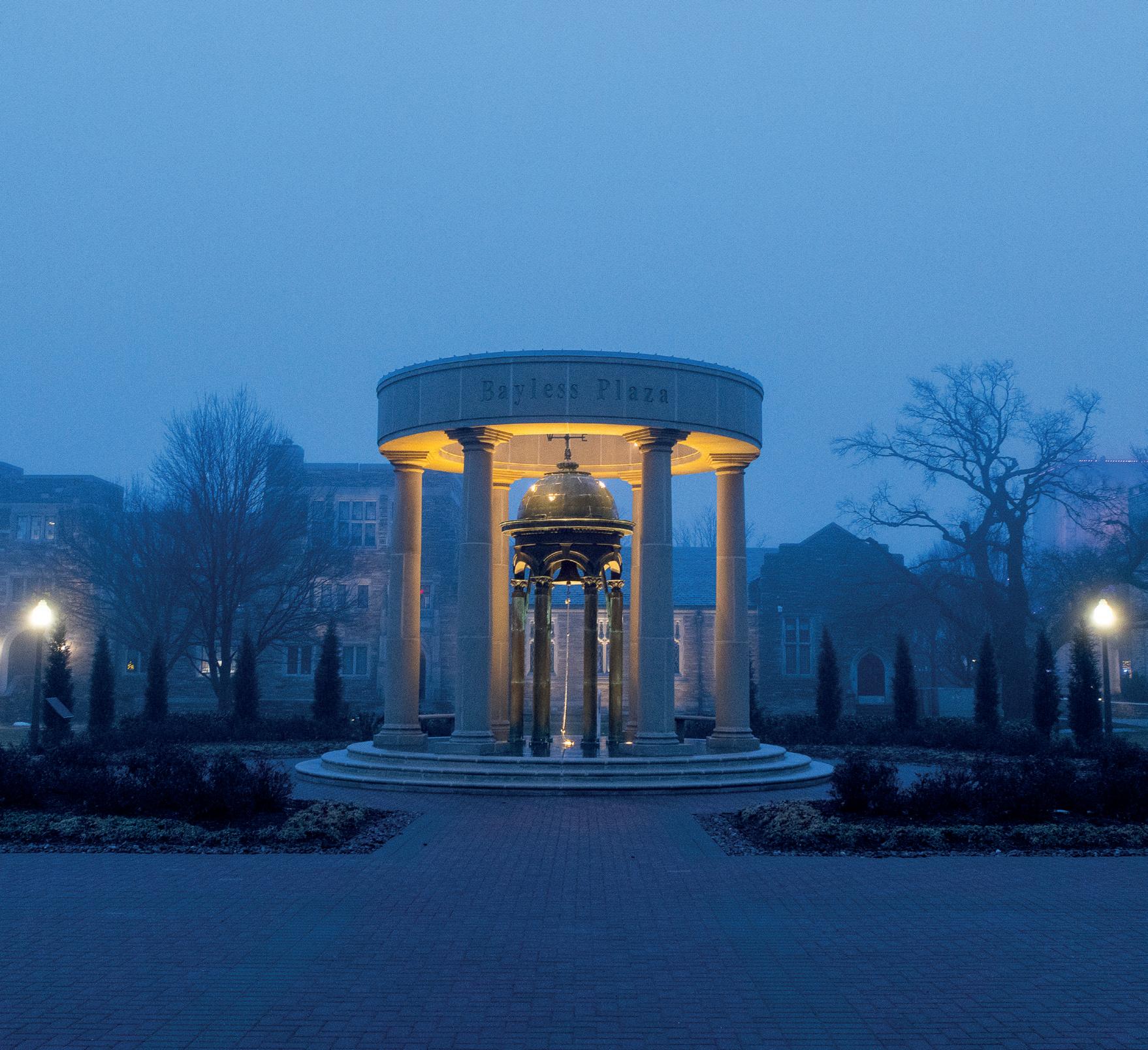

At the west entrance of McFarlin Library sits the expansive Albert Plaza, buttressed by dual raised flowerbeds with white hydrangeas, yellow canna, purple salvia, and rose of Sharon, from which one is afforded a stunning, unobstructed view of downtown Tulsa. Looking out from the promenade of the plaza, Dietler Commons’ sea of kelly green gives way to the Hurricane Track and Soccer Stadium and beyond that the tips of skyscrapers anchored by the Williams Building, designed by Minoru Yamasaki, and shining examples of art deco. As the day closes and the sun sets, the fading light catches the Herculean bronze doors of the library, bathing the plaza in gold as onlookers witness the silhouette of downtown emerge amidst the orange and pink rays of sundown. The skyline is ever present along TU’s landscape, an intentional and continual reminder that TU is the heart of Tulsa.
Nestled between Hardesty Hall and Allen Chapman Student Union is Hurricane Plaza, at the center of which stands the Hurricane Fountain. Sculpted from granite, the structure is designed with carved grooves hugging the fountain’s trunk, conveying the circular motion of a hurricane as the water spills off it. During the spring, the seasonal flowers – pansies, lantana and chrysanthemums – dotting the plaza erupt in full bloom and the brick-laid square becomes a hub for students migrating through the tall archway of Hardesty Hall toward their destinations. Hurricane Plaza is no less popular at night, with students relaxing on comfortable benches under the stringed lights of the plaza’s pavilion or taking an evening walk with friends as the water feature laps in the background.


The 6-acre Chapman Commons offer a verdant welcome to visitors. Wrapped on three sides by the oak-lined Tucker Drive, Chapman Commons provides a picturesque space for students to play or lounge in the sun and is a perfect foil to the imposing Collins Hall, where façade materials combine traditional Tennessee ledge stone with precast stone panels, lintels, and sills. Crowning the Commons is the Genave King Rogers Fountain. Sleek in design, the stone fountain adds a dynamic element to the university’s south-facing entrance, and incorporates in-ground, multicolored lights that glow across the commons at night. The fountain provides a refreshing display as students, faculty, and visitors navigate the paths of the pedestrian- and bike-friendly campus.

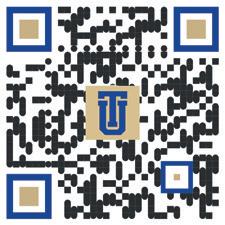
At the east edge of campus, overlooking the sweeping Jackson Commons that border South Harvard Avenue, sits the majestic Lorton Performance Center. A 70,000-squarefoot edifice constructed of sandstone and limestone, Lorton Performance Center’s colonnade commands the attention of passersby with 11 towering arches that act as an impressive gateway to the halls of music awaiting guests. Inside, the two-story Graves Grand Hall greets visitors before they are ushered into the 635-seat Gussman Concert Hall. A monumental presence, the Lorton Performance Center was built with the intention of showcasing the excellence of the School of Music and the university itself.

TU blends natural and social sciences in well-rounded, versatile degree

At many universities across the United States, environmental programs tend to fit into one of two frameworks: either a focus on courses in chemistry, geology, and biology or through a social sciences lens.
At The University of Tulsa’s Kendall College of Arts & Sciences, neither framework fits – or maybe it’s both –said Chad Settle, economics professor and director of TU’s environmental policy program.
“Our students are required to take a series of courses at a minimum in chemistry, biology, and geology and required to take at a minimum courses in economics, sociology, and political science,” he said. “And then there are additional courses that they can take on top of that core that all of our students need to take when they come through the program.”
Students can elect to earn a bachelor of arts degree if foreign language skills are more their interest, or a bachelor of science degree if they want to focus more on math courses.
“The intention is that the TU graduate can be the one person at the table who understands what everyone is talking about,” Settle said. “Oftentimes, there will be biologists using terminology that is incomprehensible to economists. And economists are using terminology that’s incomprehensible to biologists. And since our students are versed in each of those individual disciplines, they’re going to be able to go through and understand what everybody is saying.”
He added that because there are so many different areas where a student can use their environmental degree, the program offers an area of emphasis at the upper division level.
“From a long list of courses that are possible, they choose the ones that are going to give them the narrow focus that they need for whatever job or internship or postgraduate degree they’re interested in pursuing,” he said.
Students may go into graduate programs in biochemistry or biology or

The intention is that the TU graduate can be the one person at the table who understands what everyone is talking about.
CH AD SETTLE
in economics and sociology, or earn an environmental law degree, for example, Settle said.
“In terms of potential postgraduate education, there are abundant opportunities available for our students,” he added. “In terms of jobs, it’s all over the map in terms of what students are interested in pursuing.”
Michelle Merchant graduated with an environmental policy degree and an economics degree in May 2021. “As one of TU’s interdisciplinary majors, the BS in environmental policy exposed me to both hard and soft sciences, providing a well-
rounded knowledge base that’s important to grasping environmental issues and working to address them,” she said.
Merchant is currently the sustainability programs planner at INCOG in Tulsa.
“My work at INCOG requires me to understand the technical sides of environmental issues while being able to communicate on those issues in a way that’s digestible by the general public, which the environmental policy program prepared me well for,” she said.
“In my current role as a sustainability programs planner, I manage programs and coordinate projects that reduce air pollution and promote resilience. To move projects forward, I must match the needs and wants of the community with impactful solutions that are financially accessible.”
Merchant said students in TU’s program learn how to think critically about environmental issues and solutions through both scientific and people-centered lenses. “The BS option in environmental policy provides a solid base understanding of natural and social sciences that are deeply intertwined in environmental issues and solutions, preparing students well for a wide range of environmental career options,” she added.

QUESTIONS
Center for Energy Studies explores economic and policy implications of traditional and renewable energy
Launched in spring 2023, The University of Tulsa’s Center for Energy Studies is taking a leading role in the interdisciplinary study, teaching, and public communication of the complex economic and policy issues associated with energy expansion and transition around the world.
“Research, education, and outreach are our bedrock,” said Eric Olson, the center’s inaugural director and an associate professor of finance. “We envision the center as a place where academics, students, and industry meet. It will support work among disciplines aimed at understanding the policy implications of the energy transition and sharing them with sector partners, government, and the wider public.”
Olson points to the importance of policy-informed cost-benefit analyses,
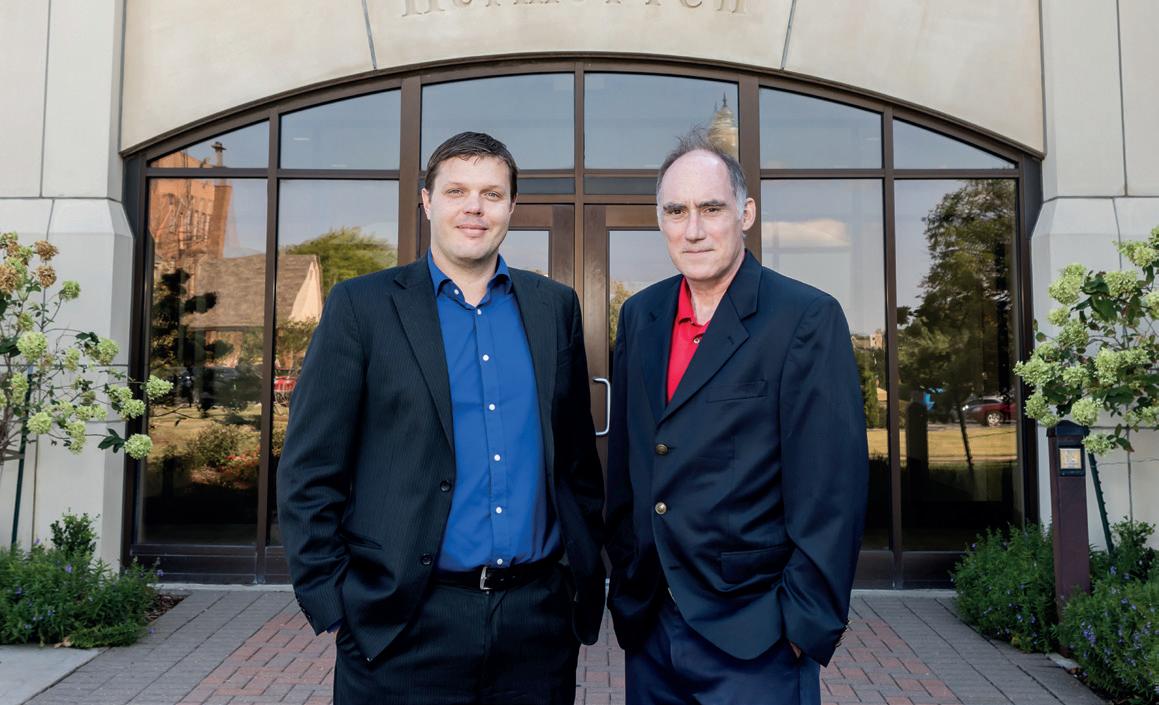
such as how governments can mitigate the disproportionate effects on lower-income people of inflation associated with phasing out gaspowered vehicles. Similarly, he and a finance student are examining the financial consequences of permitting for new energy projects, such as wind farms and pipelines. Partnerships with traditional and alternative energy firms bolster the center’s work. Helping steer this aspect is Anne Grau, an applied assistant professor who brings decades of experience in the oil sector: “We recently formed an executive advisory board, whose members will help keep our curricula current, suggest fresh areas of research, and provide data.”
Industry-related research under way includes a study for Chevron

by Professors Buford Pollett and Ty Johannes on carbon capture utilization and storage for the Port of Catoosa and Oklahoma power plants; and an economic input study for TC Energy examining the hydrogen node project in the Port of Inola, conducted by Grau, Professors Anila Madhan and Tally Ferguson, and three TU students.
Fall 2023 also saw the launch of the center’s Energy Fellows initiative. Its aim is to provide financial and organizational support to TU faculty to engage in research on policy implications associated with energy issues and sharing their findings with the public.
“Faculty-student interaction is the heartbeat of TU,” remarked Olson. “In keeping with this spirit, each Energy Fellow will include students in their research.” The center has also re-established the Sustainability Club, which welcomes students from across the university, and is working with CaneCareers to organize an energy-focused recruiting event at TU’s fall career fair.

For humanities scholars and students, the exploration of literature and art is as much about engaging with the social and political issues of the present as it is with the past. One emerging area of study is environmental humanities.
“Those of us who work in this vibrant field investigate the ways in which historical cultural artifacts, such as poetry, visual art, music, and architecture, commented on ecological issues of their day,” said McFarlin Professor of English Dennis Denisoff. “In addition, our inquiries reveal the myriad ways they laid the groundwork for how we conceive of and address today’s climate crisis.”
Denisoff’s research traces the development of the current conception of environmentalism in part through the environmentalist rhetoric embedded in 19th-century economic and colonial expansionist agendas. “The individuals and institutions that formulated our modern notions of environmentalism, sustainability, and ecojustice tended, as we often do now, to favor white, middle-class materialist values, as well as the rights of humans over other species,” he said. “Collective identities and individual attributes influenced who was given the knowledge and opportunity to recognize abuses of nature, envision alternatives, and act on them.”
In December, Denisoff shared his expertise as the keynote speaker at the “Eco and Ego” environmental humanities symposium held at Italy’s Università Iuav di Venezia. In addition, Denisoff spent an afternoon with Iuav graduate students discussing their sustainability-related research in urban planning, fashion, and design. “The experience reinforced for me the powerful role humanities education is playing in empowering students across many disciplines to use their skills in research, analysis, and communication to combat social and species inequality as well as the planet’s ecological catastrophe,” he said.
Growing up in New Mexico where her family operates an oil and gas business, Ileana Braddock was surrounded by people whose livelihoods were impacted by the booms and busts of the industry.
“Coming into [The University of Tulsa], I had only ever considered traditional oil and gas as a credible means of energy production,” said Braddock, who is studying energy management and finance with a minor in real estate and will graduate in May. “My coursework at The University of Tulsa not only exposed me to facets of the industry such as transmission and distribution but also the benefits and drawbacks of different forms of energy production I had no idea existed. The structure of our curriculum—which is truly unique—is that it teaches on the basis of facts not opinions.”
That’s just the sort of thing Anne Grau likes to hear. She is an applied assistant professor of practice in TU’s Collins College of Business with several decades of experience in the energy industry. Grau said the energy management program is one of only nine such programs in the United States and one of two offered by a private institution.
“Students become fluent in the current energy landscape of traditional, alternative, renewable, and emerging energy,” Grau said. “Courses involve practical and applied education in wind, solar, nuclear, geothermal, carbon management, hydrothermal,
hydrogen, small-scale nuclear, and nuclear fusion as well as traditional energy such as coal, natural gas, and other fossil fuels.”
Grau said the future of careers in the energy industry is marked by a mix of challenges and exciting opportunities, driven by technological advancements, global energy transitions, and a heightened focus on sustainability.
“In today’s job market, roles in renewable energy, such as solar and wind technicians, renewable energy engineers, and specialists in battery technology, are in high demand,” she said. “Additionally, professions related to energy efficiency, electric vehicles, environmental, social, and governance (ESG) analysis, data analytics, and nuclear energy play key roles in the evolving energy landscape.”
Eric Olson, director of TU’s Center for Energy Studies, said the programs have evolved to reflect the industry’s changing landscape, especially with regard to nuclear power, carbon pricing, and renewables.
“Curriculum modifications were made to include more midstream companies, adding courses like geographic information services and environmental health and safety,” he said. “The faculty plans to add more courses focused on nuclear power, renewables, sustainability, and alternative energy.”
Sustainability was a key topic in many classes, said Daniel Dobson, who graduated in December 2022 with a Master of Energy Business.
“This reflects the fact that TU has its finger on the pulse of the energy industry,” he added.
Jared Crawford graduated with a bachelor’s degree in energy management in December and is a

My coursework at The University of Tulsa not only exposed me to facets of the industry such as transmission and distribution but also the benefits and drawbacks of different forms of energy production I had no idea existed.
ILEANA BRADDOCK
commercial analyst for Trillium Energy Solutions’ Zero Emissions team.
“I think that people should know that energy management is more than just a land program. People should know that energy is a rapidly evolving industry and that the energy management program
is an excellent place to learn, grow, and develop yourself professionally,” he said.
Buford Boyd Pollett, director of Energy Management/Master of Energy Business programs, said TU prepares students to offer solutions and constructive thinking.
“Our students are really good at assessing the situation,” he said. “Whether it’s a regulation, whether it’s a technical issue, whether it’s a financial issue – some people view those as challenges – we view them as opportunities, and I think students are really good at doing that.”
Braddock said her education at TU has changed her binary thinking toward the industry. It’s not simply pitting oil and gas against solar and wind, she added.
“Instead of thinking it’s one or the other, I am now asking, ‘Why not both?’ Our curriculum aims to provide the tools necessary to come to your own conclusions and formulate questions as an individual. You are not molded by the opinions imposed on you but rather assume your own form based on the viewpoint you create from the facts you are presented with.”
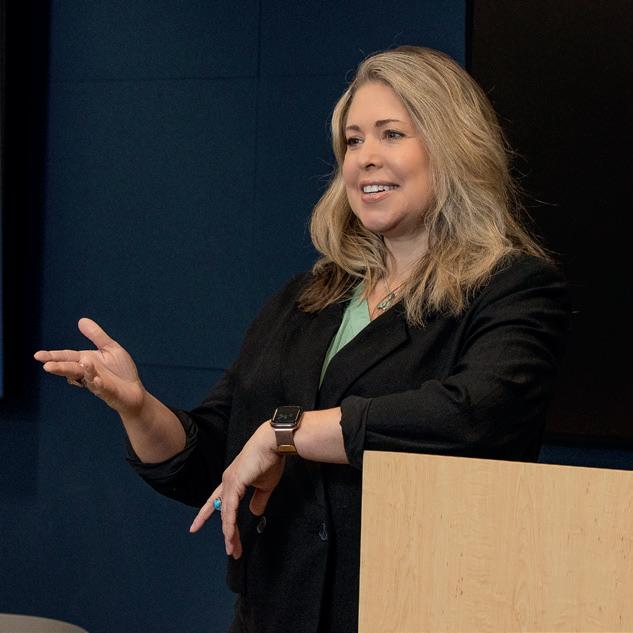

For tickets and more info, scan the QR code or go to bit.ly/BfG2024

For the second year, The University of Tulsa’s Collins College of Business has offered a real estate minor, which allows students from all disciplines to learn about this exciting industry.

“We try to give students a wide view of what’s out there, including things maybe in hospitality or real estate development, roles in the public sector, in residential or commercial real estate investment, or in corporate real estate,” said Meagan McCollum, an associate professor of finance and head of the real estate program at TU. “People typically think about buying and selling houses or apartments. But we also bring in the perspective of how companies select where to put their next location, how they select where to build the next Starbucks. There’s a lot of opportunities
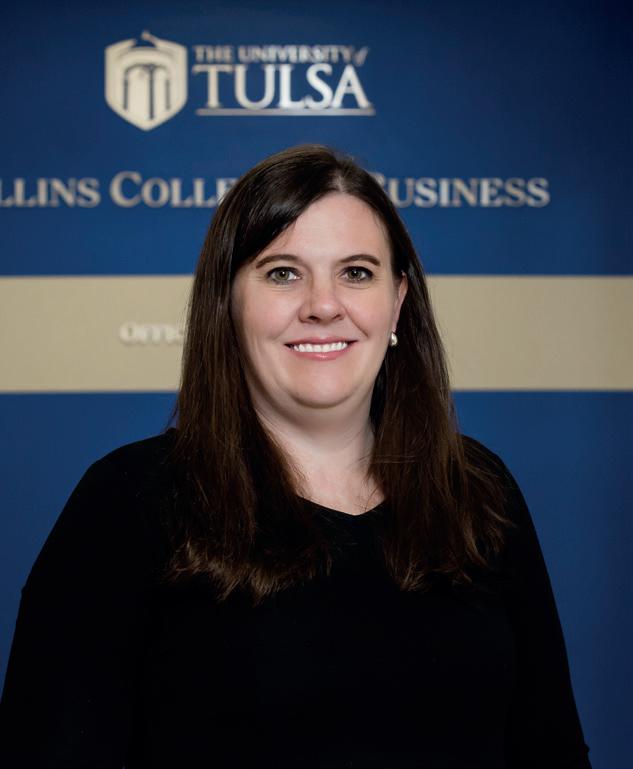
that may not be advertised as a real estate job, but adding the real estate minor will give you a set of skills that will make you a good fit for a variety of jobs or give you the tools you need to invest in real estate yourself.”
The pandemic changed the real estate market as some building owners are thinking about converting unused or underused buildings to other uses, like multifamily apartment units, McCollum said. “Whether they’re renovations of existing buildings or ways to construct new buildings that are going to make sense from an environmental perspective as well as a cost savings perspective, then that’s how a lot of this gets done,” she added.
Cat Thomason, a finance and economics senior, said she wanted to earn a real estate minor because it gives her more insight into the business world. “It also aids in broadening my career opportunities into fields like property management,” she added.
Thomason said a real estate minor is an easy addition to any degree in Collins College. “It complements finance quite nicely, and the professors have been nothing but supportive,” she said.
Exponential population growth and rapid industrialization are exerting immense stress on the planet’s environment. Associate Professor of Chemical Engineering Nagu Daraboina is a major figure in the global effort to develop methods for generating energy while avoiding air and water contamination.
“Sustainable development is the key to environmental protection and economic growth,” said Daraboina. “My investigations pivot on a holistic approach to dealing with carbon, water, and power. Through this work, I aspire to advance technologies that help to achieve the climate goals set by the United Nations.”
One of the major investigations of Daraboina Research Group in The University of Tulsa’s College of Engineering & Computer Science entails carbon dioxide capture using an environmentally benign clathrate hydrate process. The main focus is capturing CO2 produced by power plants by deploying ice-like crystals called gas hydrates. Daraboina, with the help of a chemical engineering doctoral student Raghav Dadhich and undergraduate Tristan Parrington, is striving to identify a suitable hydrate former, improve the efficiency of the carbon capture processes, and minimize the energy they require. In 2023, Daraboina was honored for his groundbreaking research in the field of gas hydrates with the Donald W. Davidson Award at the 10th International Conference on Gas Hydrates.
Another of Daraboina’s energysustainability projects examines the desalination of produced water. Each

Sustainable development is the key to environmental protection and economic growth.
NAGU DARABOINA
year, more than 24 billion barrels of water are produced by the petroleum industry in the United States. This produced water is the largest volume of unwanted byproduct associated with oil and gas extraction. The volume is about 70 times the volume of all the liquid hazardous wastes generated in the U.S. Oklahoma is the third largest water producing state, with an average 9 million barrels per day, which is mainly disposed of by injecting it back into the earth.
“Developing low-cost desalination technology for recycling and reusing produced water is an absolutely essential element of the sustainableenergy future,” remarked Daraboina. On this project, he is being assisted by chemical engineering doctoral student Dakkumalla Manas Rehan. Interdisciplinary research is also planned with Professor of Mechanical Engineering Ram S. Mohan
The two streams of inquiry – hydrate technology to capture CO2 from power plants and the desalination of produced water – come together in Daraboina’s research program. “We’re still at the concept stage,” he noted, “but my postdoctoral student, Ponnivalavan Babu, and I believe it’s possible to someday use hydrate technology to simultaneously capture CO2 and desalinate produced water. From an environmental perspective, combining two energyintensive processes into one would be highly attractive and beneficial.”
Adding propulsive energy to Daraboina’s research is a recently signed five-year Pacific Rim International Co-operation framework letter of intent with colleagues at the Korea Institute of Industrial Technology, National University of Singapore, Indian Institute of Technology Madras, and Chinese Academy of Sciences. Focused on practical research on gas hydrates and their many potential applications, members of the consortium plan to share technical information and specialists, including graduate student exchanges, as well as collaborate in seminars and symposia.

By 2025 up to 40% of the world will live in water-scarce regions. For University of Tulsa alumnus Kevin Patrick, water is not only a natural resource, but also his job.
Patrick (JD ’78) is the founder of WATERLAW-Patrick Miller Noto. “I know of only one other firm that does strictly water,” he said. “Usually, water is a division of a firm that does many other types of law. I wanted to create a boutique firm as a business model that focused only on water so that there was complete concentration on water.”
Patrick, who received his undergraduate degree from Virginia Tech before attending law school at TU, has been involved in many water-related cases in his 40 years of service – everything from the integration between groundwater and surface water to trying to maximize the utility of the resource.
“I’ve been involved in interstate cases that transfer water between states and across state lines as well as forming rights in states to resources they can reply upon. I’ve been involved in Tribal water resources claims across the West, and it’s fascinating to me how different states have different laws that relate to water,” he said.
Based in Aspen, Colorado, Patrick said the state is a leader in the field because the body of law goes back further than other states. “A lot of states look to Colorado when their laws are unclear or they have a question,” he added.
Patrick said The University of Tulsa was fundamental in his legal education. “TU focused on not just textbook law, but they taught physical science as well as the law,” he said. “That is so important if you’re in the natural resources law field, to grasp an understanding of how empirical sciences –math and science – relate to the law.”
Patrick continues to be involved with his alma mater. He promoted a mentoring program at TU Law with others, and, in fact, hired a mentee who recently became a partner at his firm.
“We look first and foremost to just a handful of schools for hiring at my firm – The University of Tulsa, the University of Colorado, Denver University, the University of Arizona and Arizona State University – because those focus on natural resources and the law.
“Water is kind of the ultimate example of a sustainable natural resource because pretty much more or less the same amount of water that exists today existed at the time of the dinosaurs. We have to take care of it and protect it.”
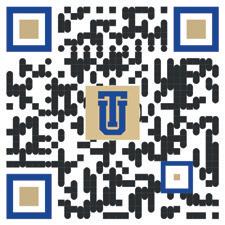

The University of Tulsa’s Sustainable Energy and Resources Law (SERL) program is designed for students who wish to specialize in energy, environmental, and natural resources law. Legal and policy choices have farreaching public health and economic consequences in today’s world. SERL promotes laws and policies that encourage energy diversification and reliability, sustainable supplies of natural resources, access to good quality water, and a healthy environment.
SERL’s director is Warigia M. Bowman , associate professor in TU’s College of Law and a widely published expert on public policy, infrastructure, water, and energy. Recently, her research has focused on groundwater depletion and energy grid fortification.
Bowman pointed to work being done by a 2021 TU Law alumnus who is serving with the Florida Public Service Commission and has argued before the Florida Supreme Court as well as a current student who interned at the Grand River Dam Authority as examples of how SERL prepares sharp legal minds for the real world.
The program combines student activities, two prominent legal journals, and access to scholarships from the Foundation for Natural Resources and Energy Law to offer an innovative and exciting legal education. It is affiliated with the Energy Bar Association and the American Bar Association Section on Energy and Environmental Resources.
University of Tulsa mechanical engineering alumnus Tim Latimer (BS ’12) was dealing with drilling equipment that kept breaking from the high temperatures deep underground.
“I had never even heard of ‘geothermal’ at that point,” Latimer says. “But it was where all the solutions for hightemperature drilling were, so I did more and more research.”
That research ultimately led him down an entrepreneurial path.
Generated from Earth’s internal heat, geothermal energy offers a renewable, carbon-free source of power – but it’s been expensive to access.
“I was right in the middle of the ‘shale revolution,’” Latimer says, with oil production skyrocketing from the use of horizontal drilling and hydraulic fracturing. “It just seemed to me very obvious that we could take some of these major technology breakthroughs from oil and gas and apply them to geothermal.”
We’re right at the cusp of a revolution, adding a huge new part of our energy mix from something that’s carbon-free and sustainable and works around the clock.
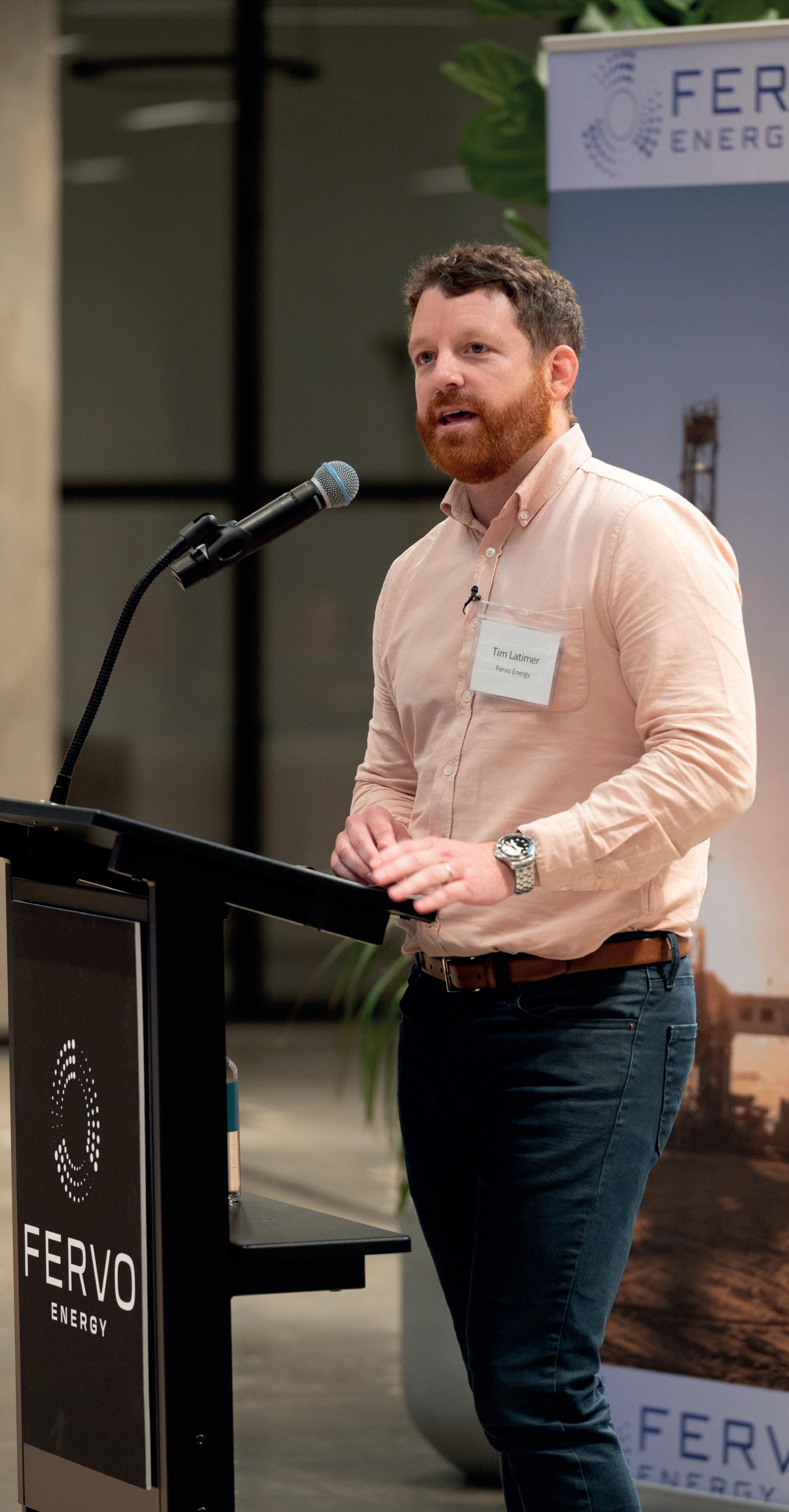
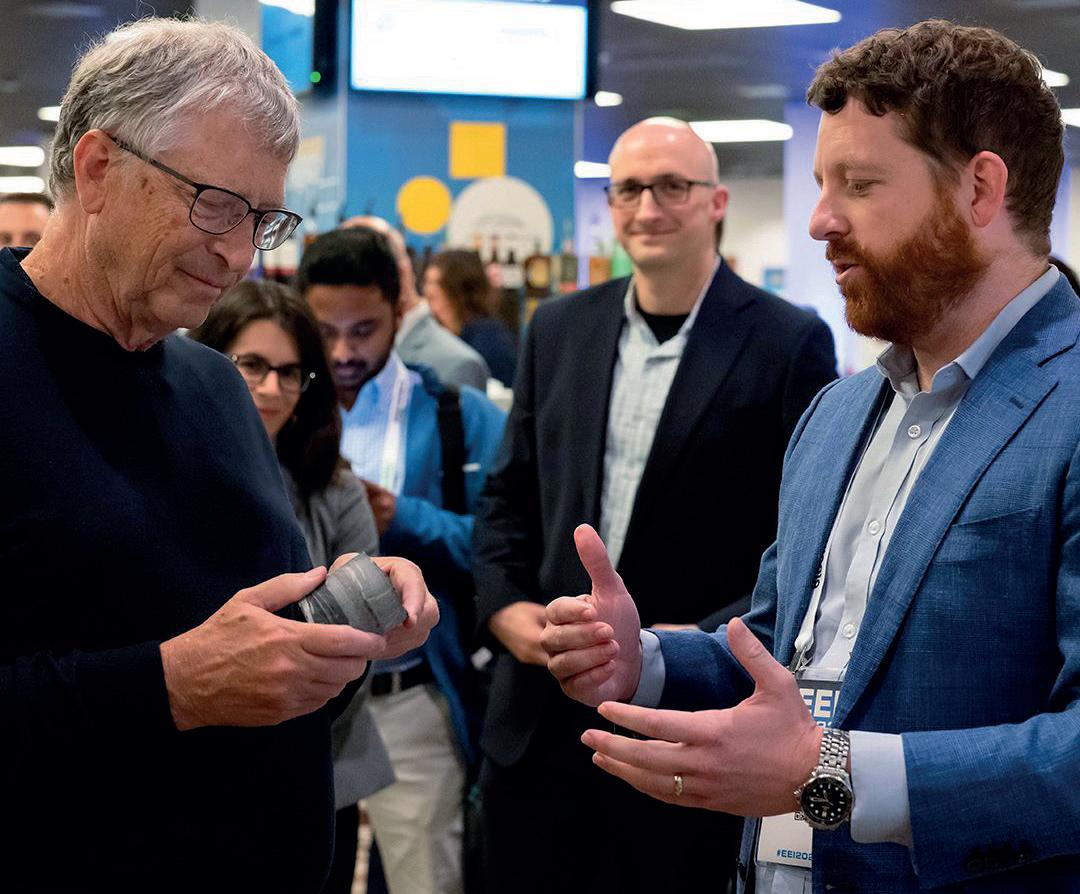
The geothermal industry didn’t seem to agree, but Latimer was determined to pursue the idea.
“It would give me a spot to work in ‘energy transition’ as we make more and more efforts to address climate change,” Latimer says.
In 2015, Latimer enrolled at Stanford University to seek an MBA and study in its geothermal research program. His graduate school application boldly proclaimed he was going to revolutionize the geothermal industry.
And he has.
Co-founded with a doctoral student from Stanford, Fervo Energy finished a pilot project last November in Nevada. And it recently broke ground on a 400-megawatt project in Utah.
Fervo’s horizontal drilling can generate geothermal energy almost anywhere. CEO Latimer believes it will one day generate up to 20% of the U.S. demand for electricity.
“We’re right at the cusp of a revolution,” he says, “adding a huge new part of our energy mix from something that’s carbon-
free and sustainable and works around the clock.”
After growing up in a Texas town with 900 people, Latimer wanted a college with a strong engineering program and a campus small enough for a tight-knit community. TU was “a perfect fit,” he says.
“One thing I really appreciated about TU was how hands-on it was,” Latimer says. “It wasn’t just like, ‘Let’s model these things on a computer and not get our hands dirty.’ We actually got to build things. … The curriculum showed you how to be resourceful.”
Latimer lives in Houston, where Fervo is headquartered. But he will return to Tulsa this April to be inducted into the TU College of Engineering and Computer Science Hall of Fame.
ECS Inaugural Dean Andreas
A. Polycarpou praised Latimer’s ingenuity. “It is alumni like Tim who make us proud.
His innovative ideas and entrepreneurship will likely have a profound impact on our society,” Polycarpou said.

Food services provider Sodexo cuts waste, offers
Creating and fostering the efficiency of campus operations is an important goal at The University of Tulsa and that is why TU, in partnership with its food services provider Sodexo, is proud to boast of recent efforts to bring sustainability to its dining services.
With a commitment to minimizing waste and providing healthier food selections, Sodexo has implemented several initiatives to ensure TU’s dining options offer the best for students while also benefiting the environment.
Currently, Sodexo’s focus is on waste management: filtering fryer oil, recycling carboard, tracking food waste, and using power-up and power-down grids and chemicals that reduce waste. Food is purchased locally to ensure freshness, and whatever is not eaten is donated to the Healing House for Recovery.
This spring, Sodexo plans to expand its commitment to sustainability by purchasing food containers that are more environmentally friendly and starting Weigh the Waste to track and share how much food is discarded. Additionally, the company hopes to broaden its support of local food vendors by supporting area farmers’ markets and introduce coffee grounds for gardens to be planted outside the new Starbucks in McFarlin Library.
“Tulsa Dining is committed to sustainability, and we plan on several projects going into the spring to build on our current efforts,” said Ed Daughtery, Sodexo’s executive campus/regional director of dining at The University of Tulsa. “We would like to partner with a student organization to help us with projects and give us their feedback. We are always open to ideas on how we can better contribute to our campus and environment.”

Chemistry professor finds ways to expand water testing as he moves into interdisciplinary fields
Fourteen years ago, walking along a riverbank in southeast Oklahoma, Professor Kenneth Roberts, chair of the Department of Chemistry & Biochemistry, noticed the shells of several dead mussels and how their annual growth layers formed a pattern similar to the rings on a tree trunk, and it gave him an idea.
As an analytical chemist, Roberts would often take samples of water to test for toxins and pollutants in rivers and streams across the state, but such tests provided only a snapshot of water quality, he said.
Mussels, however, spend most of their lives filtering water. “In doing so,” Roberts realized, “they are essentially sampling the water quality over a 100year period and storing a historic record of water quality in their shells.”
Roberts has pioneered the use of mussels to monitor toxic metal pollution in waterways across Oklahoma. Pollution or climate stress can be observed by studying the growth layers within a mussel’s shell, giving researchers a way to observe how water quality has changed over an extended period of time. “We have seen that mussels are great indicators of water quality and the overall health of an ecosystem,” Roberts said.
He originally used mussels to study heavy metal pollution from the Tar Creek Superfund site in northeast Oklahoma, where old mining operations left behind huge piles of waste that have contaminated the area with lead, zinc, and cadmium.
By 2017, however, Roberts’ research had inspired him to get involved with the Kiamichi River Legacy Alliance, a grassroots group fighting plans to supply Oklahoma City with drinking
water from southeastern Oklahoma. The plan would drain 83% of the Kiamichi River, devastating species and impacting tourism and other activities in the area, Roberts said.
His research with mussels has helped opponents argue their case in state and federal courts, where the battle continues. Threatening the Kiamichi “really got me sideways,” he says. “It is one of two
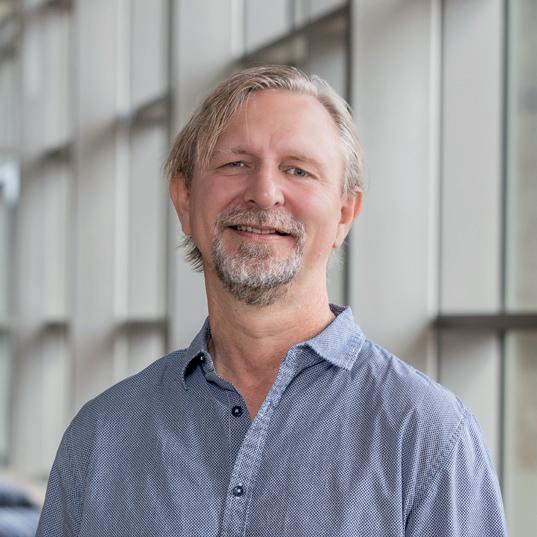

others concentrate on the water chemistry or the geology of the region, Roberts said. They look forward to taking field trips twice a year, during both the hottest and coldest weather.
“We know there’s a big pollution problem” in Oklahoma rivers, Roberts said. “That’s really not anything new.” Researchers have been talking about water pollution so long that state officials seem to have grown complacent, he said. But mussels have given him a more impactful way to describe the effects of heavy metals and other types of water pollution.
Toxic metals build up in the animals that eat the mussels. The same story is true for fish in the Kiamichi River ecosystem and the animals and people that eat them.
KENNETH ROBERTS
rivers in Oklahoma that are considered clean enough to provide ‘critical habitat’ for a mussel species, where it can only live in that river.”
Both graduate and undergraduate students participate in Roberts’ research, which is funded by the National Science Foundation, Environmental Protection Agency, American Geophysical Union, and other federal, state, and local agencies.
Some students focus on the biochemistry of pollutants accumulating in the mussels while
“There is a bigger concern because this isn’t just getting into the mussels,” he said. “Toxic metals build up in the animals that eat the mussels. The same story is true for fish in the Kiamichi River ecosystem and the animals and people that eat them.”
Roberts came to TU in 2002 with a background in chemical toxicology. The university has given him opportunities to conduct research in a much wider range of areas, including nanotechnology, bioweapon sensors, implantable glucose monitors, geoscience, cannabis, and interplanetary space travel.
Roberts has even helped develop a filter to block unwanted wavelengths of sunlight and improve the efficiency of solar panels, allowing photovoltaic cells to generate high electrical output without being exposed to damaging heat.
Thanks to TU, “I have thoroughly enjoyed learning about research in other disciplines.”
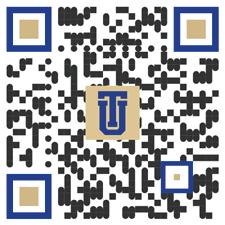

The University of Tulsa has many graduate-level programs to build upon your undergraduate degree or start charting a new path. If you want to take your career to the next level, check out these in-person and online programs, leverage the Golden Hurricane’s incredible alumni network, and put TU’s prestigious brand to work for you:
utulsa.edu
Master of Business Administration (MBA)
Full-time students
Part-time for working professionals
Master of Science in Business Analytics (MSBA)
Master of Accountancy (MAcc)
Master of Energy Business (MEB)
Master of Science in Sports Leadership (MS)
Master of Arts in Industrial-Organization Psychology (MA)
Master of Science in Cyber Security (MS)
Leadership track
Technical track
Master of Science in Nursing (MSN)
Leadership and innovation track
Education and elevation track
Public health global vision track
Informatics and analytics track
Juris Doctorate (in Law) Has your career stalled? Let TU’s Graduate School get you back on track.
Scholarships are available, and many programs – such as TU’s College of Law – offer spring, summer, and fall starts.
MAKE THIS YEAR ’24K GOLD!
utulsa.edu/graduate
Post-Master of Science in Nursing Certificate (PMC)
Doctor of Nursing Practice (DNP)
Adult-gerontology acute care nurse practitioner
Family nurse practitioner
Nurse anesthetist
Doctor of Nursing Practice
Specialist Certificate (DNPSC)
The University of Tulsa’s new dean of the historic Kendall College of Arts & Sciences, Blaine Greteman, is excited to hit the ground running when he begins his duties July 1. Previously a professor and chair of the Department of English at the University of Iowa, Greteman was selected following an extensive and competitive national search.
Greteman earned his doctorate in English literature from the University of California, Berkeley in 2008. A Rhodes Scholar, Greteman received his master’s in English literature from Oxford after
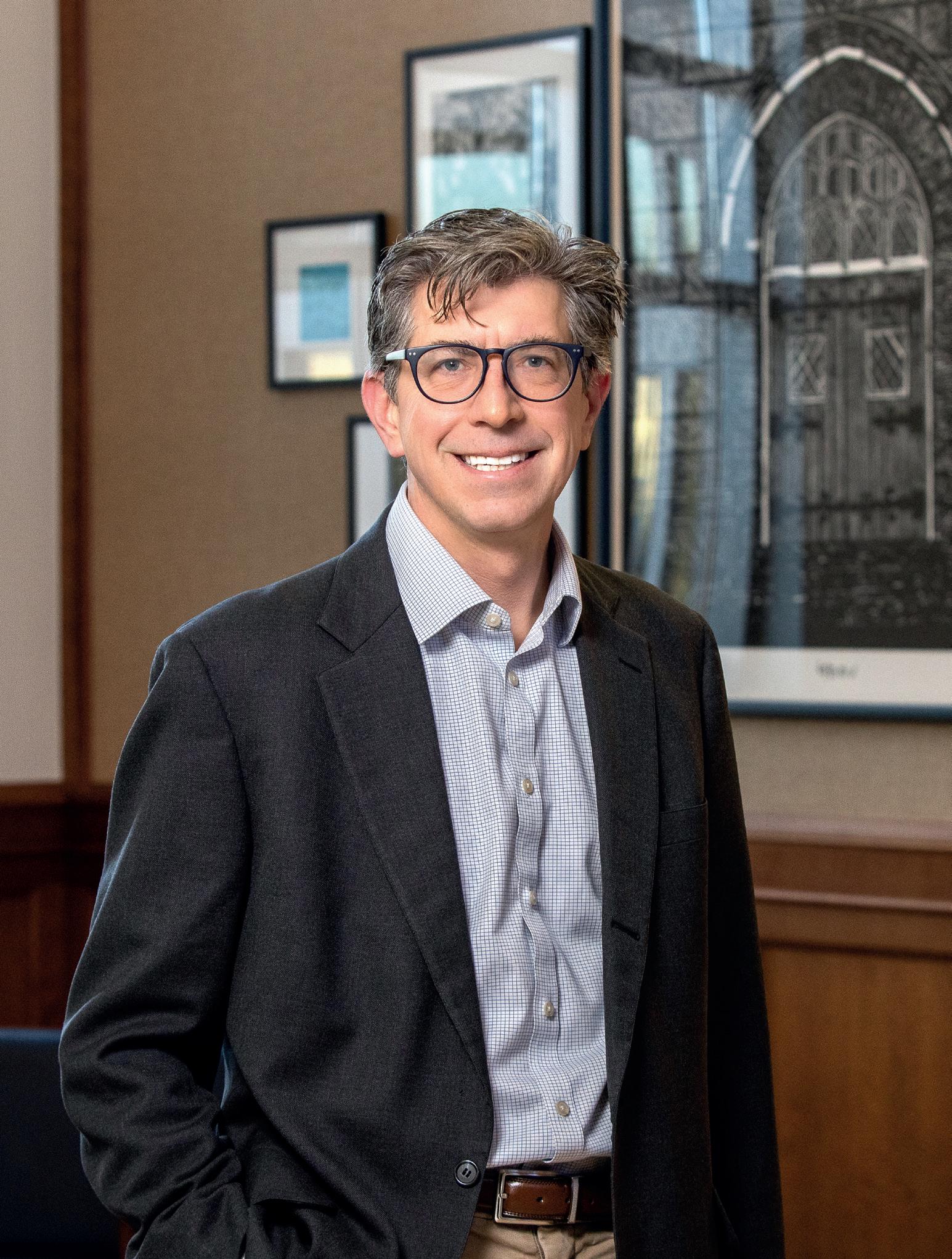
receiving his bachelor’s degree in English literature from Oklahoma State University in 1998. He was OSU’s first Rhodes Scholar.
“As a native Oklahoman, it’s long been important to me that we have a world-class university in Tulsa, and I feel privileged to be a part of it,” Greteman said. “I’ve spent my career advocating for the liberal arts and sciences, and The University of Tulsa has been proving its value for over 125 years, when it was first known as Kendall College.”
Greteman’s research focuses on
early modern book history, poetry, and drama, including Milton and Shakespeare. He has authored two books: “The Poetics and Politics of Youth in Milton’s England” and “Networking Print in Shakespeare’s England.” A former journalist for Time Magazine, Greteman has also written for popular publications such as Slate, Newsweek, and The London Review of Books. He is a staunch advocate for the liberal arts and has a keen interest in how artificial intelligence will affect universities of the future.

University of Tulsa biochemistry senior Campbell Eckhardt recently received a prestigious academic prize that comes with two years of study at the University of Oxford.
The Barry Scholarship, similar to the famed Rhodes Scholarship to Oxford, is given “in recognition of a student’s dedication to the academic vocation and the pursuit of truth.”
Unlike the Rhodes, however, the Barry Scholarship does not accept applications. Students must be nominated.
Eckhardt’s nomination letter came from TU’s Honors College Dean Jennifer Frey, who described him as “one of the most impressive students I have ever encountered in my career,” noting that Eckhardt was barely 17 when he arrived on campus.
“He puts in long hours tutoring at local at-risk schools, and he was instrumental in creating a biology help lab at TU and has served as its inaugural tutor,” Frey wrote. “Campbell is passionate about learning, but he tends to connect what he has learned to serving others.”
While he’s originally from Missouri,
Eckhardt’s family now lives in Texas. But he considers himself an Oklahoman. “I’ve lived in Tulsa now for three years,” he said. “It really does feel like home to me.”
Eckhardt began his research career at TU as a first-year student. He attributes his success to the supportive family atmosphere he’s experienced from the Office of Admission all the way to the Office of President Brad R. Carson. Eckhardt has served the university in leadership roles in the Honors College Student Advisory Board, Honors Student Association, New Student Orientation, and Fellowship of Aspiring Leaders, while also being involved with Early Careers in Medicine, Leadership TU, and student success initiatives. Last fall, he was recognized by the TU Alumni Association as a Jess Chouteau Outstanding Senior.
Eckhardt hopes to pursue a career in chemical biology, researching and developing novel drugs from biological sources. “I will eventually want to continue my research at a place where I can also influence the next generation of scientists, whether it’s in academia as a professor or in government advising policies.”
He is the first TU student to earn the Barry Scholarship.
“This recognition allows me to showcase the first-rate education and training I received at The University of Tulsa, hopefully opening the doorway for other TU students in the future,” said Eckhardt.
Barry Scholarship recipients are chosen by academic leaders at institutions in Britain and the United States. It is funded by John and Daria Barry Foundation and is an initiative of the Canterbury Institute, an Oxfordbased charity.
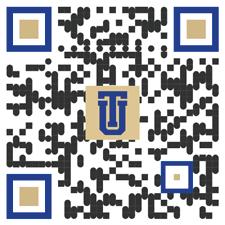
New health and natural sciences dean brings world of experience to TU
The University of Tulsa’s inaugural dean of the recently reorganized Oxley College of Health & Natural Sciences, Dr. Susan Pepin, is fresh off her first semester in the role, which she assumed Jan. 15. Pepin brings a wealth of experience and expertise from previously serving as managing director of health and clinical partnerships, senior adviser to the executive vice president, and clinical professor in the College of Health Solutions and Edson College of Nursing & Health Innovation at Arizona State University.
A highly accomplished scholar, educator, surgeon, and clinician, Pepin holds an M.D. degree from the University of California, San Francisco, and a master’s of public health from the Dartmouth Institute for Health Policy & Clinical Practice. She studied psychology, philosophy, and physiology as a Rhodes Scholar at Oxford after completing her bachelor’s degree in molecular biophysics and biochemistry at Yale University in 1987.
“I am honored and excited to join The University of Tulsa,” Pepin said. “I plan to foster interdisciplinary collaborations, robust engagement in meaningful research, and a student and faculty experience that is distinctive to TU and its impact on our communities.”
A tireless advocate for health equity and student success, Pepin served four years as president and CEO of the Virginia G. Piper Charitable Trust, where she managed a $550 million endowment and oversaw grants in health, arts and culture, and educational programs. She also is chief medical officer for Paxauris, a startup in hearing protection and wearable technology.
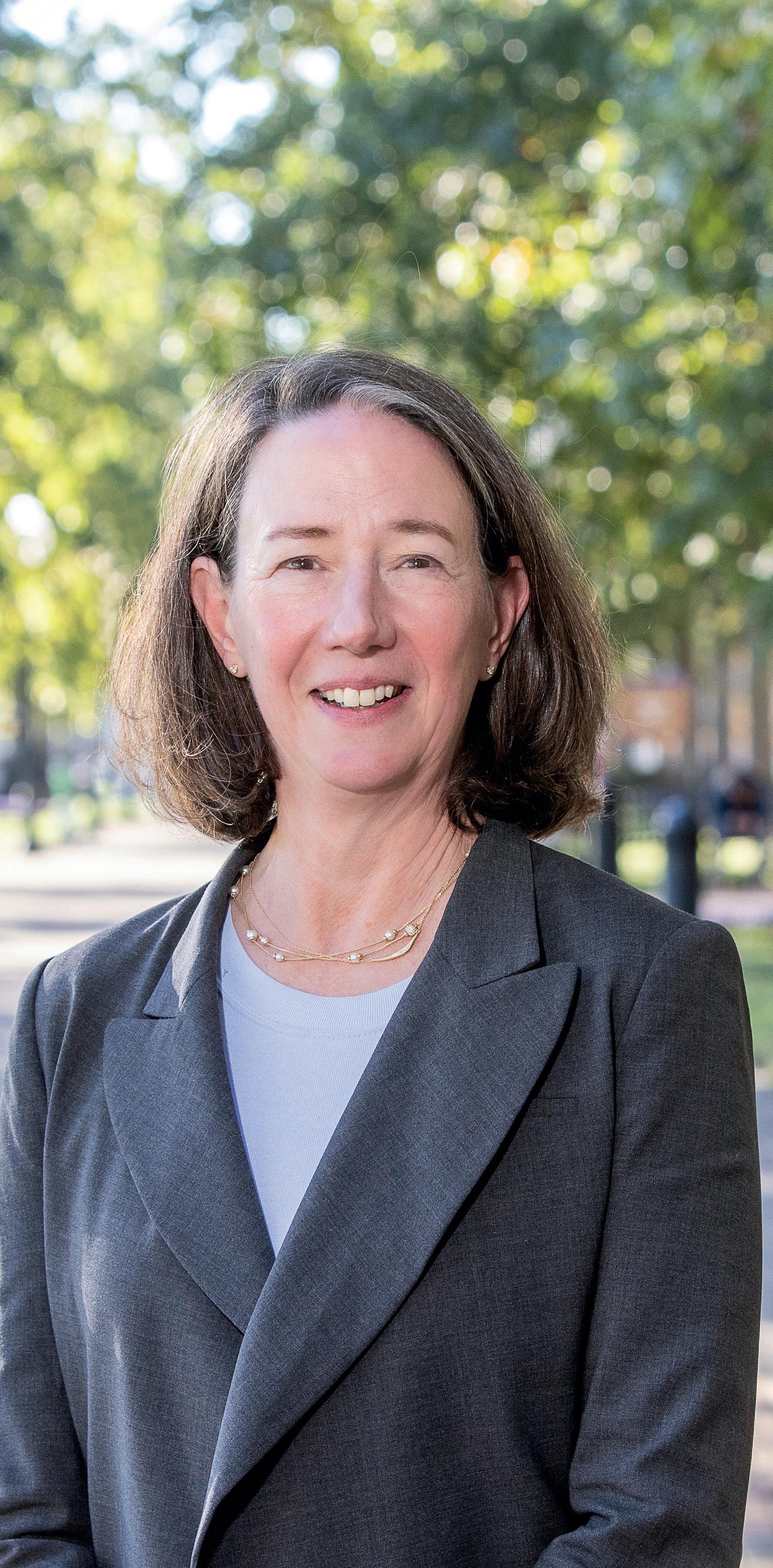
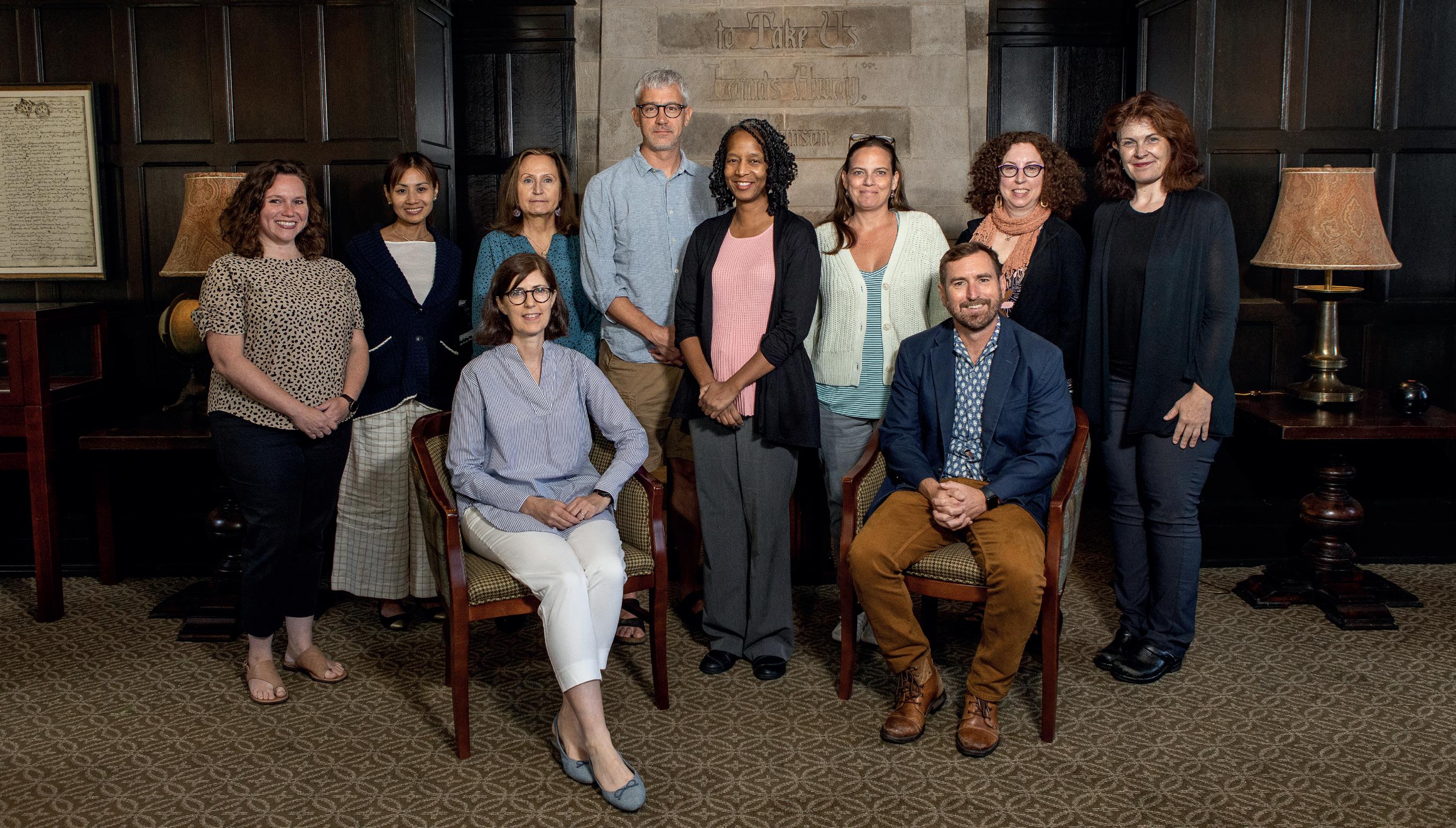
Last summer, The University of Tulsa launched a new initiative through the Henneke Center for Academic Fulfilment that promises to make TU an international leader in faculty development and scholarly achievement: The Second Book Institute. In many of humanities and social science disciplines, the publication of a second scholarly monograph is the central accomplishment that faculty at research universities must show to obtain promotion to full professor. Because they tend to be entirely new projects, not based on a dissertation, and because faculty write them at a mid-point in their career and lives, scholarship can fall to the wayside. With the support of President Brad Carson and Provost George Justice, we launched the SBI in the belief that more support for college and university educators as
scholars can yield significant benefits for our universities and for our fields.
The SBI gathered eight mid-career scholars from eight universities for one week, so that they could find time and space to focus on their book projects, make progress on their manuscripts, and develop strategies to continue writing when they returned to their busy lives. Selected by an external panel of judges for their scholarly excellence and for a record of giving time and energy to their institutions, families, and communities, the SBI Fellows received housing, most meals, and an honorarium for travel to Tulsa.
We met daily in McFarlin Library’s Faculty Study, a beautiful and comfortable setting usually reserved for TU faculty to work in silence. Every morning, the fellows gathered to write alongside each other, taking breaks
as needed, and wandering the library or campus if they found that walking helped them think and write.
The afternoons provided structured programming: Writing coach Joli Jensen, emerita professor of media studies at TU, led workshops, and the fellows met with Greg Britton, editorial director of Johns Hopkins University Press.
While writing time and workshops were essential, the true joy of the SBI was the community of scholars that formed during the week. Eight scholars grew into a cohort of mutual support that lasted long after their week on a campus and in a city they have grown to love. We look forward to welcoming the second class of fellows this summer, and we hope that the Second Book Institute will advance a larger conversation in higher education about programs for mid-career scholars.
Two years ago, The University of Tulsa’s School of Music and local retirement community Montereau entered a unique partnership. In exchange for organizing and performing concerts and conducting open practices throughout the academic year, two music students earn free room and board at the not-for-profit senior center.
The program was designed to foster intergenerational bonding and interaction and has been considered an unprecedented success by all involved. Now, others have taken notice of this unique learning opportunity.
Tulsa television stations began reporting the news last year. But when the New York Post ran an article in November about this year’s students, it caught the attention of producers at “The Drew Barrymore Show.”
The New York City-based team flew Chance Jackson and Shaun Roberts, both music education majors from Oklahoma, to the Big Apple to tape an interview with actor Drew Barrymore for her talk show. The episode aired on Feb. 7.
“The best part about the trip to New York was the NYC pizza and the recording session,” said Jackson. “And the Broadway show ‘Chicago,’” remarked Roberts. “I mean, talk about doubling chops in the saxophone section.” (Roberts plays sax, and Jackson plays trumpet.)
Being featured on national television is a once-ina-lifetime opportunity. The pair answered questions about living at the retirement center and whether they had received any dating advice from the seniors. Before leaving the studios, they managed to sneak in a selfie with Barrymore.
While the arrangement helps students to hone their craft, the experience offers them much more. “Besides growing as a musician and taking advantage of performance opportunities, I’ve become so much more comfortable spending time with older generations,” Jackson said. “This year at Montereau has benefited me by pushing me outside

Besides growing as a musician and taking advantage of performance opportunities, I’ve become so much more comfortable spending time with older generations.
CHANCE JACKSONof my comfort zone. It’s made me more social,” added Roberts.
Created by TU President Brad R. Carson and Montereau CEO Scott Nield, the unique partnership gives two carefully selected students a supportive environment to learn about history from those who have lived it. In the case of Jackson and Roberts, their next-door neighbor is in her 90s. Above all, the students are incredibly grateful. “I’d like to thank Montereau and the TU School of Music for facilitating this wonderful opportunity,” said Jackson. Roberts specifically called out Associate Professor of Music Judith Raiford for her support.
TU Vice Provost for Global Engagement Vivian Wang is passionate about expanding student opportunities. U.S. students have options for short-term immersive experiences, semester-long or year-long abroad programs, and even virtual exchanges. These alternatives encourage students to consider nontraditional destinations, broaden their perspectives, and stimulate their interests. In a significant step to provide financial support beyond TU study abroad scholarships, governmental grants such as the IIE Passport Grant and the German Academic Exchange Service (DAAD) have been secured. The university also works to strategically diversify its classrooms with academic achievers from various regions. TU’s Center for Global Engagement attracts international students through government grants, scholarships, and initiatives such as the Thomas Jefferson Program and Fulbright Fellowship.

Exchange Partner Universities: While enrolled at TU, students can spend a semester, year, or summer at the host institution, taking classes alongside local students in the local languageor English.
Direct Enroll Study Abroad Programs: TU selects specific universities for students based on academic offerings, location, and compatibility with TU’s curriculum.
Provider Programs: TU affiliates with program providers, offering academic programs for U.S. students worldwide that include collaborations with local institutions, homestay programs, and cultural excursions.
Travel Courses: TU offers J-term, spring, or fall courses that incorporate a group trip, allowing students to travel with faculty for one to three weeks to further explore their coursework
Current Partnerships/Activities: TU actively cultivates global partnerships, fostering opportunities for expanded global learning and advancing collaborative research and teaching initiatives.
Multi-Country Exchange Program Consortia Memberships: TU is a member of two multi-country program consortia, allowing students to enroll in any of the universities within a consortium. TU also hosts students from member institutions.

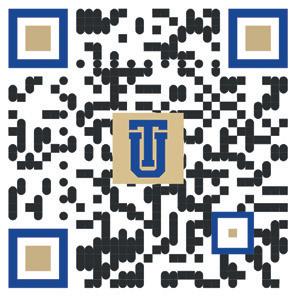
For the full list of partnerships, visit utulsa.edu/global
43

31
Current partnerships in 21 countries

City, university mark 15-year partnership at Gilcrease Museum

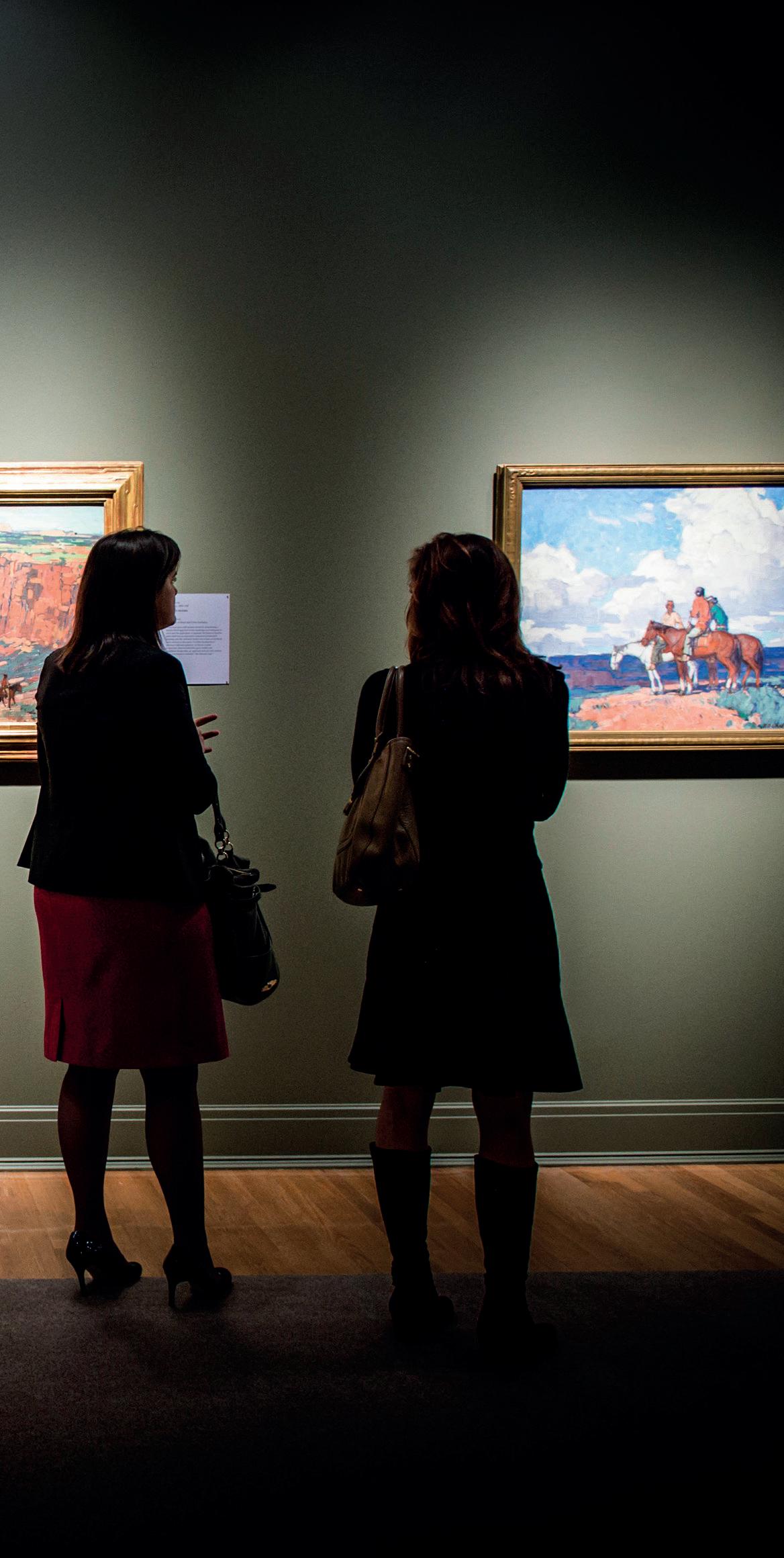
As is often the case with successful unions, when two parties look beyond their iron gates – whether literal or metaphorical – and embrace a shared vision, a remarkable transformation takes hold.
Fifteen years ago, the City of Tulsa reached an agreement with The University of Tulsa regarding the operation of the renowned Gilcrease Museum. Since then, the university has been a careful steward of the museum and its vast interdisciplinary collection of art, archeological items, and ethnographic and archival materials that tell the story of the Americas. The museum has returned the favor by allowing scholars to study and share findings from Gilcrease’s collection, which includes the world’s largest public holding of art of the American West, an unparalleled collection of Indigenous works from 12,000 BCE to the present, and more than 100,000 manuscripts, photographs, maps, rare books, and broadsides.
The evolution of the Gilcrease campus is remarkable. This fall will mark the 10th anniversary of the Helmerich Center for American Research, a state-of-the-art facility that houses Gilcrease’s archive and library and its paper conservation lab. Four years ago, a task force of

residents appointed by Tulsa Mayor G.T. Bynum determined Gilcrease needed a new facility to preserve its priceless collection. This decision enabled the museum to create improved visitor experience and modern exhibition spaces. The museum’s aging main building was demolished in early 2022 to make way for a new world-class structure scheduled to open in 2026.
“A lot of groundwork has been laid over the past 15 years,” said TU President Brad R. Carson. “The partnership with Gilcrease is stronger than ever, and we’re looking to build on it as we open an extraordinary, internationally recognized museum.
“With the opening of the new museum, we hope to realize the promise of the initial partnership which is to create synergies between the academic mission of the university and cultural mission of the museum.”
Carson thanked Bynum and the many donors who embraced the vision of a new Gilcrease for their unwavering support.
“The University of Tulsa has been a steadfast partner in managing the Gilcrease Museum and we appreciate
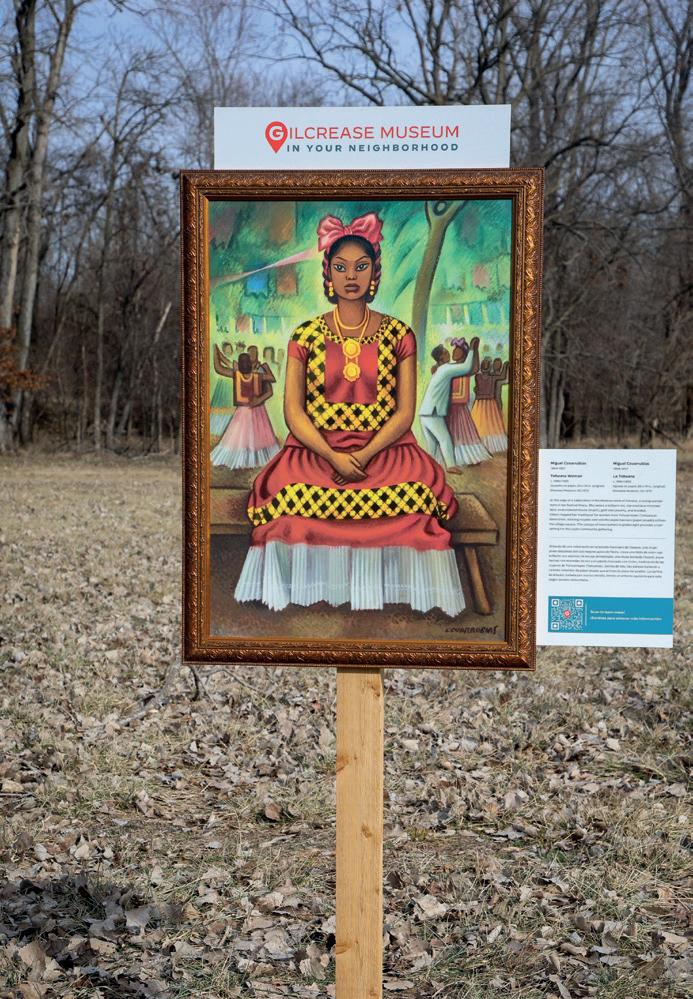
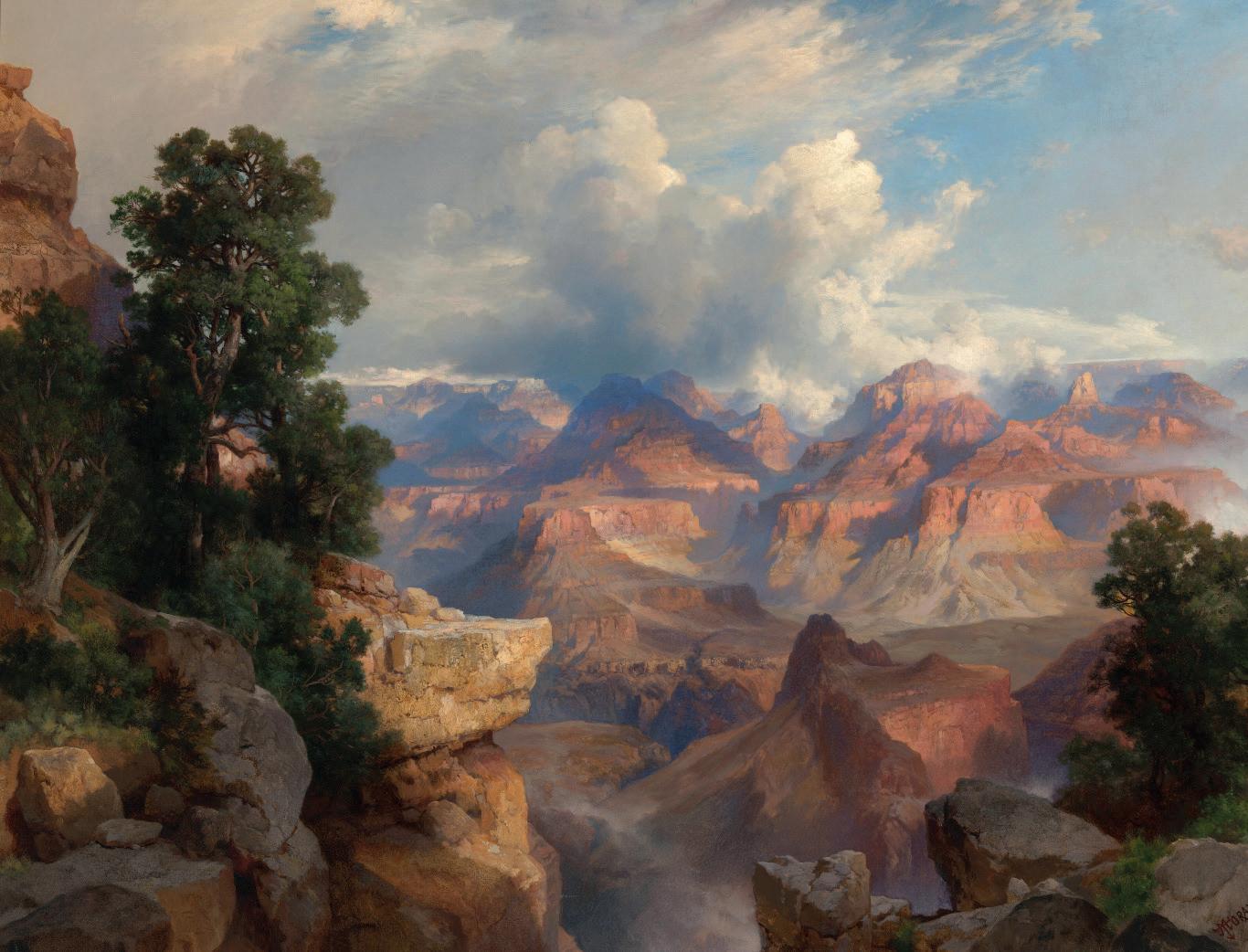
the care and vision TU has put forward in managing one of the world’s greatest collections of American art and history,” Bynum said. “Thanks to the citizens of Tulsa and our donors, we are building a museum facility worthy of that collection – a museum that has more space to showcase our world-class collection while also serving as the only facility in the state capable of housing
Gilcrease in Your Neighborhood has returned in 2024 with a new twist! This time, high-quality reproductions of Gilcrease artwork will be installed only in outdoor locations, bringing the beauty of creativity closer to nature. Five locations have been chosen for this next version of our public art experience: The Gathering Place, Oxley Nature Center, Keystone Ancient Forest, Turkey Mountain, and Ray Harral Nature Center. Family art activity guides along with public programs related to the featured artworks will be offered for people of all ages across the Tulsa metro area. Join us for Gilcrease in Your Neighborhood creative workshops, festivals, film screenings and more in 2024!
major traveling exhibitions. We are thankful for our continued partnership with The University of Tulsa and are ready for the next chapter in Gilcrease Museum’s notable story.”
Since the university began managing Gilcrease, knowledge about the museum’s archive and library has grown through research projects, grant initiatives, public symposia, publications, digitization efforts, and individual research fellowships.
“Recently, multi-year endeavors funded by major grants, such as the IMLS CARES Act Grant focused on the Eddie Faye Gates Tulsa Race Massacre Collection and the Henry Luce Foundation Indigenous Paintings and Moran Research and Digitization projects, have been particularly exciting,” said Helmerich Center Associate Director William Smith. “These efforts have supported research, cataloging, community engagement, and digitization, resulting in the addition of over 4,600 items to the museum’s online collections, spanning 150 years of American history. Likewise, the Helmerich Center’s robust research fellowship program attracts a diverse


The Gilcrease partnership is stronger than ever, and we’re looking to build on it as we open an extraordinary, internationally recognized museum.
PRESIDENTBRAD R. CARSON
array of national and international researchers, leading to new discoveries that enrich our understanding of the collections and the vast history of the Americas.”
The new Gilcrease Museum will take advantage of all the local landscape has to offer. Set in the Osage Hills just a five-minute drive from downtown Tulsa, the facility will blend breathtaking vistas and spectacular views of the outdoors with a distinctive indoor space. There will be plenty of room to showcase Gilcrease’s best-known artworks alongside new acquisitions and never-displayed items. Highlights
when the museum reopens in 2026 will include an amphitheater, a welcoming community space, a café with a view of the downtown skyline, and a plaza facing the city.
Like most Oklahomans, Carson has fond memories of Gilcrease. “I first visited when I was 15. I vividly remember ‘The Grand Canyon’ by Thomas Moran,” he said, noting the rich depth and mastery of the oil painting that remains one of his favorite works of art to this day. “I am excited to see this amazing collection reinterpreted for the 21st century in a museum space that is worthy of it.”

The University of Tulsa is grateful for these and other generous donors who have invested in Tulsa’s most valuable cultural asset, Gilcrease Museum.
• The Helmerich Trust
• A.R. and Marylouise Tandy Foundation
• William S. Smith Charitable Trust
• The Anne and Henry Zarrow Foundation
• Maxine and Jack Zarrow Family Foundation
• Mary K. Chapman Foundation
• George Kaiser Family Foundation
• Sherman E. Smith Family Charitable Foundation
• Ruth Nelson*
• Charles and Peggy Stephenson Family Foundation
• Randi S. Wightman
• Lynn Cyert and Paul Westbrook
• Sanford and Irene Burnstein Family Foundation
• Susan and Robert Jackson
• ONEOK
• Cheryl and Richard Groenendyke
• Devon Energy
• Coretz Family Foundation
• The Raymond and Bessie Kravis Foundation
• Paul and Paula Moore
• Nadel and Gussman Energy LLC
• ONE Gas Foundation
• Stuart Family Foundation
• The Mervin Bovaird Foundation
• Ann and Jack* Graves
• Hardesty Family Foundation
• David M. Leuschen
• Windgate Charitable Foundation
* deceased
Despite museum’s collection being in storage during construction, conservator finds much to do
Putting the Gilcrease Museum’s entire collection in temporary storage hasn’t given its conservators less to do. If anything, it has made Chief Conservator Jacinta Noble’s job even more challenging.
Threats in storage include pests, fluctuating temperatures, humidity, and even ordinary dust. “Monitoring these risks and staying vigilant about our response efforts is one of the most important parts of our work when caring for a collection,” Noble said.
“On top of this preventive work, we are assessing the checklist of items the curatorial team has carefully selected to exhibit in our new building. These assessments include determining whether conservation treatment is needed. If an issue is found, such as a tear in a print or a tarnished silver object, then it is the conservator’s role to propose a safe treatment,” she said. “This treatment process is always documented, both photographically and in written form, to track any changes made to an object.”
Noble joined the Gilcrease staff in December 2022, about a year and a half after the museum closed and its main building was demolished. A new, larger, and more interactive facility will open in 2026.

Noble previously worked in regional conservation centers in San Diego and Philadelphia, as well as at the Cleveland Museum of Art and the National Gallery of Art in Washington, D.C. She became familiar with Tulsa when visiting her husband’s family. “We were excited when this position opened at Gilcrease,” Noble says.
The only museum in Oklahoma with a conservation department, Gilcrease utilizes a lab at the Helmerich Center for American Research specially designed for the treatment and care of works on paper. A second lab in Gilcrease’s new building will be designed to treat threedimensional works.
In the meantime, Noble and her colleagues recently completed preparing items for “Past Forward: Native American Art from Gilcrease Museum,” a traveling exhibition from the Gilcrease collection that is running through early January 2025 at venues in North Carolina, New York, and Florida. The preparation work included cleaning, repairing, and stabilizing objects for display as well as preparing them to be safely transported.
“There is never a typical day in conservation,” Noble says. “But that’s part of the reason why I enjoy it so much. You’re always learning something new.”
Executive director brings extensive background in art, culture and stewardship
The new executive director of the Gilcrease Museum is no stranger to museum work. Returning to his hometown to lead the museum, Brian Lee Whisenhunt brings three decades of experience.
“I am thrilled to work with the Gilcrease team on completing the construction and reinstallation of the permanent collection and special exhibition. The opening of this amazing new museum facility will bring national notoriety and acclaim to one of the world’s most significant collections of American art,” said Whisenhunt.
Most recently, Whisenhunt served as executive director of The Rockwell Museum, an affiliate of the Smithsonian Institution, located in Corning, New York, for seven years. There, he built upon the museum’s stellar reputation as a leader in arts and museum education, grew the art collection by 25% with artists reflecting the diversity of the American experience, increased attendance, and oversaw plans for the museum’s 50th anniversary celebration and reaccreditation.
During his tenure with Rockwell, Whisenhunt served on the Board of Directors of the Museum Association of New York, including a term as president, and is a peer reviewer for the American Alliance of Museums Accreditation Commission. He was a member of the City of Corning Public Art Committee

and served as grant reviewer for the New York State Council on the Arts.
Whisenhunt received his master’s degree in art history from the University of Oklahoma and wrote his thesis on earthworks, large-scale sculpture in the landscape from the early 1970s. Whisenhunt also attended the prestigious Museum Leadership Institute and has a certificate in nonprofit executive leadership from the University of Texas of the Permian Basin.
His career began at the Wichita (Kansas) Art Museum before moving to the Blanton Museum of Art at the University of Texas at Austin and then the Swope Art Museum in Terre Haute, Indiana. Whisenhunt was
named executive director of the Museum of the Southwest in 2011, launching his career in museum management.
“The experiences I had at Gilcrease as a young person are key not just to who I am as a museum professional, but also as a person. For me, they inspired a life in museums.” he said. “I am ecstatic to return to my hometown as the next executive director of Gilcrease and lead the museum as it enters a new, expansive chapter of inspired service, meaningful collaboration and community engagement.”
Whisenhunt succeeds Susan Neal, who had served as executive director since September 2017.
As the Class of 2024 prepares to graduate in May, The University of Tulsa reflects on the resiliency of the students, faculty, and staff who weathered the COVID-19 storm. Please join us in celebrating the successes of the university and the achievements of the soon-to-be alumni who entered campus in the fall of 2020 and persevered in the face of a historic pandemic.


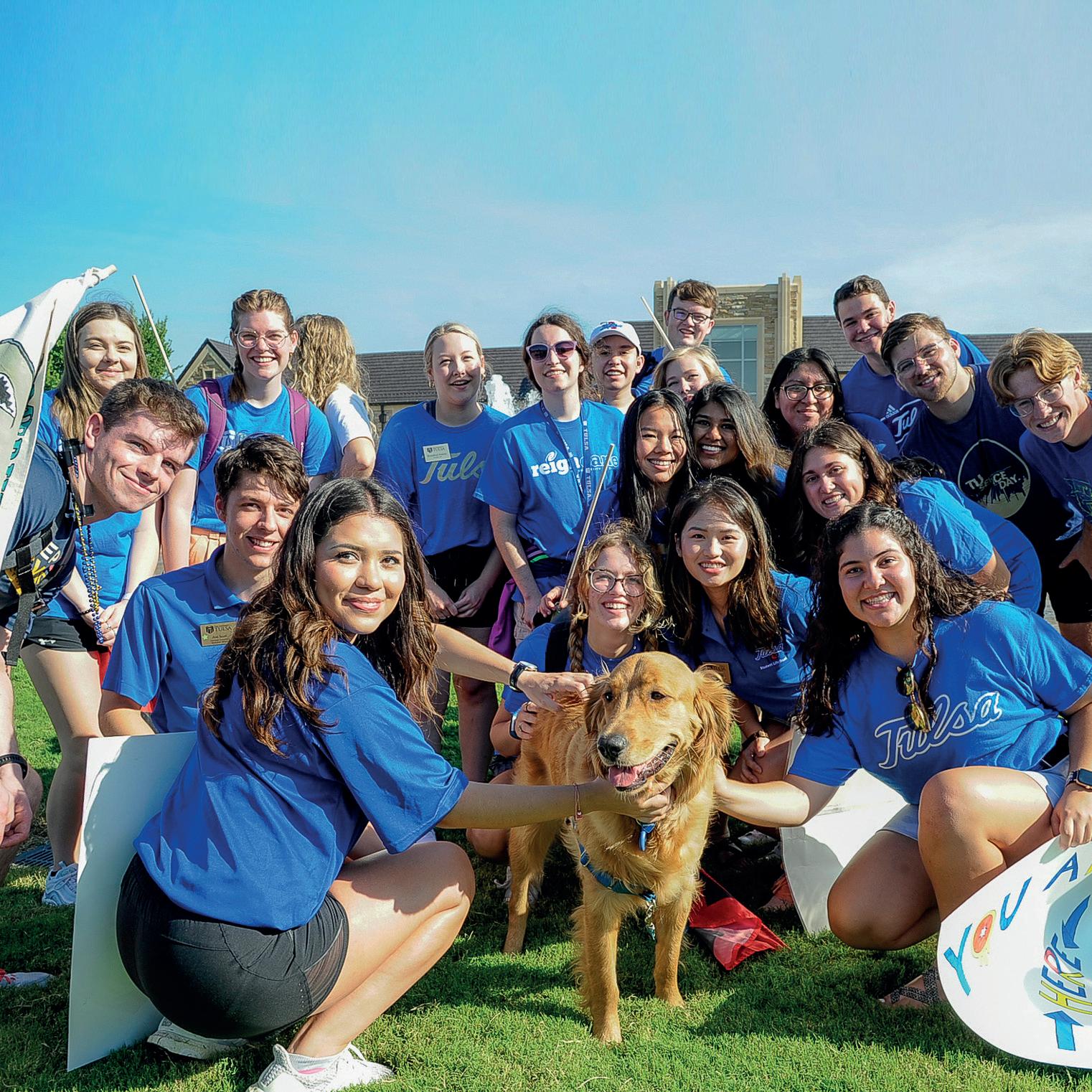
Student body president connected well at TU despite starting during pandemic
Looking back to her final months of high school, TU Student Government Association President Jennifer Fierro remembers feeling excited at the prospect of graduating and continuing her education in college. “I was so excited and so looking forward to it,” Fierro recalls. “I was graduating, and it was going to be a huge moment for me.”
But that was March 2020, and as the world learned, the COVID-19 pandemic upended everything. Fierro completed her senior year online and her graduation was held virtually. When she arrived at TU in the fall, all classes were being conducted online; social activities and recreation were prohibited.
“It was a big moment of uncertainty. The reason you go to college is to meet more people and get engaged on campus. Having
classes online was definitely hard,” she said. That did not stop Fierro or her classmates from finding ways to safely connect. From group chats and online meetings to Facetime and Zoom sessions, Fierro was able to build a network of friends and peers who supported one another inside and outside the classroom. She credits this support as helping her even now as student body president. “I’ve grown as a leader. It’s changed me entirely,” she said.
Reflecting four years later, Fierro offers advice to undergrads: “Don’t take anything for granted. As students, we’re always complaining about having classes or homework or other small things. It can be stressful, but being away from school and craving that in-person interaction, made it a special moment to come back to.”
Jennifer Airey, Graduate School dean who served as Faculty Senate president during the pandemic:
“I had never even heard of Zoom when we suddenly had to pivot to online learning in March 2020. The university worked overtime to upgrade and install new campus technology. Faculty worked overtime to reformat material. We all had to get used to new lightning techniques and new camera angles – and to shouting, ‘You’re muted!’ at one another. My colleagues in the sciences had a particularly difficult time, as hands-on labs were impossible; often, professors would perform the labs themselves while students watched online, and then used the professor’s data for their reports. It was surprising how quickly we all acclimated. We were all masked in person, and I was frequently surprised when I saw a student’s full face for the first time. Often, they didn’t look like I’d imagined! We learned a lot from being online, and I was consistently impressed by the flexibility and ingenuity of faculty and students alike, but I don’t miss it.”


Matt Warren, vice president and chief compliance officer (BA ‘06, MA ‘09):
“I attribute TU’s success surviving the pandemic to our singular focus on keeping students and employees safe. Our mission is to educate, and a TU education connects students with excellent faculty in smaller classroom settings with comprehensive support. These hallmarks are best suited to an in-person living and learning environment. TU invested significant resources to retrofit our physical spaces in accordance with guidance from medical and health professionals related to air quality, cleanliness, and physical distancing. We implemented COVID-19 testing requirements, monitored COVID-19 cases, managed our own contact tracing procedures, and – once they were available – administered vaccines on campus. Everyone at TU contributed to this monumental effort with grace and patience. Our students rose to the challenge of attending college during a global pandemic with great maturity, determination, and resilience.”
Marcia MacLeod (BS ‘75, JD ‘80), chair of the TU Board of Trustees:
“As COVID emerged in early 2020, it thrust us all into uncharted territory. None of us could have predicted the social and economic implications of a worldwide pandemic. We just knew we must act as quickly and diligently. The faculty, administration, and board united in a common cause: How can we best support our students through the yet unknown challenges of surviving and thriving through this pandemic? Trustees are charged with establishing the strategic direction and mission of the university. Yet in this critical period, we partnered with the administration to address policy issues – such as the ever-changing health protocols – and to muster financial resources for necessities – such as the technology to become a virtual campus. Most importantly, the board continually reinforced the importance of the overall well-being of the students when any decision was made. While the board remains alert to possible long-term social, emotional, and educational impact to our students, we are proud of the amazing resilience evidenced by the entire university community.”

TU is scoring with an incoming football class that’s already drawing attention
Is the college football world taking notice of what’s happening in Green Country with The University of Tulsa’s emergence in recruiting? It appears so.
If you skim The Dallas Morning News’ list of top 100 football recruits in the Class of 2024, all sorts of top programs are represented. Texas, LSU, Oklahoma and SMU are among those to recruit athletes out of the Dallas area this cycle.
But the school that pops up more than any other is Tulsa, with a year-high 10 recruits committed from the top 100, 11 from the Dallas area and 15 from Texas.
Tulsa finished just 4-8 overall last season and 12th in the American Athletic Conference. Nevertheless, it had its best recruiting year in the Dallas area in the last decade, if not ever. Tulsa hadn’t landed more than five area commitments in the last 10 years before the 10 is secured this year.
Lisa Assimakopoulos

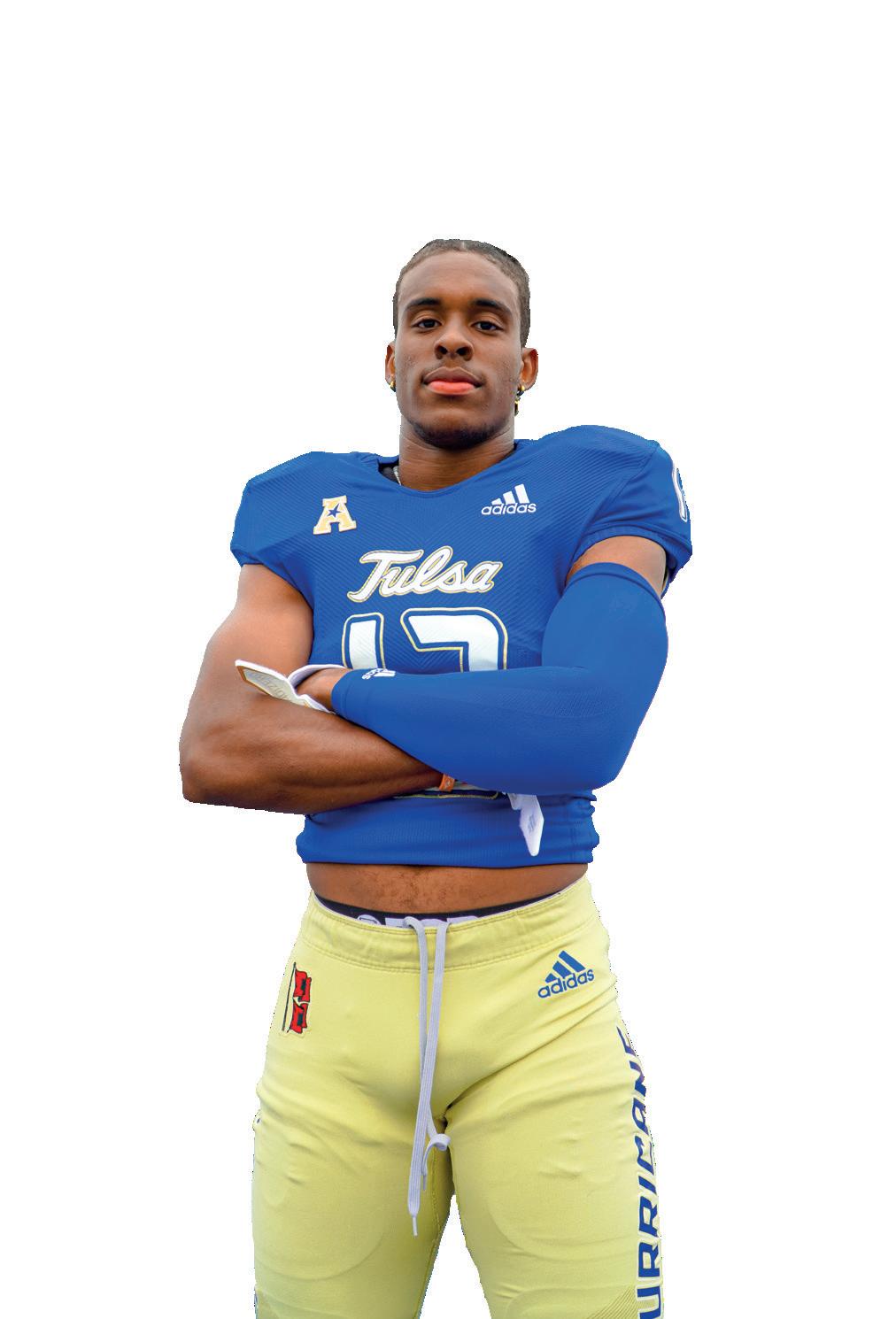
signing day haul of 28. Unlike the previous year, when Kevin Wilson had only 15 days between being named head coach and signing day, an entire year of recruiting with a full coaching staff has paid dividends for the Golden Hurricane.
Tulsa added to its class at midsemester with seven transfers, and in February, three high school seniors inked national letters of-intent, giving Tulsa a total of 38 scholarship newcomers for 2024.
“It’s a large class,” said Wilson, who previously worked at Ohio State University, Indiana University, and the University of Oklahoma. “We still have some recruiting to do. Overall, I thought we did pretty well, at least on paper. I do think we did well from a high school perspective. With college coaches recruiting from the transfer portal, there’s more high school guys available, which I think has driven up our opportunity to start at a higher level. I’m looking at kids that, when I was at Oklahoma, would get some Big 12 offers, but this year maybe didn’t get those offers because of more portal guys.”

Wilson credits Tulsa’s recruiting success to doing it “the old-fashioned way.” The class includes 27 high schoolers, nine transfer portal players, and two junior college studentathletes, while 19 are on the defensive side of the ball, 18 are on offense and one special teamer.
Among the prep signees, 17 come from Texas and seven from Oklahoma, while Tulsa also plucked one from Arkansas, Indiana, and Ohio. The portal was kind to the Hurricane with players filling key positions in the fall, transferring from Angelo State, Indiana, Purdue, New Mexico State, Southern Cal, TCU, Arkansas State, and Western Kentucky.
“Our coaches did a heck of a job in building relationships and weathered some NIL challenges,” Wilson said. “This is, hands down, the No. 1 class in the nation, non-NIL.
“There was not a penny spent on this class. In this day and age, this is old-fashioned recruiting – build relationships, get to know guys, and share with them the educational opportunity here at Tulsa and the value of the city.”
There was not a penny spent on this class. In this day and age, this is old fashioned reruiting – build relationships, get to know guys and share with them the educational opportunity here at Tulsa and the value of the city.
VIN WILSON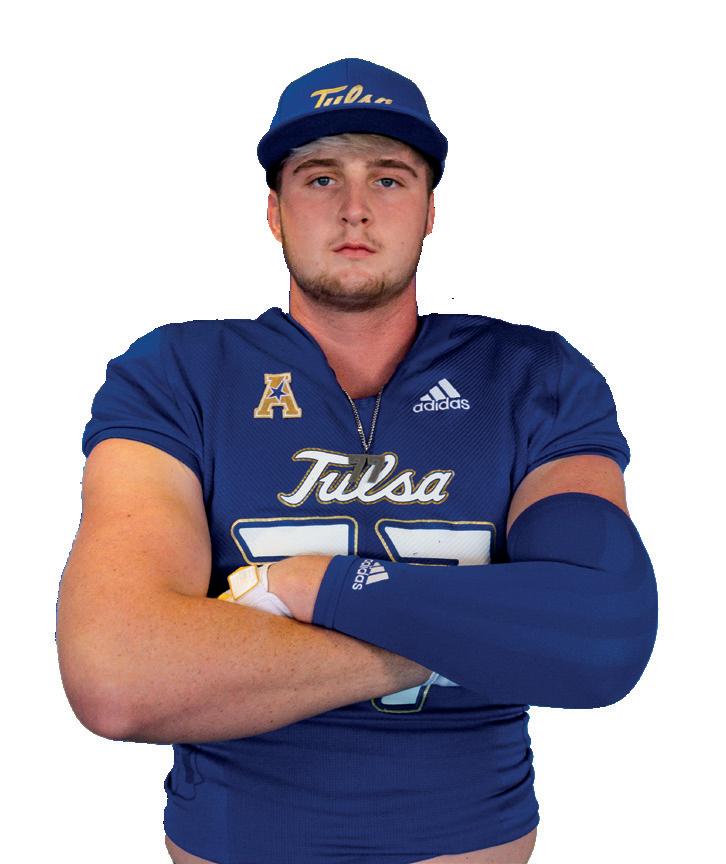

On offense, the Hurricane added seven receivers, six linemen, two running backs, two tight ends, and one quarterback. Defensively, there were some urgent needs that TU faced due to graduation and losses through the transfer portal. Tulsa added five linemen, five safeties, four linebackers, three players for the JACK position (edge/outside linebacker type), and two cornerbacks.
A total of 10 prep signees and 10 transfers came at mid-semester and participated in spring drills.
As The Dallas Morning News took notice of Tulsa’s recruiting success, so too will college football fans as the quality of this and future classes become more evident on the football field.




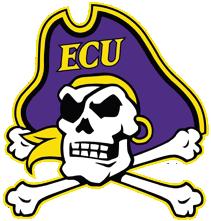
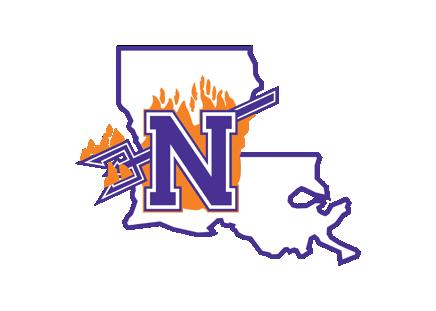
tulsahurricane.com/tickets



When examining her many college options as a prized volleyball recruit, Kayley Cassaday (BS ’23) received an unexpected phone call that took The University of Tulsa to the top of her list.
That call was from a TU professor who detailed the university’s engineering programs for Cassaday, appealing to her pursuit of a prestigious degree that would propel her to lifelong success after her
playing days. “My parents said, ‘No other schools do that. This is something that’s so unique,’” Cassaday said. “I was already saying I liked the school.
I liked the size. I liked the volleyball program and the (American Athletic) Conference. So I was like, ‘Why not try it?’”
Fast forward six years, and Cassaday has thrived at TU. She is wrapping up her master’s degree in mechanical engineering after concluding a stellar volleyball career last season as an honorable mention All-American and a two-time academic AllAmerican.
While her volleyball highlights as one of the top outside hitters in school history are too numerous to mention, Cassaday’s work in the classroom was equally noticed. For a capstone mechanical engineering course, she was part of a team of seniors who researched a project for NASA and
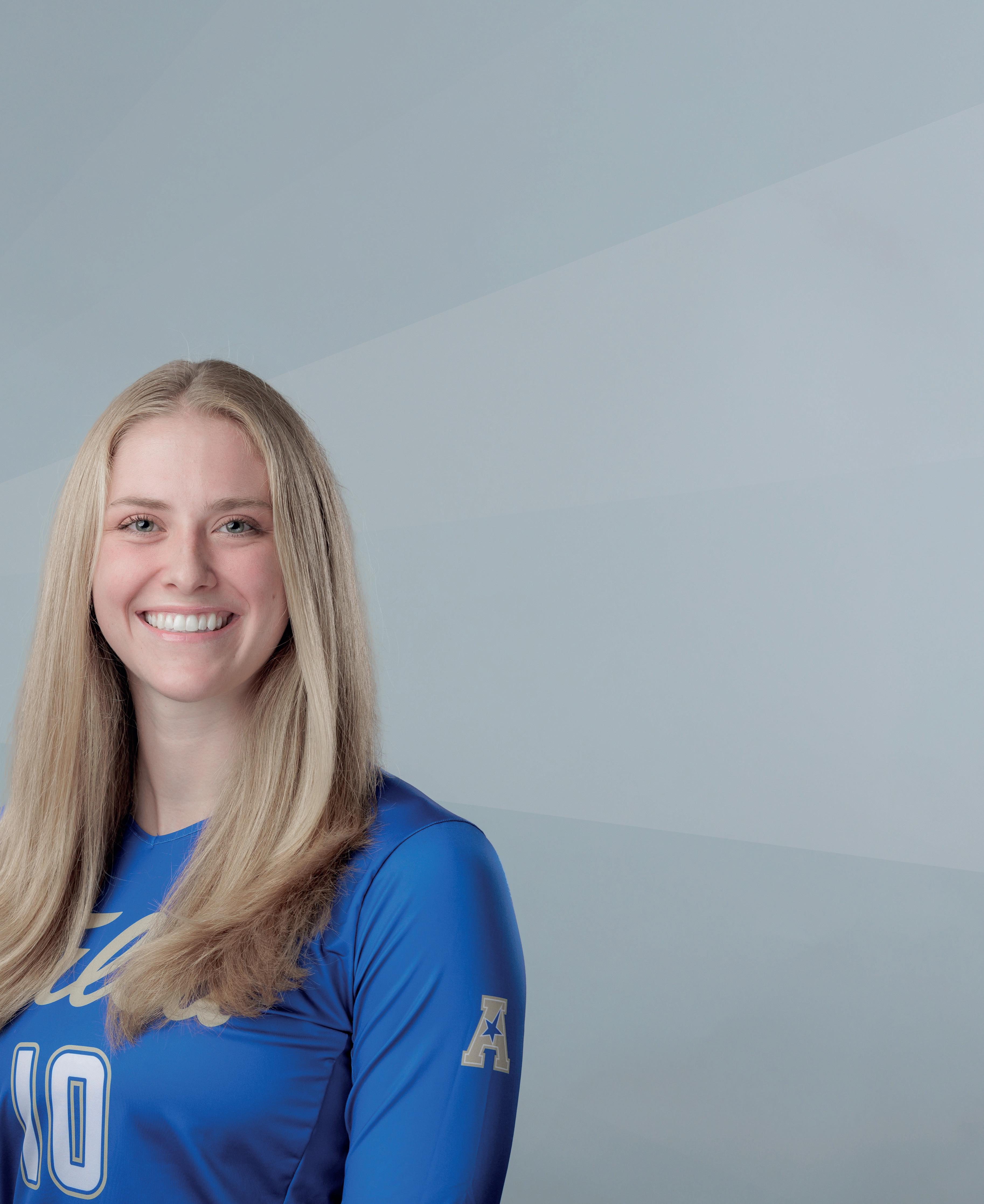
ultimately were invited to Johnson Space Center in Houston last summer to present the findings.
“We brought our magnetic attachment tool — that’s what our project was — and they tested it, and a real astronaut tested it underwater to simulate the moon gravity,” she said. “It was so cool.”
A native of Overland Park, Kansas, who plans to play professional volleyball overseas after she graduates in May before beginning her engineering career, Cassaday has relished her time at TU.
“I just really appreciate everything the school has done for me — my coaches, my professors, the athletics administration, my teammates, my peers, everyone,” she said. “It’s just been so amazing, and I wouldn’t change anything. I would come back here in a heartbeat.”
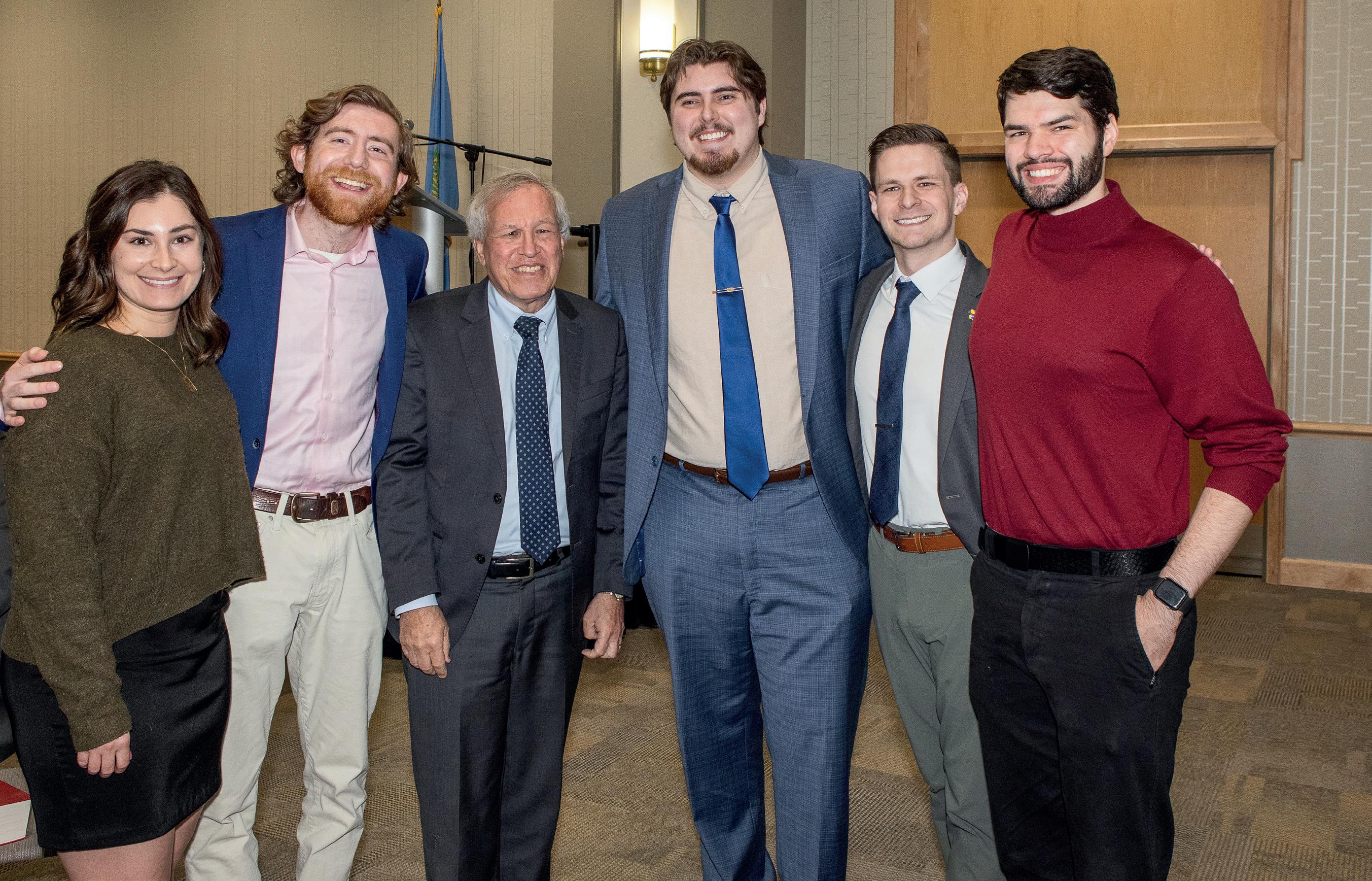
The University of Tulsa’s College of Law hosted many exciting and engaging programs this spring, featuring accomplished alumni, renowned scholars, and historic figures in the legal field.

TU Law hosted a celebration reception for Judge Sara Hill (JD ’03), who recently became the first Native American woman and Tribal citizen to serve on the United States District Court for the Northern District of Oklahoma. In addition to Hill, speakers included Stacy Leeds (JD ’97) dean and Regents Professor of Law at the Sandra Day O’Connor College of Law at Arizona State University; Chuck Hoskin Jr., principal chief of the Cherokee Nation; U.S. District Judge Gregory Kent Frizzell (BA ’81); and Oren R. Griffin, dean of TU’s College of Law. Other attendees included Tribal leaders, judges, alumni, and representatives from the offices of U.S. Sens. James Lankford and Markwayne Mullin.
Erwin Chemerinsky, the Jesse H. Choper Distinguished Professor of Law at Berkeley Law and dean of the University of California Berkeley School of Law, was the guest speaker for the annual John W. Hager Distinguished Lecture in Law. With a career spanning over four decades, Chemerinsky is considered a national expert on the Supreme Court and constitutional law. In addition to the lecture, he graciously agreed to attend classes and answer students’ questions. Chemerinsky has published more than 16 books, including his latest, “Worse than Nothing: The Dangerous Fallacy of Originalism.”
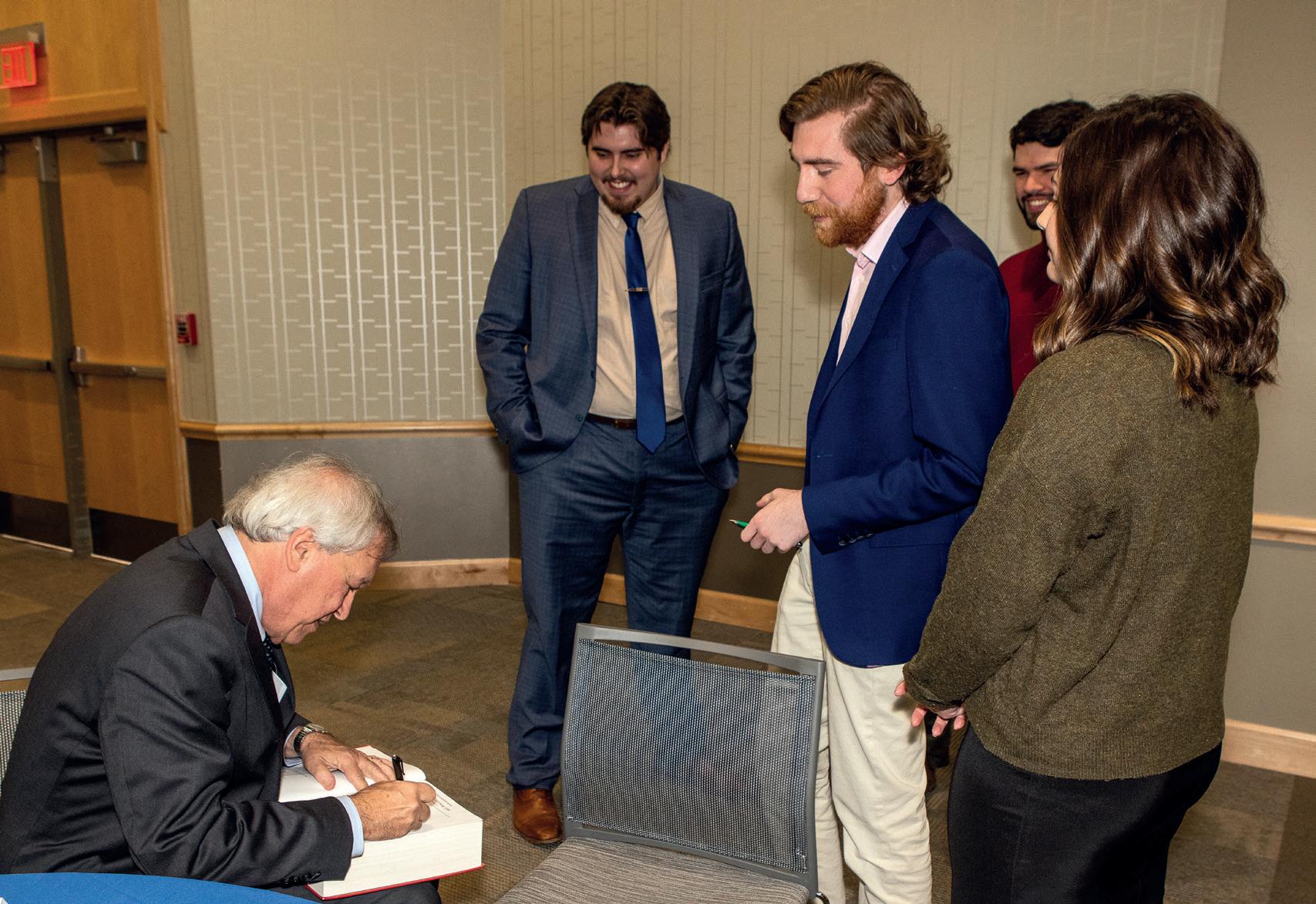
The 2024 TU College of Law Justice & Dreams Gala honored three individuals who have shaped Oklahoma’s cultural, social, and economic landscape: Bill Anoatubby, Wendy Drummond, and Buck Colbert (B.C.) Franklin (posthumously).
• Anoatubby has served as governor of the Chickasaw Nation since 1987. His previous positions include director of Tribal health services, director of finance, special assistant to the governor, controller, and lieutenant governor. The Chickasaw Nation operates more than 100 diversified businesses and invests much of its revenue into more than 200 programs and services that provide education, health care, housing, and more.
• Drummond (JD ’07) is an employment and entertainment attorney who serves as chair of the board of directors of Premier Wireless, UScellular’s largest national agent. Before that, she served as Premier’s CEO. Drummond serves on the board of directors for both the national Alzheimer’s
Association and Farnsworth Art Museum and has long been a board member for Emergency Infant Services and Lindsey House.
• Franklin moved to Tulsa on Feb. 20, 1921, and established a practice in Greenwood with P.A. Chapelle and I.H. Spears. On May 31,1921, he witnessed the atrocities of the Tulsa Race Massacre. In the aftermath, he and his partners processed the insurance claims of Greenwood’s homeowners and business owners. Franklin argued before the State Supreme Court and was admitted to practice before the U.S. Supreme Court.
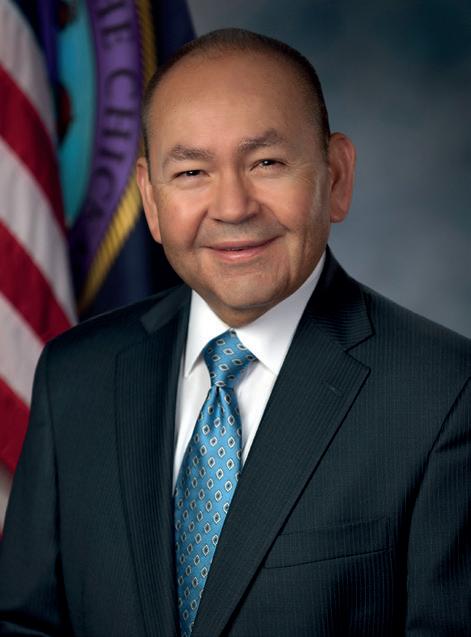
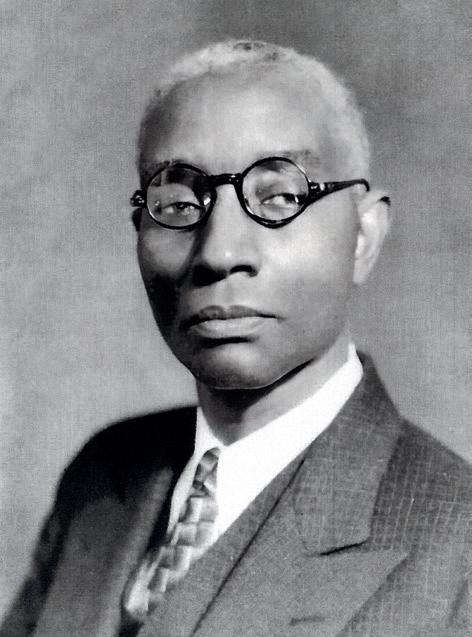
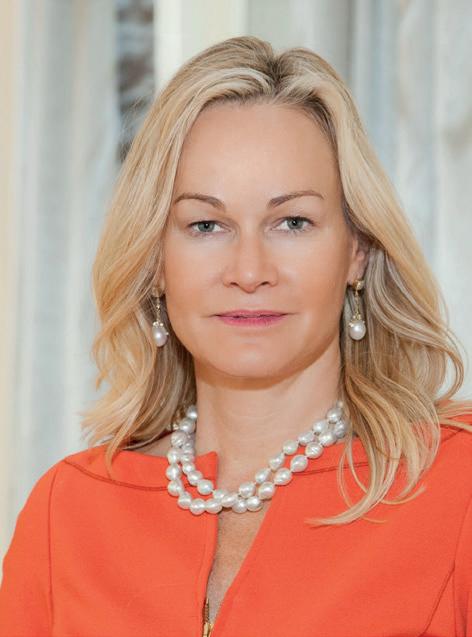
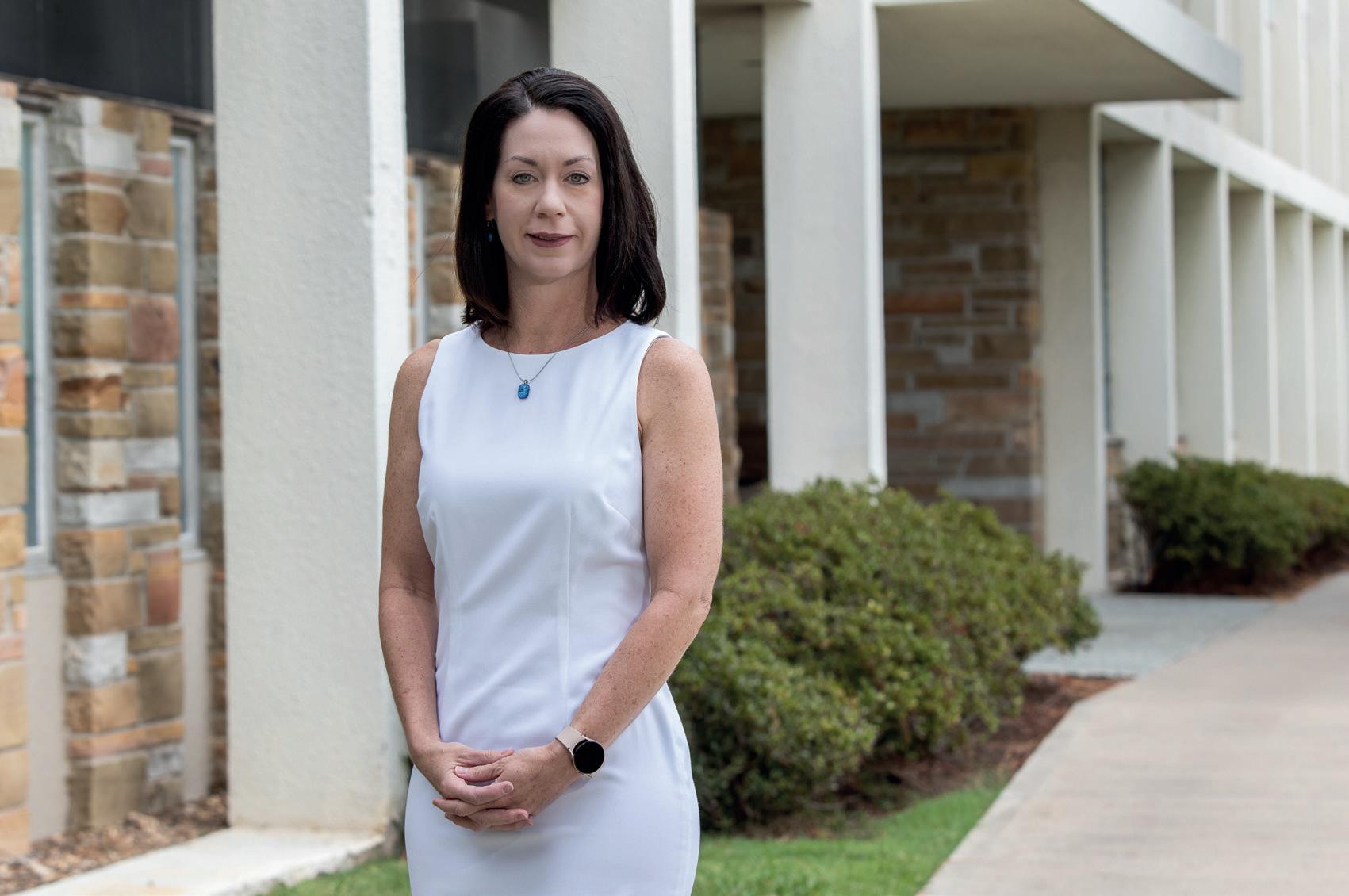
Carrie Hall has a deep love for Tulsa. From her days attending The University of Tulsa to encouraging TU to apply for more grants, she believes in the university and the city.
Hall graduated from TU with bachelor’s degrees in biology and chemistry in 2006. She went on to earn her master’s degree at TU in 2008 in biochemistry and her doctorate from Idaho State University in 2011. Now, she’s enjoying her dream job at the National Science Foundation, where she’s the program director for the Division of Equity in Excellence in STEM within the Directorate for STEM Education.
“I am the person who says yes or no when people apply for grant funds,” she said. “My division focuses on innovations in STEM education and the intersection
of science and education. It’s about making our universities more inclusive spaces where people from different backgrounds – whether that’s faculty, or administrators, or students – build initiatives that work toward more inclusive spaces.”
Hall hopes to see TU faculty and administrators submit grant proposals to build programs that would support students from underrepresented backgrounds who find an academic home at TU.
An inclusive university or workplace has more diversity, which breeds more innovation and provides a broad perspective on ideas and different approaches to solving problems, Hall said. “The more we can bring people in and help them be included, the better our
innovation and ideas become,” she added.
As program director, Hall oversees two different staffs: one of about five people and one with nearly 30. Budgets for the program total in the tens of millions of dollars, she said.
Hall credits her time at TU for not only teaching her about the National Science Foundation but also preparing her for her career. She said the faculty at TU are very welcoming to research. “In my experience, the education at TU is amazing,” she added. “It is unparalleled. It is an education of enduring worth.”
Before starting at TU, Hall spent several years on active duty in the U.S. Air Force. She was stationed around the world, including in Texas, South Carolina, and England, among other locations.
An avid traveler, Hall is proud to call Tulsa home and is glad her job allows her to remain in Tulsa. She can be found playing disc golf, at the Riverside trails, quilting, or out with friends. “Tulsa is a great place to have a friend group and to be centralized here,” she added.
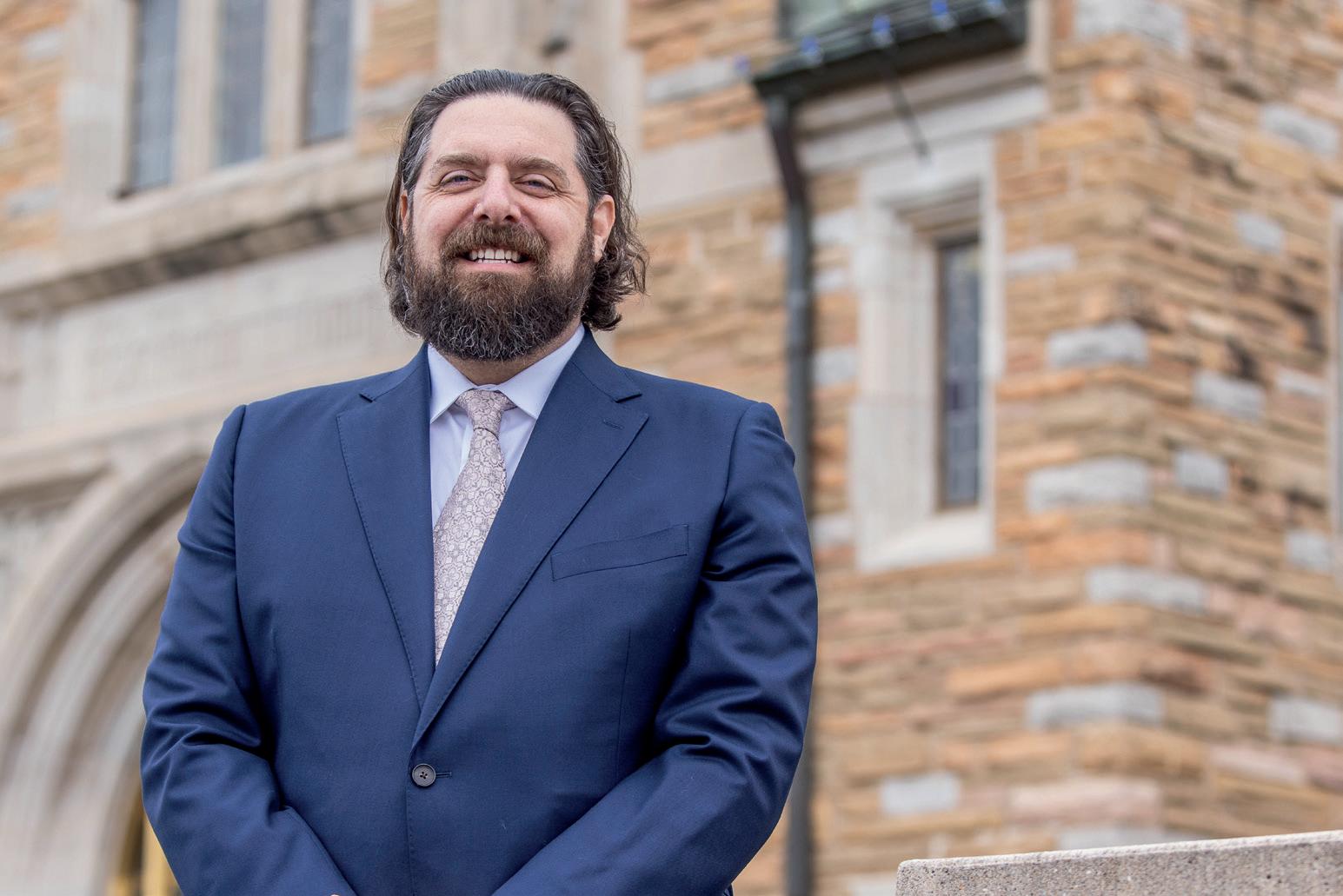
Bryan
University
campus in 2010 with his third TU degree and into a dream job as a chief technology officer at the Central Intelligence Agency.
“For me, working at CIA was almost a fairy tale from beginning to end. I traveled to more than 70 countries, briefed the most senior government officials, and patented/invented new technologies that saved lives,” said Jensen (BS ’02, JD ’05, MS ’10). “I’m proud to have served my country and in some small way helped to keep America safe – even if all the stories can’t be told.”
As an undergraduate, Jensen had many interests and took a wide variety
of courses. Thanks to TU’s flexibility, he didn’t have to declare a major for the first two years.
“Undergrad was great!” he said. “I took so many courses that I loved: art history, sociology, theory of language, religion.” He fondly remembers sociology Professor Jean Blocker and economics Professor Steve Steib, as well as taking a class from renowned Russian poet Yevgeny Yevtushenko
Layering creativity and critical thinking from a strong liberal arts foundation with a law degree gave Jensen the confidence and credibility to join TU’s elite Cyber Corps program and pursue a master’s degree in computer science under the
guiding hand of Professor Sujeet Shenoi, who directs Cyber Corps.
“Each degree shaped my worldview and gave me career opportunities,” Jensen said. “Cyber Corps is an invaluable program that has a direct feed to U.S. government careers like CIA, National Security Agency, Department of Defense and others. It's a remarkable program.
“I always wanted to blend my legal background with technology, and cybersecurity allows me to interpret policies and standards to shape future technology development.”
What’s even more incredible than a career pre-empting threats to national security within a storied federal agency? It seems that making the leap to the private sector is allowing Jensen to continue protecting cyberspace on a new level. He recently left the CIA for another legendary organization: Microsoft.
“I'm a senior leader at Microsoft working with various customers to architect solutions to some of the world’s hardest problems like AI, quantum and cybersecurity,” Jensen said. “I'm fairly new, but so far, I’m loving the team and learning about the great culture and products that have made Microsoft a household name.”
When he’s not helping save the country and its citizens from cyber threats, Jensen spends his personal time traveling the world, playing the drums, swimming, and working to obtain his private pilot’s license.
When he returns to Tulsa to visit family, Jensen stops by TU’s campus just to reminisce. “The campus has changed a lot since 1998 when I was a freshman,” he said. “Many new additions and buildings have been constructed in the last 20-plus years. It’s great to see!”
Class notes are a way to share what’s going on in your personal or professional life with your TU classmates.
1960s
1 Linda Freeman Jirka (BA ’64, MA ’66) is retired with her husband, Michael, and lives in rural north central Arkansas. She has raised over $2 million in grants for regional hospitals and other nonprofits and currently serves on the Mountain Home Food Basket board. She is also a Gold Life Master bridge player.
2 Jerry Roger (BS ’66, MTA ’69, EdD ’75) has completed 51 years as an educator. He was the research and evaluation director for Tulsa Public Schools and director of academics at the Tulsa campus of the University of Phoenix. He capped his career by teaching mathematics to undergraduates and research methods to graduate students. He and his wife, Tetyana, have traveled widely to many countries on five continents.
3 Thomas Rumreich, D.D.S. (MA ’67) published a novel in 2020 titled “Unholy Communion.” The book is a story about the effect of sex abuse by clergy on the lives of young men. A screenplay by the same name began production in 2023.
4 William J. Carl (BA ’70) is a former pastor, professor, seminary president, and author of eight successful nonfiction books about religion. The latest is “Assassin’s Manuscript,” a suspenseful international thriller about a one-time CIA assassin turned minister who is asked to return to his old life to stop a global
terrorist plot. Bill is retired and lives with his wife, Jane Alexander Carl (BS ’70), in Tennessee with views of the Great Smoky Mountains from their back porch. When they were students at TU, Jane and Bill said they both learned a great deal about leadership from then-TU President J. Paschal Twyman.
Wes Jones (BSBA ’81, MIS ’00) was inducted into the Oklahoma Soccer Hall of Fame in 2020. Wes played soccer at TU and continued to play in adult leagues while contributing to the growth and development of the sport in Tulsa.
John Harvey (BA ’85), 2020-21 Distinguished Alumnus, is the senior vice president of operations for TPC Group in Houston. He attended the Houston Alumni reception in January with his wife, Jennifer, and enjoyed the basketball game with daughter Bethany Rucker and granddaughter Eleanor.
5 Sharon Prince (BSBA ’85, MBA ’86) is CEO and founder of Grace Farms Foundation. She was the keynote speaker at the Friends of Finance luncheon Oct. 18 and has served on the Friends of Finance Board of Directors.
Alison Powell Eagleton (BSN ’86) is a Navy veteran and manager of clinical education services at Saint Francis Health System.
Richard Hathcoat (BSBA ’88, JD ’91) was appointed Tulsa County district judge
by Gov. Kevin Stitt in October. Earlier in his career, he worked in oil and gas in Colorado and practiced general civil litigation and criminal defense work in state and federal courts. In 2022, he became a special judge for Tulsa County District Court. Richard lives in Tulsa with his wife and three children.
1990s
6 Anne Davis Bogie (BSBA ’90, MBA ’93) is the recipient of the 2024 YWCA Tulsa Pinnacle Award in Health and Wellness. The award recognizes exemplary women who demonstrate both professional success and commitment to service. Anne left the corporate world after being diagnosed with breast cancer at the age of 29 and losing her mother to cancer. She joined Oklahoma Project Woman and is now executive director of the organization, which provides access to free breast health care to uninsured women with limited incomes in order to lower the mortality rate through early diagnosis and care. Oklahoma Project Woman provides free mammograms to over 4,000 women each year.
7 Dax Craig (BSBA ’91) was the featured speaker at the Friends of Finance luncheon on Jan. 17. Dax is cofounder and CEO of Pie Insurance. A letter winner for cheerleading, he received the Collins College of Business Fast Track Award in 2001 and the Outstanding Alumni Award in 2023. He also serves on the college’s Advisory Board.
8 Susan Chapman Plumb (JD ’91) was
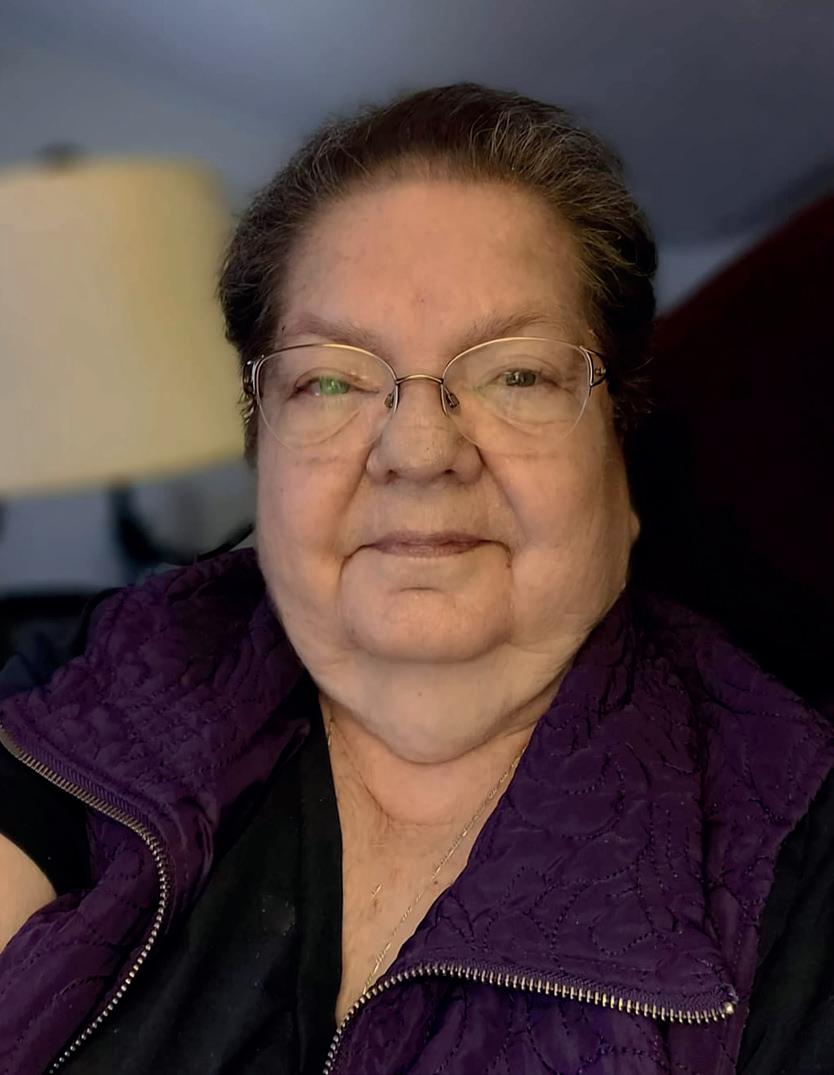


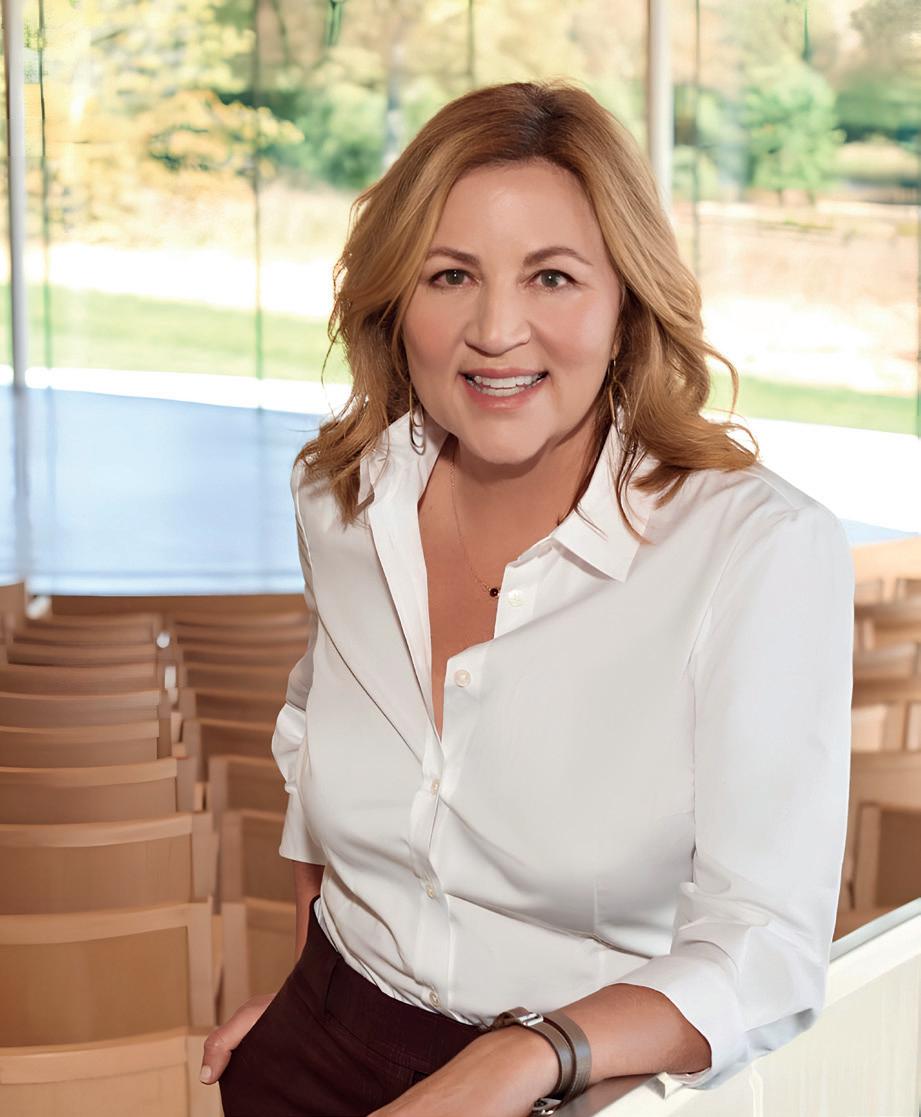
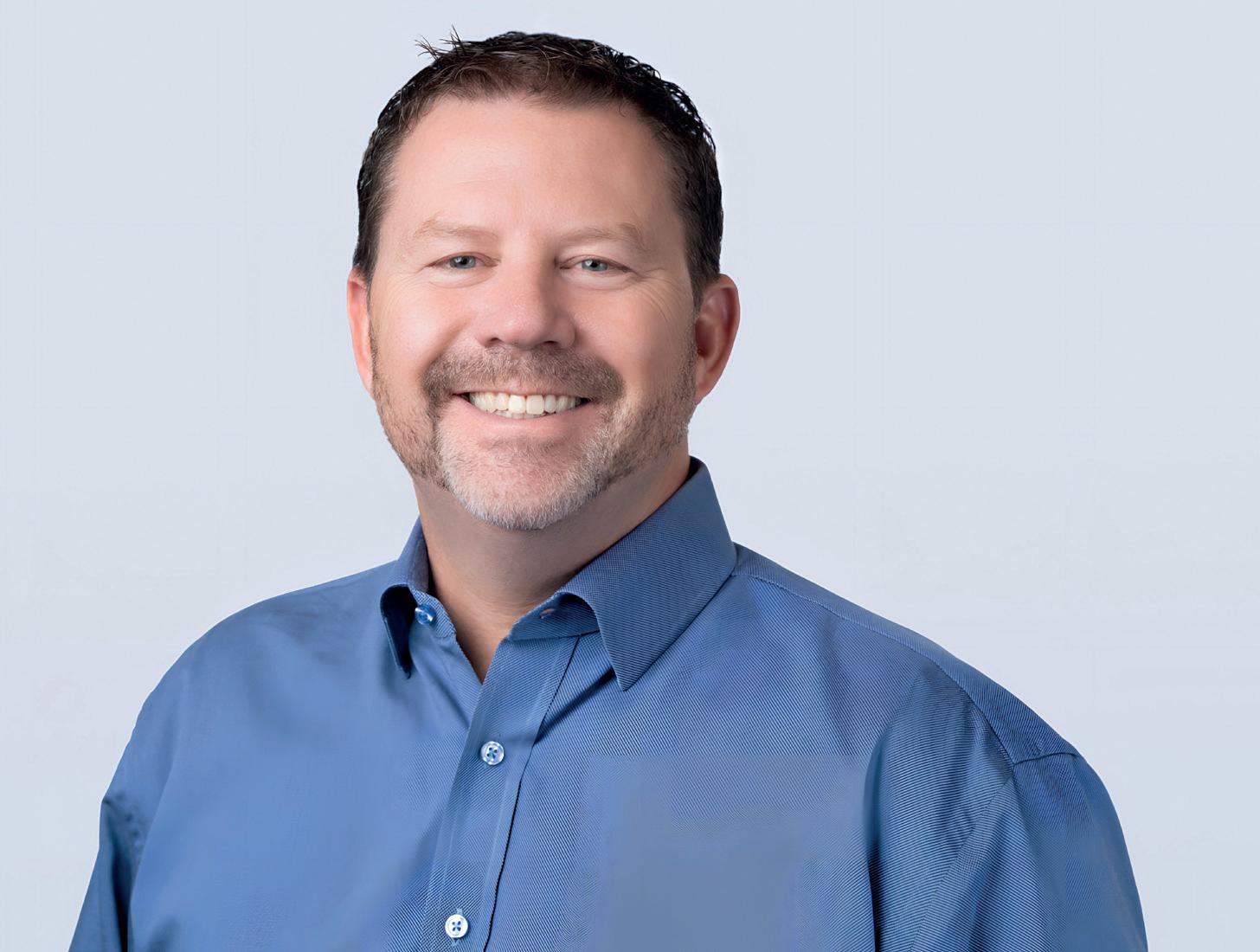


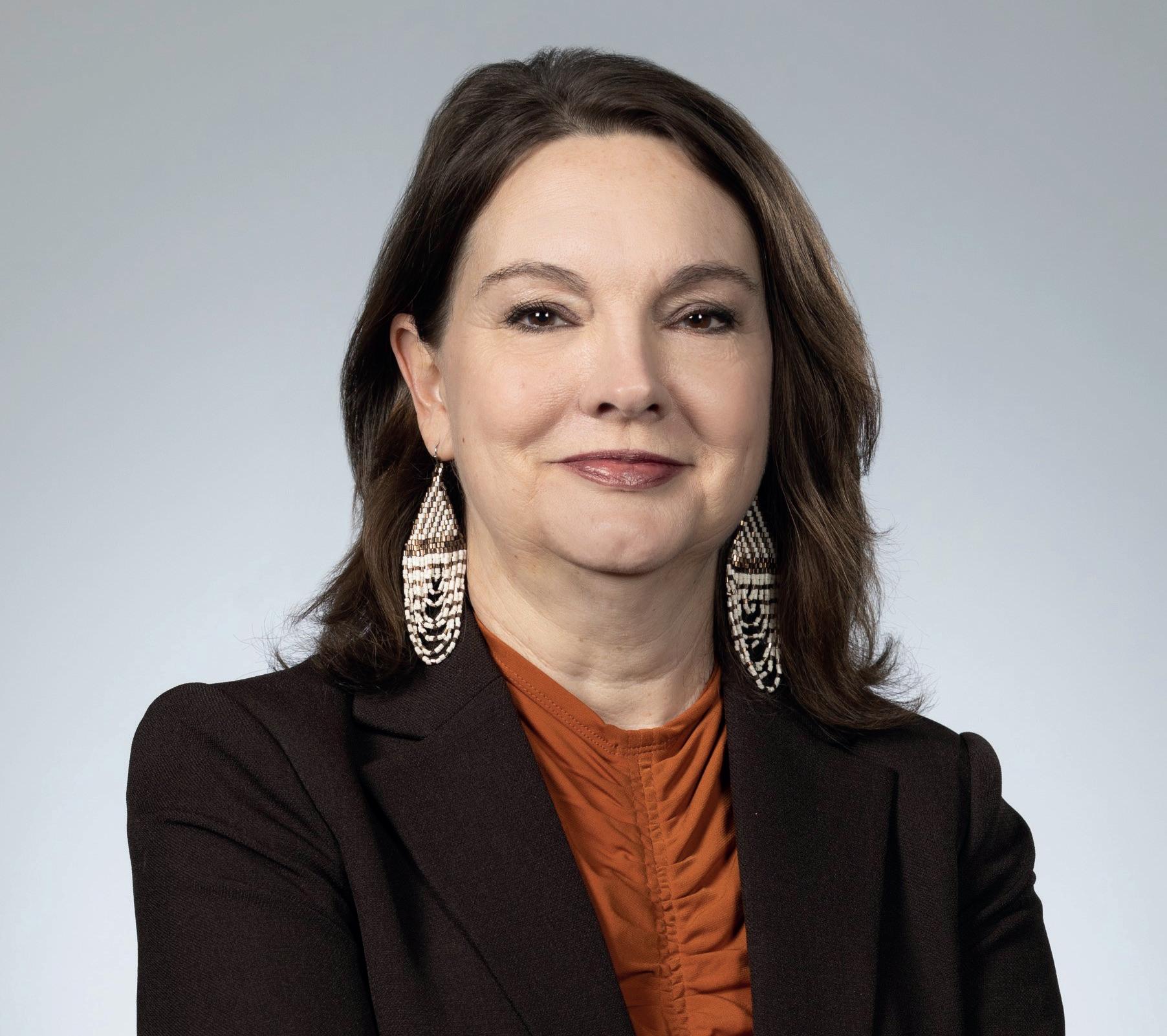
elected to serve on the board of directors of the Federal Reserve Bank of Kansas City. She serves as board chair and CEO of Local Bank in Hulbert, Oklahoma, with other Oklahoma locations in Tahlequah, Park Hill, Sallisaw, and Grove.
9 Noreen Peters (BA ’92) has been the associate director of development for TU’s College of Engineering & Computer Science at TU since late 2022, and additionally, for the Collins College of Business since August 2023. Previously, she served as stewardship assistant in TU’s Advancement Services department. Noreen enjoys the energy and excitement of the campus, the site of four of the most formative (and fun) years of her life. She loves meeting new alumni and reconnecting with old friends. Pictured are Noreen’s sister, Eileen Merrick Sails (BSBA ’07), Karen Kuchar Karsten (BA ’92) and Peters.
Dessie Nash (BSBA’94) recently joined the Metro DC leadership team for Bank of America Private Bank as market leader. Dessie is a founding member and inaugural chair of the Black Alumni Leadership Council and a member of the TU Alumni Association Board of Directors.
Dan Alpert (BSEP ’95) is a process plant project manager for GasTech Engineering LLC in Sapulpa.
10 Doug J. May (JD ’95) rejoined firm of GableGotwals following 10 years as general counsel for Magellan Midstream Partners. As a shareholder in the Tulsa office, Doug’s practice will focus on contracts, securities, finance, mergers and acquisitions, governance, energy, and commercial law. Currently, he also serves as an adjunct professor at TU Law, teaching corporate finance and securities regulation.
Dan Newman (BS ’95) was inducted into the Union High School Athletics Hall of Fame for his service as athletic trainer since 2002. He was also announced as a 2024 inductee to the Oklahoma Athletic Trainers’ Association Hall of Fame.
11 Alumni gathered with Kathy Taylor, Genave King Rogers Dean of Collins College, at a dinner in Dubai in January.
Pictured are Tariq Ahmed Alwahedi (BSPE ’96), Meagan McCollum, associate professor of finance, Jarit Polley (JD ’12), Taylor, Reem Al Munsef (BS ’16), Oxana Vasilkova (MBA ’06), Jessica Crossfield (BSCE ’15), Naji Shaban (BSCE ‘04), Amer Yahya (BSPE ’82), Farhad Azizi (BIL ’05), Amy Gerald (BA ’99), director of campaign and development operations at TU, and Ali Al-Nahdi (BSEE ’86)
12 Jason Soper (MBA ‘96) was promoted to division president of Stewart Title of Oklahoma Inc. Stewart Title is an international company that specializes in title insurance and related services required for settlement by the real estate and mortgage industries.
2000s
13 Karly Wiemar Mason (BA ’02) was the first to receive the Chair’s Award for Excellence in psychology the year she graduated. She went on to obtain her master’s degree in social work and her clinical license as an LCSW. She is in private practice and certified in perinatal mood disorders, treating mainly adolescents, couples, and new parents. She also teaches expectant parents about mental health during and after pregnancy. Karly lives in Tulsa with three children and enjoys training her dog, a Belgian Malinois, in her spare time. Karly said TU will always hold a special place in her heart. She is grateful that the university ignited a passion that has allowed her to help many people.
14 Sara Hill (JD ’03) recently became the first Native American woman to serve as a federal judge in Oklahoma. Alumni and colleagues gathered in her honor at a reception hosted by TU’s College of Law and Dean Oren Griffin. Pictured are Cherokee Principal Chief Chuck Hoskin Jr., Phil H. Viles (MBA ’83, JD ’75), Griffin, Hill, Stacy L. Leads (JD ’97), and Chuck Garrett, CEO of Cherokee Nation Business.
15 Kristy White (BSBA ’03) works for Propeller Consulting, having previously worked at Waller & Co. PR. She and her husband started a company called Bubba-Q-Boys, featuring three blends of
seasoning: Original Competition, Chipotle Sweet Heat, and Honey BBQ. Along with her father, the couple won several awards in barbecue competitions, giving them the idea for the business venture. Visit their website at bubba-q-boys.com.
Keith Nodskov (BSBA ’04) and his wife have started Houston Haven, a nonprofit ministry providing low-cost housing to outof-town cancer patients and their families undergoing treatment at Texas Medical Center in Houston.
16 Leslie Brier (JD ’07), president of the TU Law Alumni Association, and Dean Oren Griffin address local media at the presentation of “Greenwood Imagine,” a three-panel art installation by local artist Ebony Iman Dallas. The artwork was displayed in the law school during February in commemoration of Black History Month.
17 Colleen McCarty (BA ’08, JD ’20) was named a Tulsa World “Person to Watch in 2024.” She is executive director of the nonprofit Oklahoma Appleseed Center for Law and Justice, which is part of a national network of organizations promoting social change and advocacy for under-resourced communities.
Clara Seaman (BSEP ’09) joined Sierra Space in 2022 and has been designing propulsion systems for various spacecraft. She was recently selected to be the lead project engineer for a new satellite propulsion system.
Erin Stranford Lamb (BS’10) is a member of the technical staff at OFS Laboratories in Somerset, New Jersey. Erin has been elected chair of the TU Physics Advisory Board.
18 Randy Stapleton (BSBA ’10, MEB ’16) recently founded Stapleton Services LLC, a Bristow-based construction company specializing in repair, maintenance, remodel, and renovation of residential, commercial, and light industrial properties. He brings to the business 20 years of experience in property management and construction.






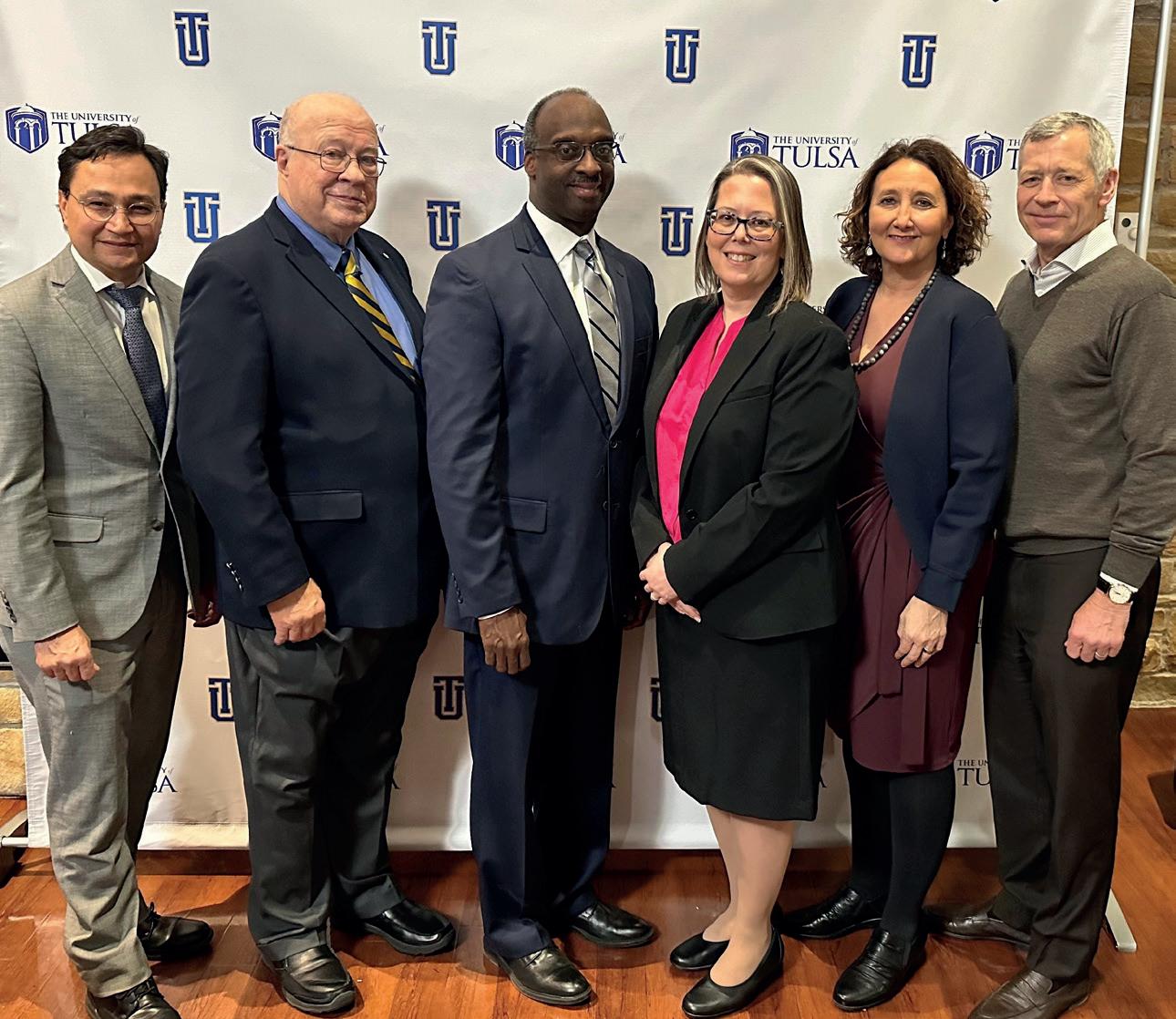
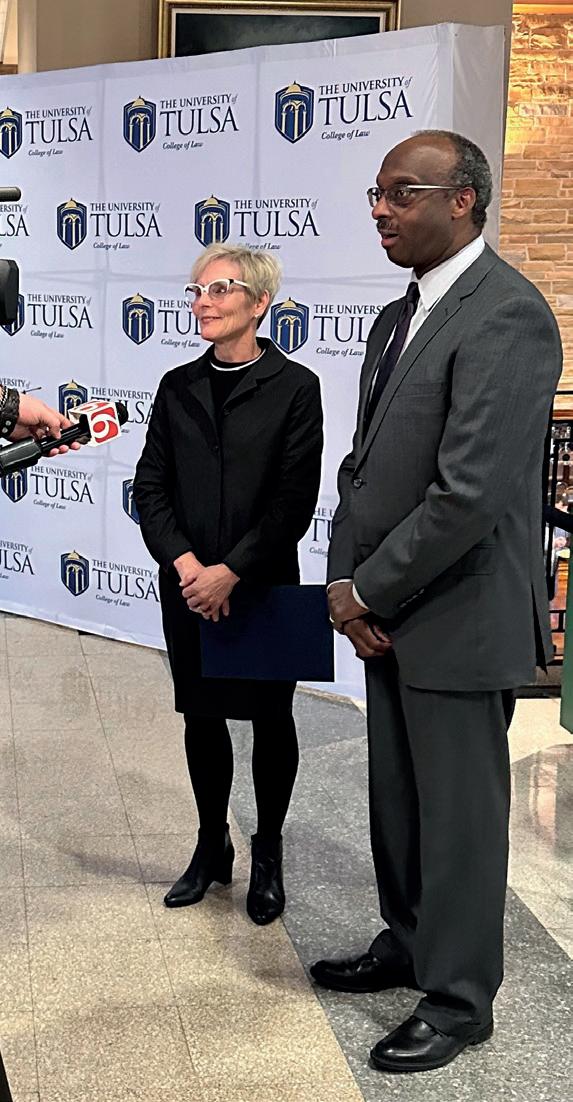
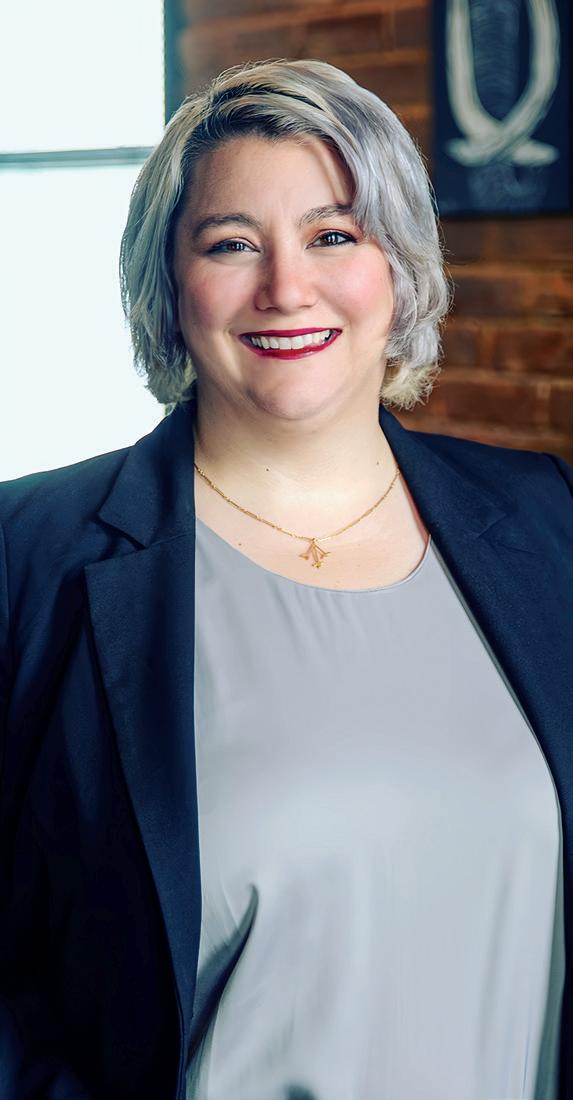

19 Daniel Tarr (BA ’10) worked as an editor on “Sasquatch Sunset,” which was screened at the 2024 Sundance Film Festival. Starring Riley Keough, Jesse Eisenberg, Christophe Zajac-Denek, and Nathan Zellner, the film tracks a year in the lives of a Sasquatch family of four.
20 Curnelius Arnick (BSBA ’11, BSBA ’12) is co-founder and chief operating officer of Tequila with Friends. The company was started in 2018 by Curnelius and three friends from Dallas. Their premium tequila has gained popularity and now ships around the country. His wife is alumna Tori Peters Arnick (BEX ’14) .
21 Kirsten L. Palfreyman (JD ’11, MBA ’11) recently became partner at the Tulsa law firm of Atkinson, Brittingham, Gladd, Fiasco and Edmonds. While in law school, she completed internships with Judge Linda Morrissey of Tulsa County District Court and Judge Deborah Barnes of the Court of Civil Appeals. Kirsten is a member of the Oklahoma Bar Association and currently practices in civil litigation with an emphasis in research.
22 Lorena Rivas (JD ’12) is the entrepreneur honoree of the 2024 YWCA Tulsa Pinnacle Award. She is CEO of Rivas & Associates, an immigration law firm with clients all over the United States. To better serve the community, she recently opened the Colegio de Sueños (College of Dreams) offering ESL and citizenship courses to individuals seeking American citizenship. Her firm employs over 100 people with 95% of them being minority women. The Pinnacle Award recognizes exemplary women who demonstrate professional success and a commitment to service.
23 Jennifer Speck (JD ’12) recently became a partner in the tax office of Bracewell LLP in Houston. She advises clients on the qualifications for and the monetization of energy transition tax incentives. Most recently, Jennifer was senior manager of tax and regulatory compliance at Navigator CO2 Ventures LLC.
Guy Wesley Swartz (JD ’12) was named a “2024 Best Lawyers Under 40” by D Magazine. Guy is a senior attorney with Sargent Law PC in Dallas. His practice focuses on a wide range of litigation, including tort defense, oil and gas, dram shop litigation, products liability, and premises liability.
24 Jamie Booker, II (BEX ’13) is a gym manager and personal trainer at Beyond the Gym in Tulsa. A letter winner in basketball at TU, he uses his experience in sports performance and rehabilitative strategies to provide his clients with a wide range of care.
Derya Kilic Demirci (MS ’13) is a team leader at Turkish Petroleum Corp. She was the primetime speaker on “Integrating Geology and Geophysics: Lessons from Discoveries” at the 2023 SEG-AAPG IMAGE Discovery Thinking Forum.
Hillary (BSN ’13) and Matt Hauth (MSME ’10) welcomed their second child, Henry Allen Hauth, in December.
Taleya Mayberry-Smith (BSBA ’13) is the new director of entrepreneurial programs at TU’s Collins College of Business. Formerly a professional basketball player, Taleya was an assistant women’s basketball coach at TU from 2018 to 2021 before working for ESPN and ACT House.
Tao Zhao (MS ’13) is a data science manager-interpretation at Schlumberger. He received the SEG J. Clarence Karcher Award at the 2023 SEG-AAPG IMAGE conference. Tao was recognized for his innovation and leadership in research, specifically in the development of machine learning methods for seismic, wellbore, and geologic interpretations.
25 Carolina Gonzalez Hammock (BS ’14, BA ’14) opened the Umber Shoppe in Tulsa, selling clothing, home décor, accessories, and vintage items. The store provides Carolina a creative balance to her corporate work in the oil and gas industry. Umber Shoppe offers merchandise from all over the world, including Carolina’s small line of size-inclusive clothing.
26 Colle Murch (BSBA ’14) left her corporate job in early 2020 to start a watercolor portrait business, Colle Creative. She sells hand-painted custom watercolor portraits of homes, wedding venues, and pets, as well as cards and prints of her original paintings. Her favorites are closing gifts for couples buying their first homes, paintings of longtime family homes, and portraits of beloved pets. Check out her work at collecreative.com and on Instagram at colle.creative.
27 Jessica Provencher (BA ’14) recently became the Oklahoma City Museum of Art’s curator of exhibitions.
28 Logan James (JD ’15) was elected a shareholder at Hall Estill law firm. Logan focuses his practice in trusts and estate litigation and complex commercial litigation. He has extensive experience in all phases of litigation, including trial work.
29 Lauren Marciano (JD ’15) was elected a shareholder at Hall Estill law firm. Lauren is a litigation attorney who joined the firm in 2021. She practices in complex commercial, construction, employment, and trusts and estate litigation.
Blake Chancellor (BS ’16) and Sarah Rind Chancellor (BA ’15) have completed academic work for their doctorates. Blake received his Ph.D. in computational genetics from Harvard Medical School. Sarah received her Ph.D. in behavioral neuroscience at Boston University Medical School, where she was the inaugural Concussion Legacy Foundation Young Scientist Fellow. The research for their dissertations was jointly performed at laboratories sponsored by Boston University and Harvard University. The research provided a new understanding of brain matter alterations that occur due to repetitive head impacts. Blake is a licensed patent attorney working as a biotechnology patent agent for Wolf Greenfield. Sarah is a senior scientist with the AbbVie Foundational Neuroscience Center working to better understand neurodegenerative diseases at a molecular and cellular level. They reside in Medford, Massachusetts.
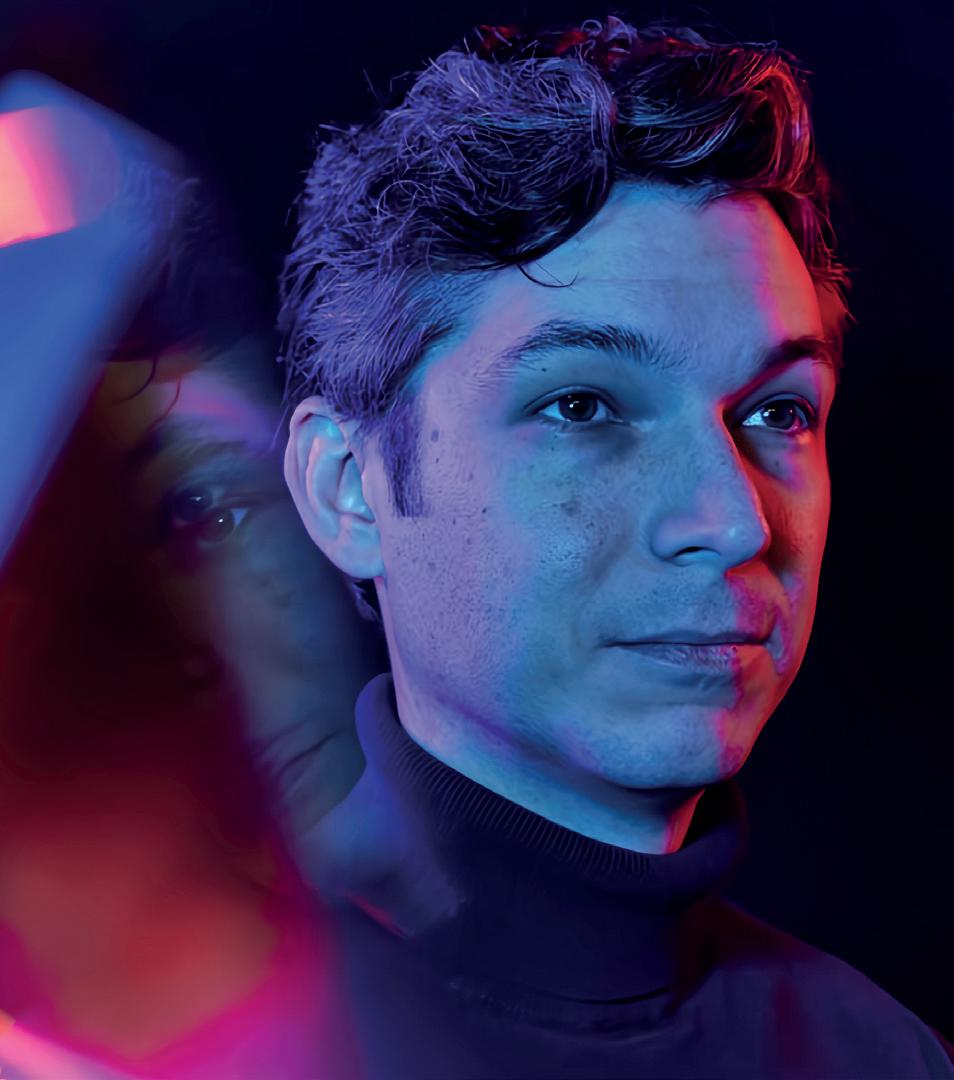





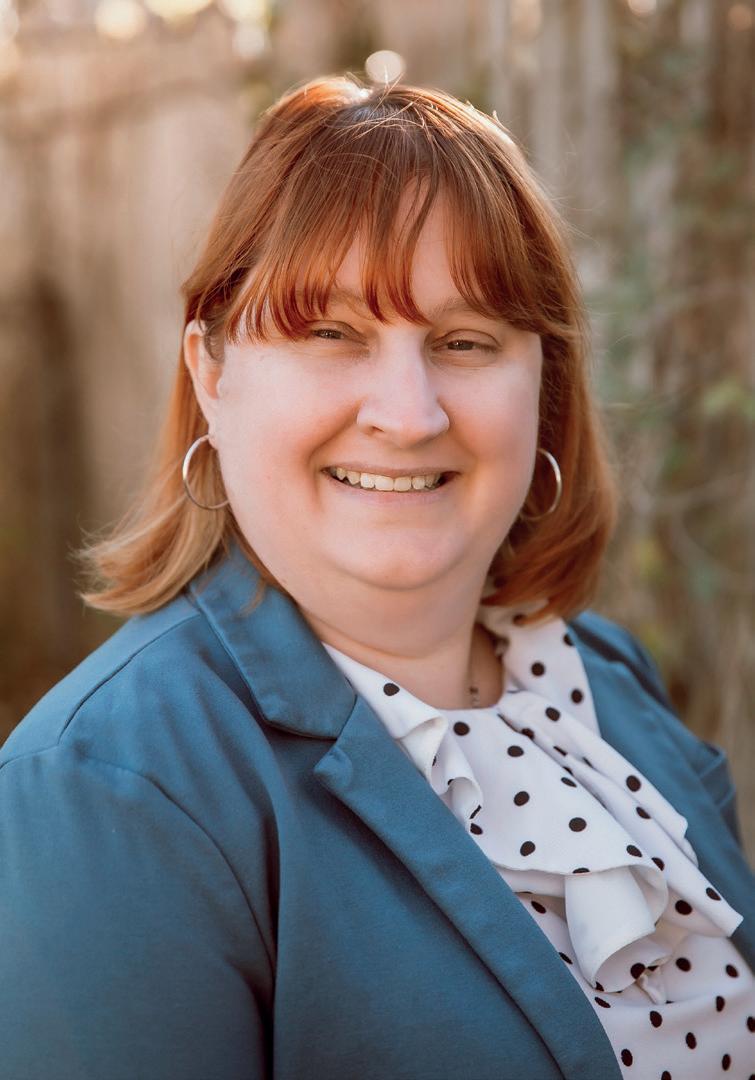
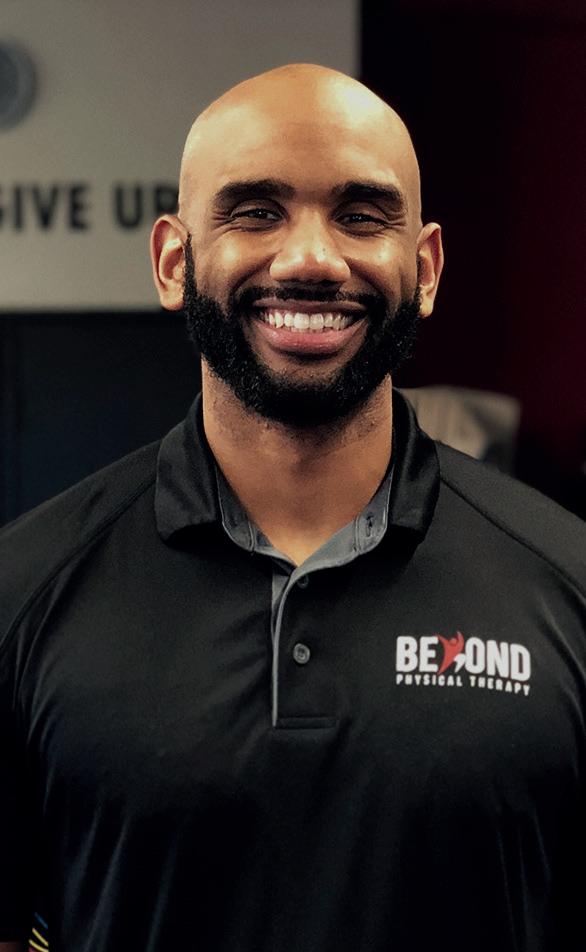
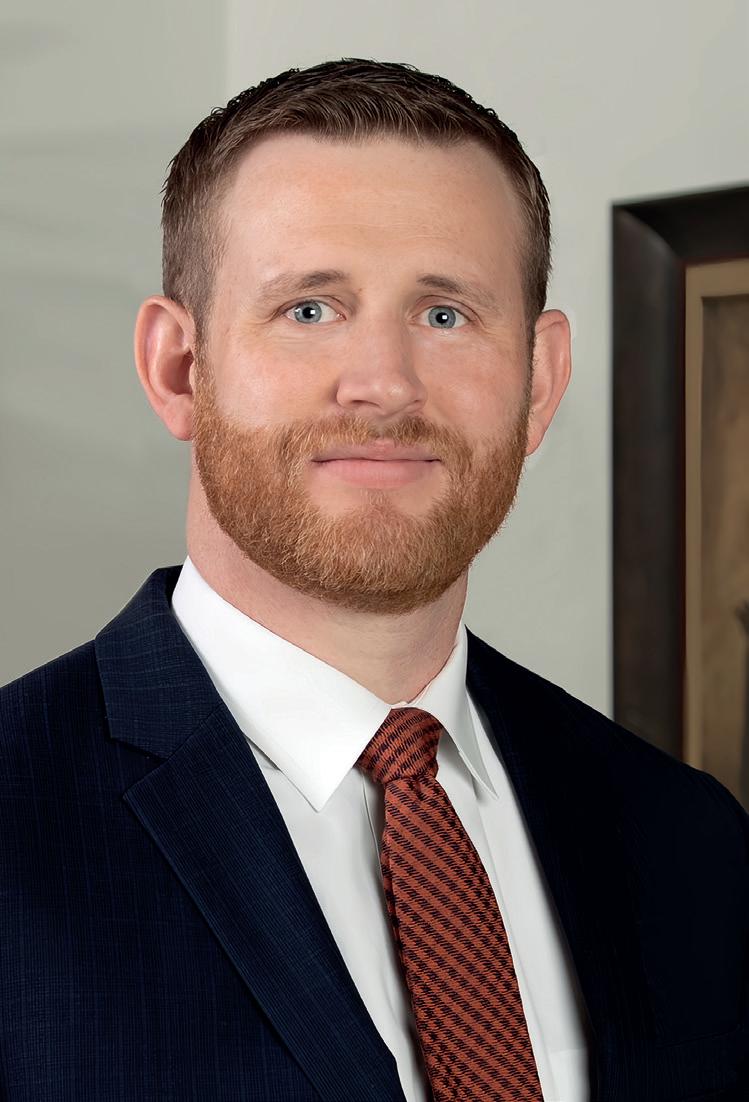

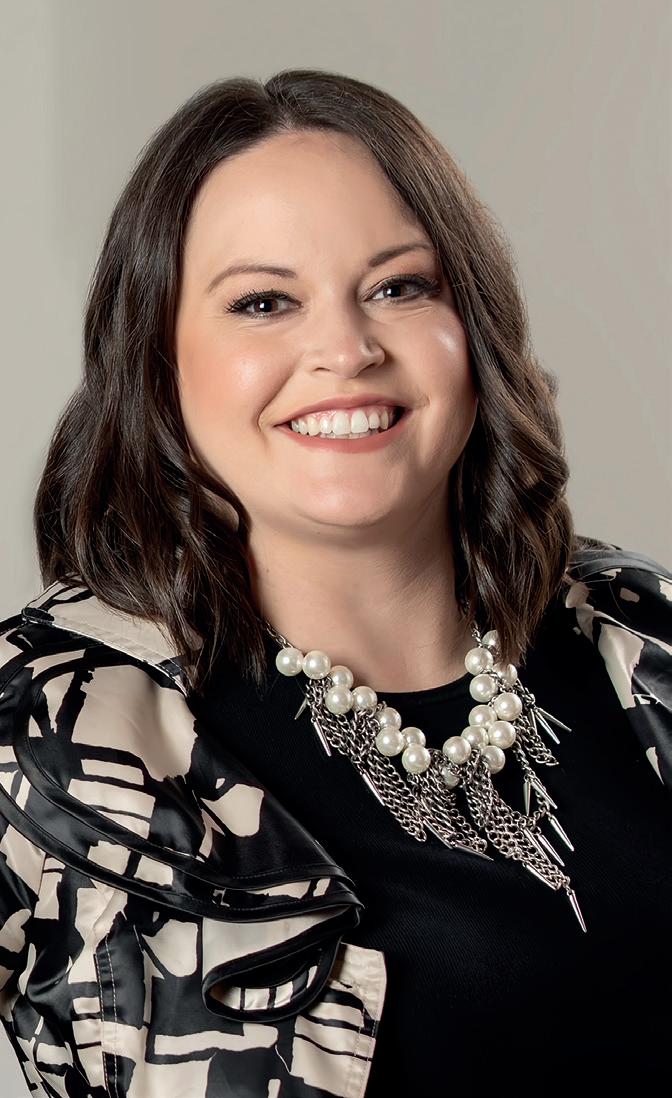
30 Dane Evans (BS ’16) joined the coaching staff of the Owasso High School Rams, led by head football coach Antonio Graham (MA ’14). Tonio was a graduate assistant coach when Dane was playing football at TU, beginning in 2012 and culminating in two bowl games, the Independence Bowl in 2015 and Miami Beach Bowl in 2016. Dane’s professional football career included playing for the Philadelphia Eagles, the Hamilton TigerCats of the Canadian Football League, and the British Columbia Lions.
31 Matt Hickman (BSBA ’16, MBA ’18) is an investment principal at Plains Ventures, the oldest and largest venture capital firm in Oklahoma. Before joining Plains, Matt worked at Goldman Sachs, as a part of the investment banking division in New York where he advised companies on several record-breaking buyouts totaling $100 billion. While at TU, Matt was a letter winner and captain of the football team. His wife, Aubrey Hercyk Hickman (BA ’16), was a deaf education major and cheerleader.
32 Bailey Grufik Hays (BSBA ’17) became a CPA in December. She is an accounting and tax manager at Steve M. Rutherford CPA in Tulsa. She has been with the firm since 2018.
Maile Seto (BS ’17, MS ’19) lives and works in Honolulu, Hawaii, and serves on the Communication Sciences and Disorders Advisory Council. While at TU, she became a two-year letter winner in rowing.
33 Rachel Terrell (BS ’17, MS ’20) is a licensed speech-language pathologist and certified brain injury specialist with a private practice called Rooted Therapies in Fort Worth, Texas.
34 Maddie Schmidt (BFA ’18) and Jessica Walker (BFA ’17) launched the Ruby Clay Co. in Tulsa, providing ceramic artists and educators with quality supplies and equipment. They also sell artisan goods and handmade ceramics by Maddie and Jessica and several other artists. Visit rubyclaycompany.com.
35 Jeremy Wright (BM ’18) manages a nonprofit community orchestra called Tulsa Peoples’ Orchestra. The organization was founded in 2021 to
make music accessible to all who want to enjoy it. The concerts are always free and open to the public. The orchestra is made up of musicians from various backgrounds with 65 performers last season. Jeremy is a cellist and vocal performer who has also sung with Tulsa Opera and Trinity Episcopal Church.
36 Audrey Brown (BS ’19, MBA ’22) is a graphic designer and has launched a merchandise line called Threads by Aud featuring licensed Tulsa Golden Hurricane gameday gear. Check it out at threadsbyaud. com or on Instagram at threadsbyaud.
37 Carly Gillman (BEX ’20) is a physical therapy specialist in Coweta, working with Redbud Physical Therapy. She received her doctorate in physical therapy in 2023 at OU Health Sciences Center.
Sheridan Nolen (BA ’20) was recently promoted to deputy press secretary for Texas Gov. Greg Abbott. While at TU, Sheridan focused on political science and French and studied at Université Catolique de Lille in France.
Trystyn Edgar (BS ’21) began her studies last fall in the Texas Tech Physician Assistant program.
38 Faith Nichols (BSBA ’21) is a TU regional admission counselor in Dallas. As a student, Faith served as president of the Student Association, studied abroad in Spain, and received the David R. Lawson Outstanding Senior Award from the Collins College of Business. Having made the most of her time at TU, she is equipped to talk to prospective students about the opportunities at the university.
Ann Marie Flusché (BS ’22) began her studies at the Duke University School of Medicine last fall.
Benjamin Blittschau (BS ’23) began his medical studies last fall at the University of Oklahoma School of Medicine.
39 Grace DeJohn (JD ’23) recently joined the firm of Pray Walker as an associate attorney. She will be concentrating
her practice on complex commercial litigation, including insurance disputes, environmental claims, and personal injury defense, among other areas. Before moving to Tulsa, she gained commercial law experience working for the in-house legal department of a Fortune 500 company in the Phoenix area.
40 Noah Kemohah (JD ’23) is an attorney at Combs Law Group in Skiatook. His artwork was recently used by Paramount Pictures and Cinemark theaters to promote “Killers of the Flower Moon.” Noah is a member of the Osage Nation. He designed and installed the piece on family Osage land in the Osage reservation, where a film crew visited to photograph the piece during the light of the Flower Moon on May 5, 2023. See more of Noah’s art on Instagram at blacksheepdarkhorse.
Emma Linn (BS ’23) began her studies last fall in the University of Pennsylvania School of Dental Medicine.
Reema Moussa (BS ’23) began her medical studies last fall at the University of Oklahoma School of Medicine.
41 Kirsten Pfeiffer (JD ’23) is a new associate at McAfee & Taft. Kirsten is a trial lawyer and corporate attorney with a multi-faceted practice focusing on the resolution of complex business and commercial disputes in state and federal courts, mediation, and arbitration proceedings. She represents insurers in claims and coverage disputes and defends manufacturers and distributors in product liability litigation, as well as representing individuals and companies in general civil litigation matters.
Hareem Shoaib (BS ’23) began her studies at University of Oklahoma School of Dentistry last fall.
42 Iyan Smith Williams (BA ’23, BS ’23) is currently a long-term substitute teacher at his alma mater, Booker T. Washington High School. In fall 2022, he spent a semester in Barranquilla, Colombia. He is grateful for the opportunities he had at TU to travel and learn more about the Spanish-speaking countries through JumpStartTU and his semester abroad.
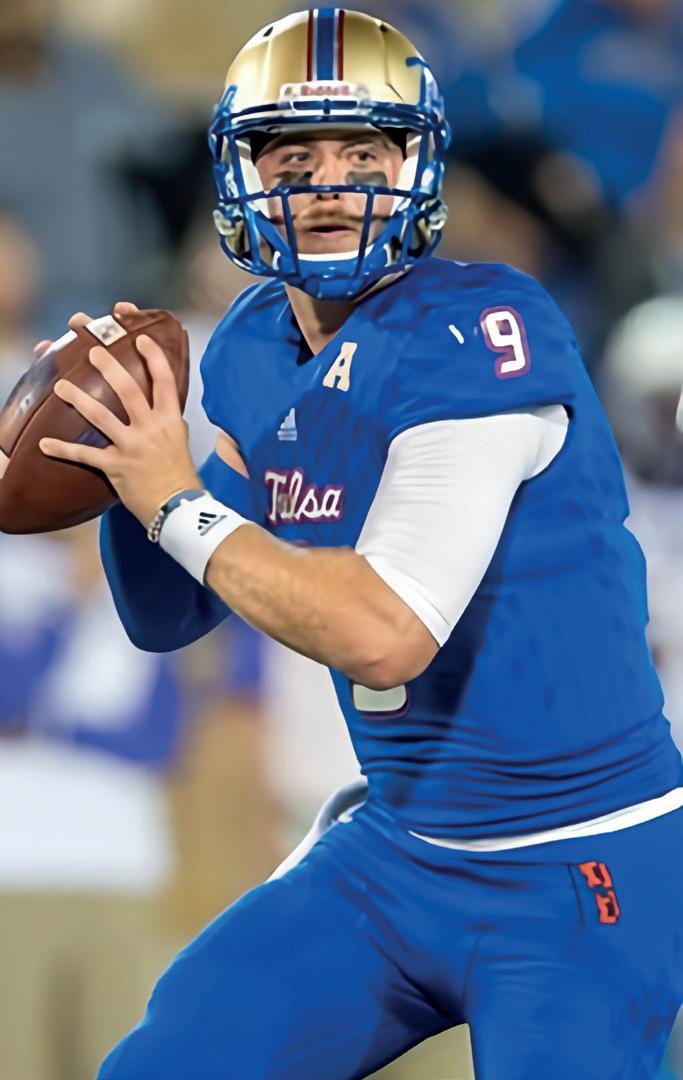
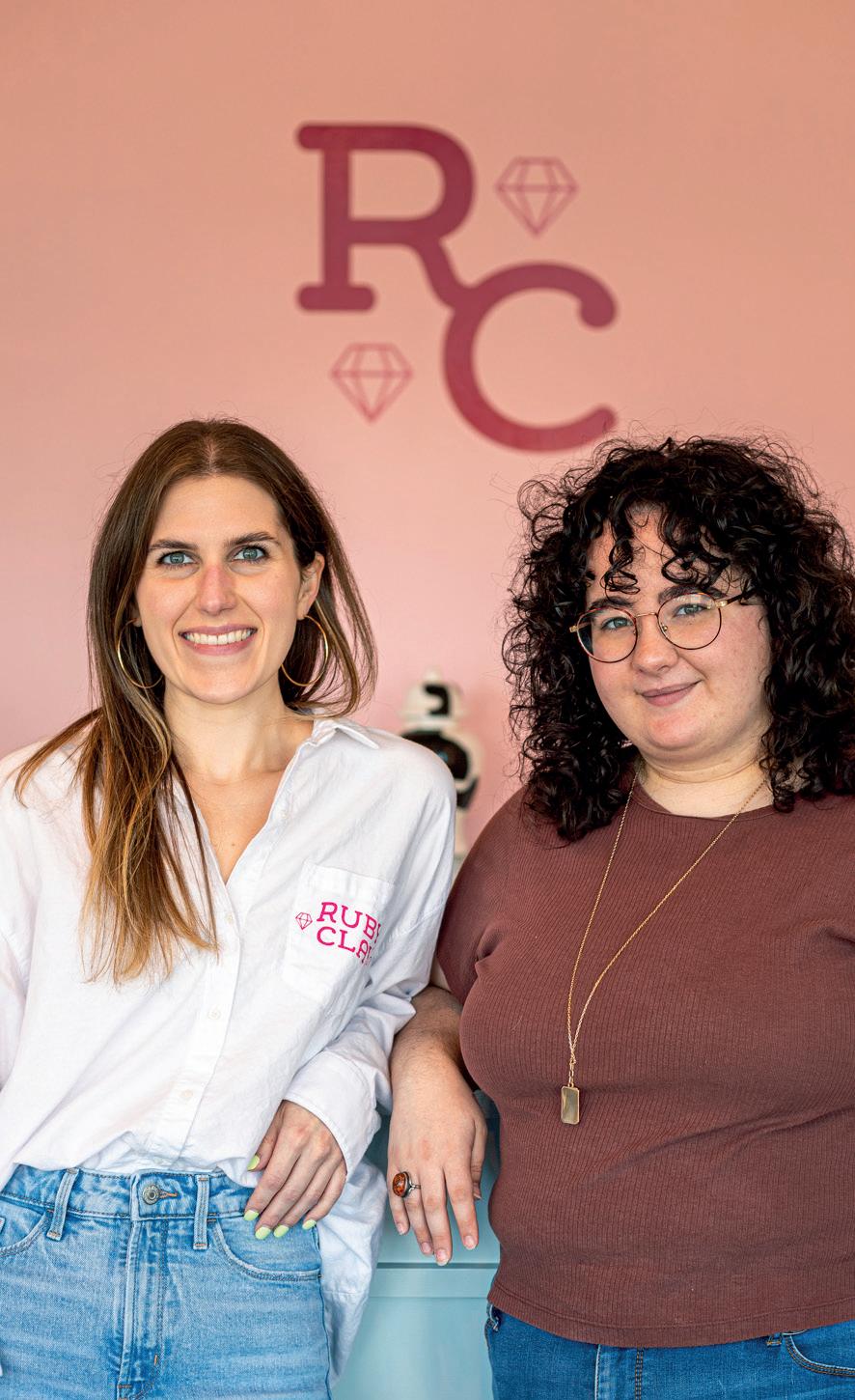
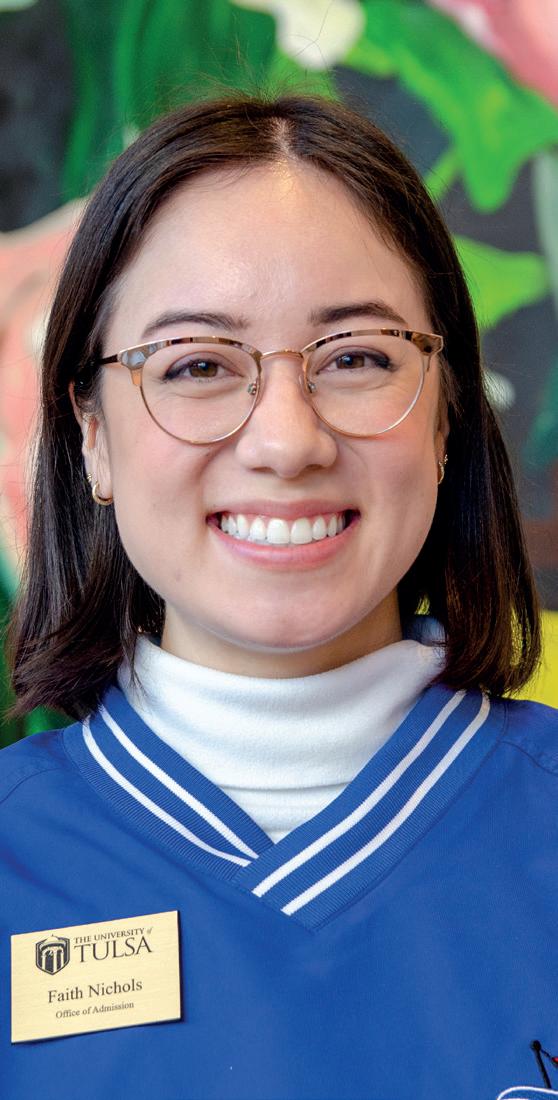

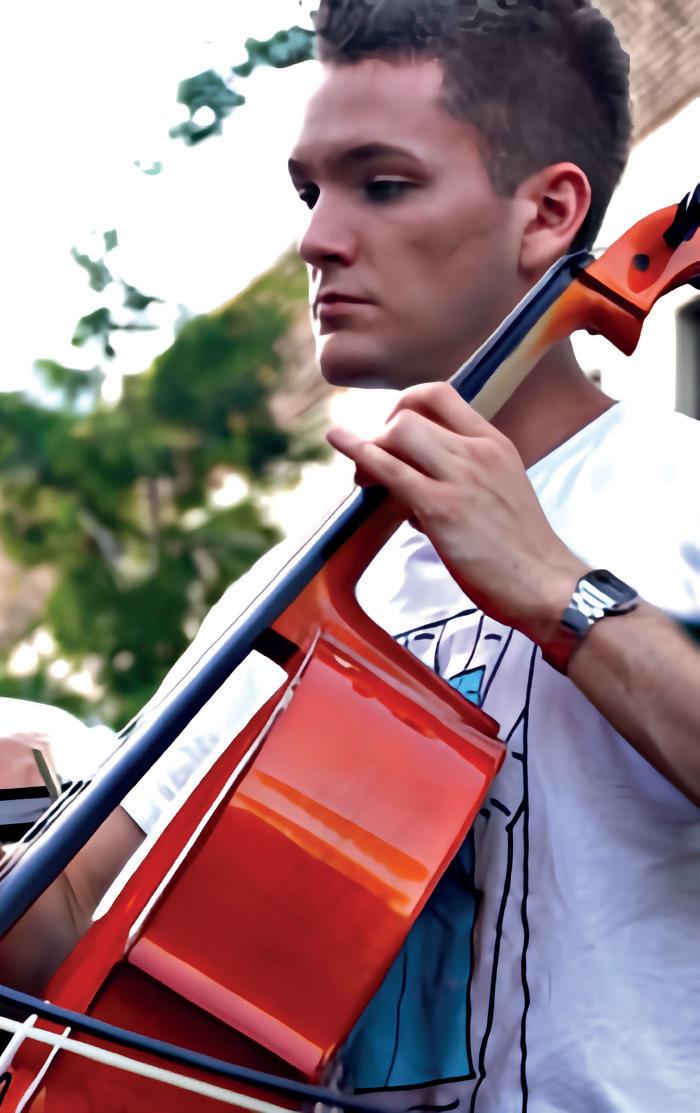
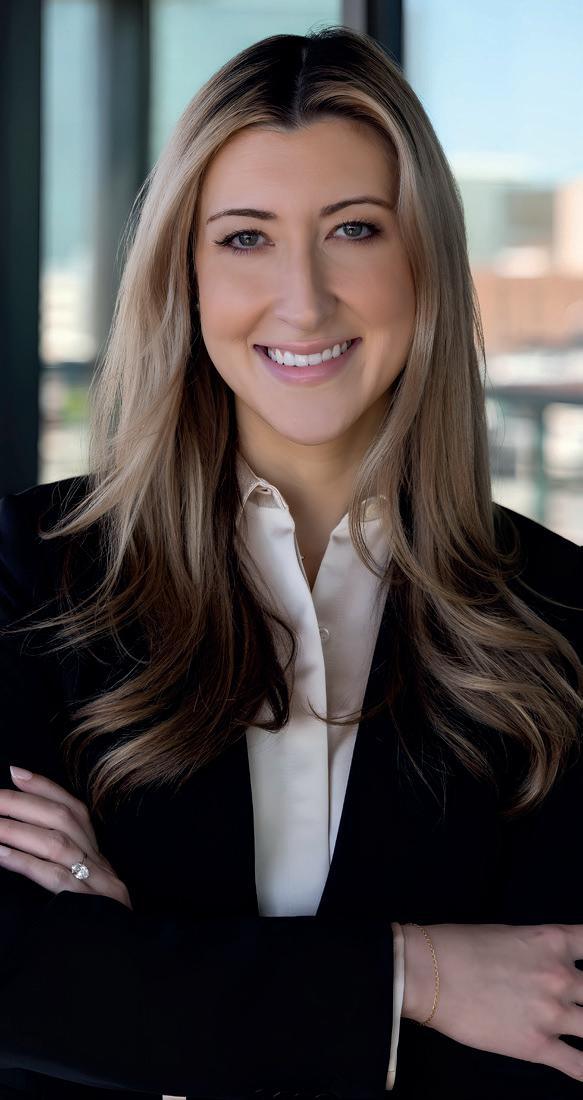





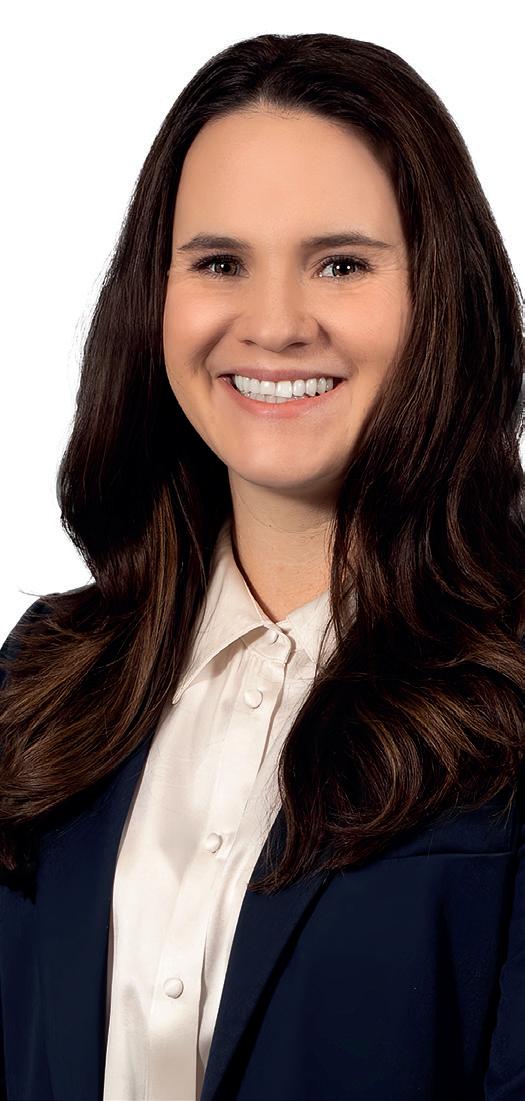

1 Williams Albert “Al” Hair (BS ’48) was recently inducted into the Centenarians Hall of Fame by the Centenarians of Oklahoma. After receiving his degree in engineering physics from The University of Tulsa, Al worked for IBM and Boy Scouts of America and later Washita Valley Community Action Agency and Oklahoma Rehabilitation Services. Al is also a U.S. Navy veteran of World War II. He retired in 2001 at age 79. Since then, he has kept busy with family, church, and travel. He says his time at TU stands out as a high point in a long list of life-changing experiences.
2 Jenny Griebenow (BA ’89, MA ’91) published two articles in 2023, one in Quillette and the other in Alaska Women Speak. She leads a discipleship group with her husband, Greg Griebenow (BPE ‘86), and specializes in care ministry. She graduated her final homeschooled student in 2022. Pictured are Jenny and Greg with children Helena, Beren, and Zach at Beren’s graduation.
3 The 11th Street All Stars trivia team, primarily made up of TU alumni, participate in a weekly Tuesday night trivia competition at American Solera brewery in Tulsa. In 2023, the team collectively used their TU degrees from all five colleges to win first place in both “total points scored” and “highest number of total wins” for the year. TU alumni on the team include Rich Hathcoat (BSBA ’88, JD ’91), Doug Anderson (BSBA ’92), Amy Freiberger (BSBA ’96, MBA ’99), Jeffrey Metcalf (BA ’11, MBA ’15), Kyle Dorsey (BCS ’17, BS ’22), Natalie Crise Dorsey (BSP ’17, MS ’19), and Elise Polk (BSP ’20), not pictured.
4 Jacob Newburn (BS ’04) is an assistant athletic trainer on the medical staff for the 2023 World Series champion Texas Rangers.
5 Camille Herron (BS ’05) is an ultrarunner, reaching 100,000 lifetime miles in 2022. Her list of marathons and races is extensive, and she holds records in various categories. At TU, she was a Tulsa Undergraduate Research Challenge scholar and researched strength training and the effects of gravity and outer space on bone and muscle mass. Her bone and exercise studies continued in graduate school and helped fuel her interest and involvement in ultrarunning.
6 Ashley Sheridan Efaw (BS ’05) graduated with her doctorate in May 2022 after a successful defense of her thesis, “Occupational Therapy StudentInitiated Journal Clubs in Pediatric Fieldwork Settings.” She is currently an assistant professor and academic fieldwork coordinator at the University of Oklahoma Health Sciences Center in the Department of Rehabilitation Sciences. She is also a faculty member for the Oklahoma Leadership Education in Neurodevelopmental and Related Disabilities program.
7 Angela Surratt (BS ’13) completed her last semester of her doctoral program last fall, and she is a program coordinator for Aya Healthcare. She was recently honored by her sorority and chapter with the Soror of the Year award. Founded in 1908, Alpha Kappa Alpha is the first Black sorority. She also received the Alumni DEI Changemaker award presented by the TU DEI office in April 2023.
8 Spenser Pulleyking (BSME ’17) and Ryley Johnson (BS ’17, MA ’19) were married in the High Roller Ferris wheel in Las Vegas on Aug. 3. They met in biology class in 2013 and share a love for the subject despite changing their majors. Spenser is in the final year of TU’s mechanical engineering doctorate, and Ryley is a data analyst for TTCU Federal Credit Union.
9 Abby Raiford (BM ’17) was recently recognized as a Tulsa District Winner for the 2024 Metropolitan Opera Laffont Competition, qualifying for the regional competition in Little Rock, Arkansas, in February. Abby’s music degree is in vocal performance.
10 Savanna DeWeese Liao (BA ’18) and Wesley Liao (BSEE ’18) welcomed baby Rowan Hollow Liao on Nov. 21. They met their sophomore year at TU when they were on the housing staff in Lottie and John, respectively, and married in 2018.
11 Mary Beth Sawyer (BEX ’19, MBA ’21) married Warren Graham Engles on Dec. 8. She returned to the TU campus recently as an adjunct instructor for the Oxley College of Health & Natural Sciences. Outside the classroom, Sawyer is a full-time project manager while pursuing a doctorate in health care administration. She credits her involvement with the Downtown Rotary Club of Tulsa as her favorite way to give back to the community besides teaching.
12 Kearstin Hilligoss Mudd (BSBA ’21) married Matthew Mudd on Oct. 21 at St. John Catholic Church in Stillwater.
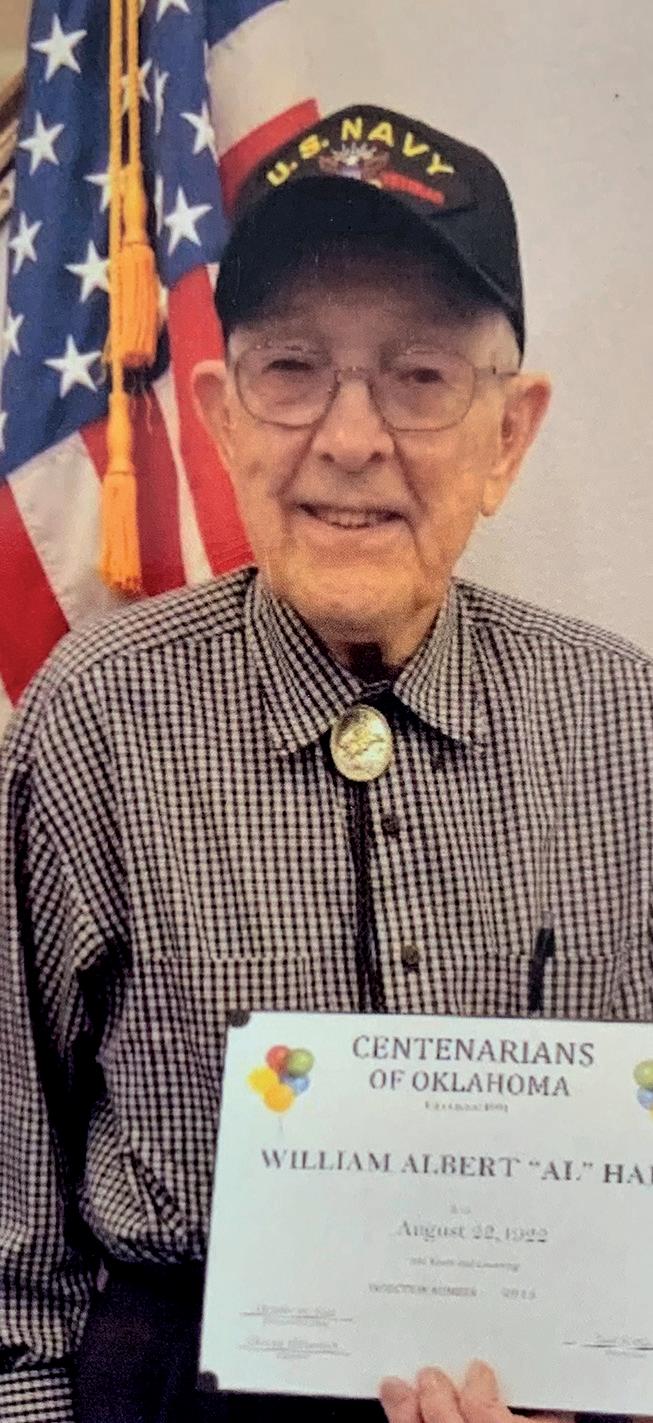

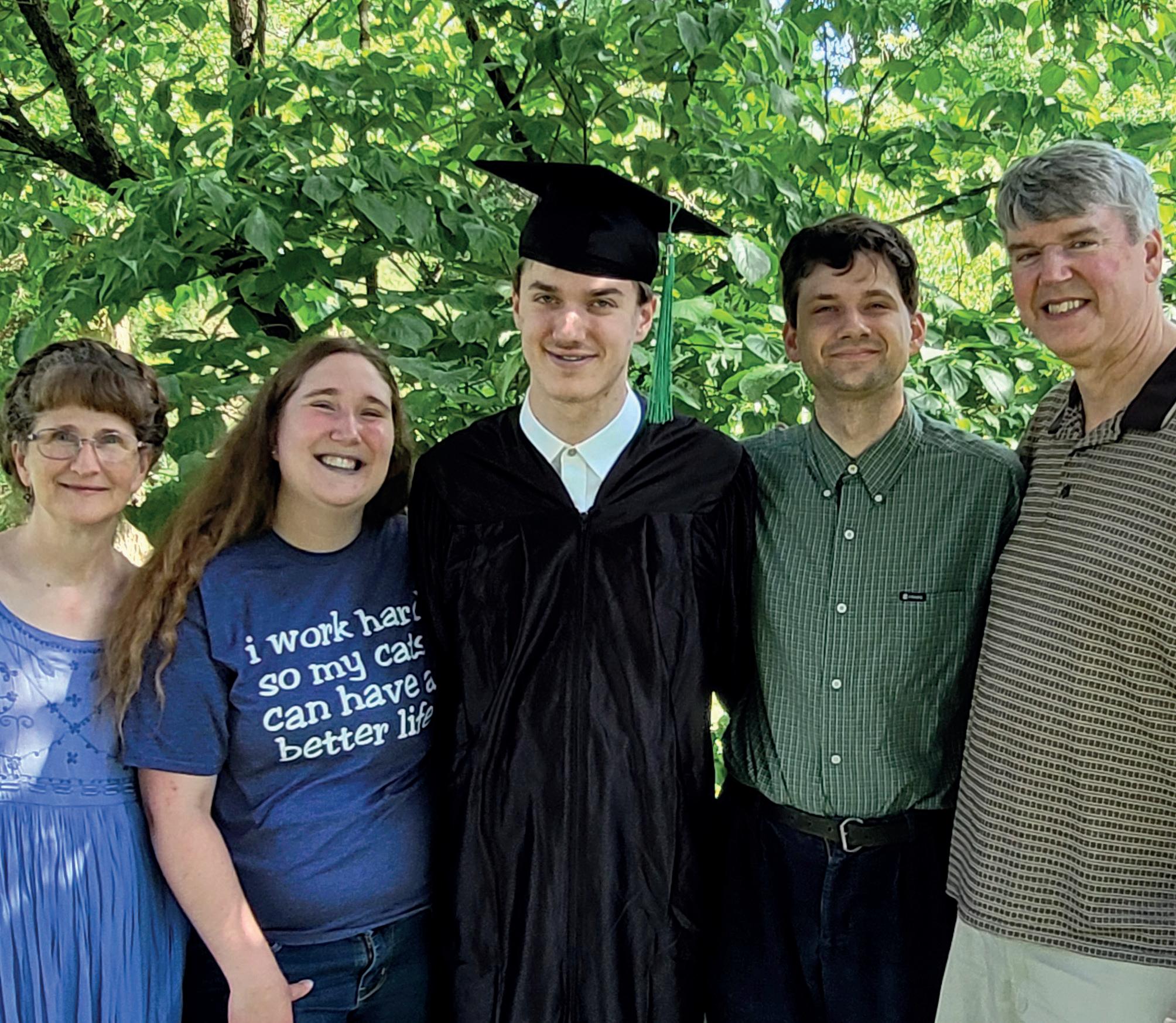
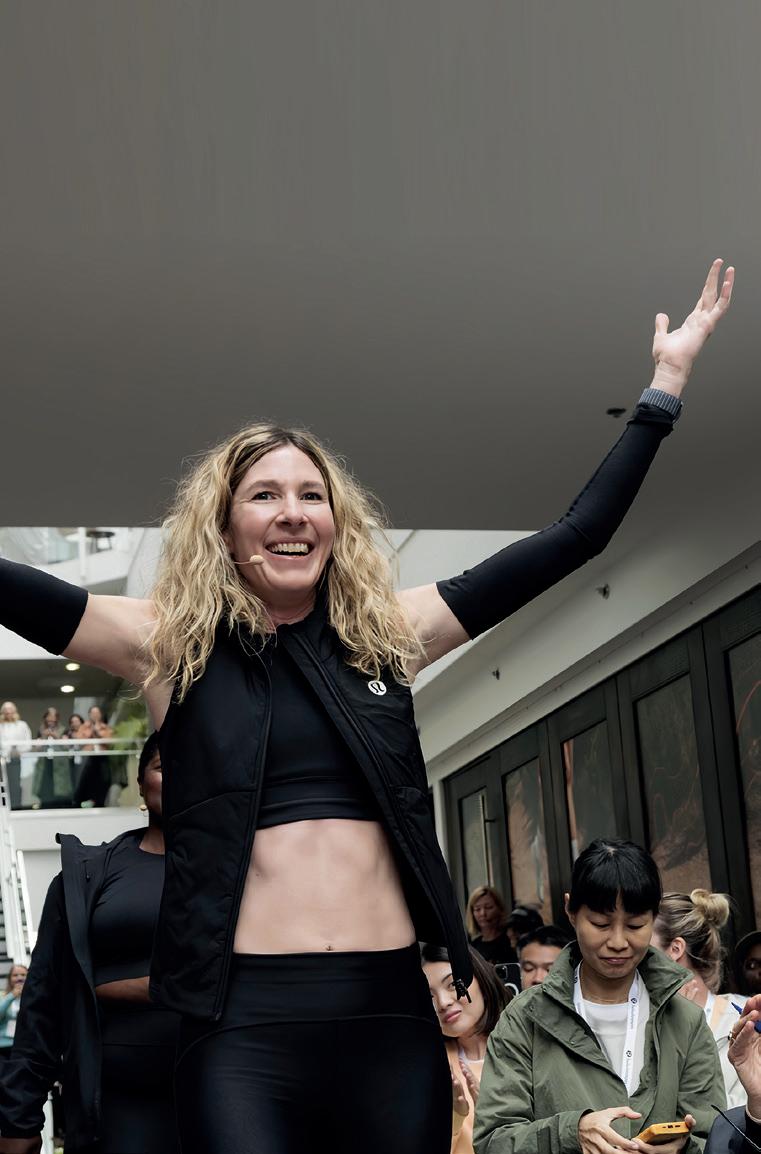

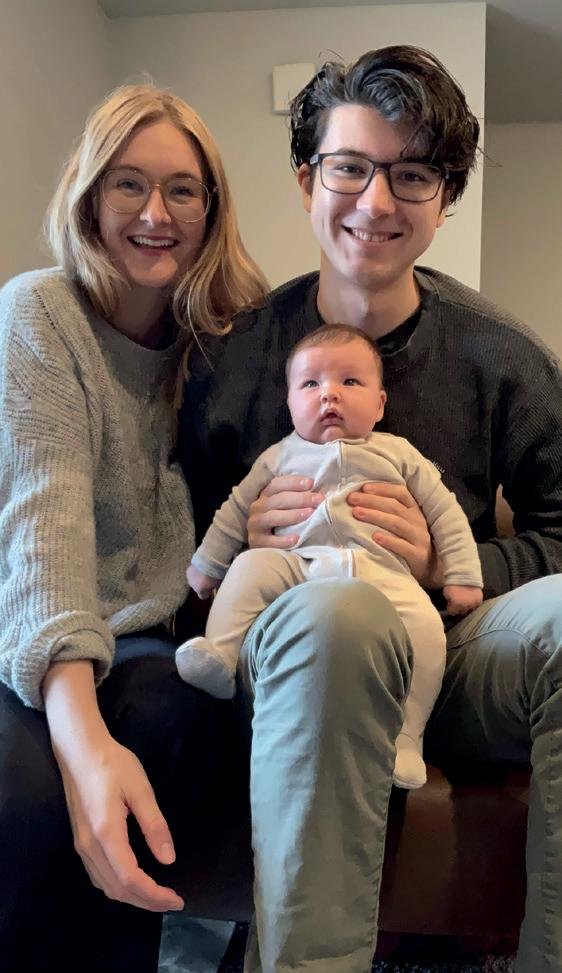

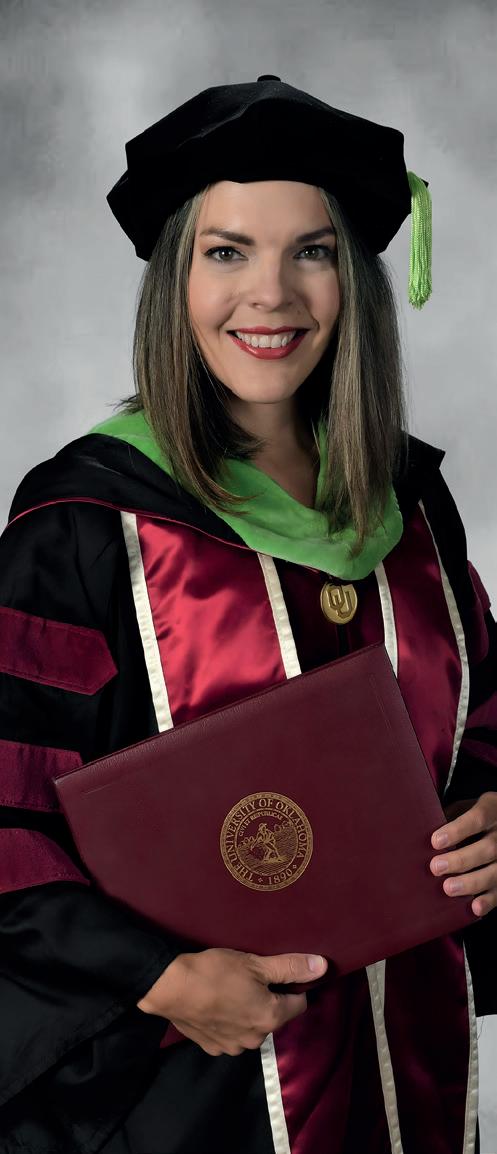

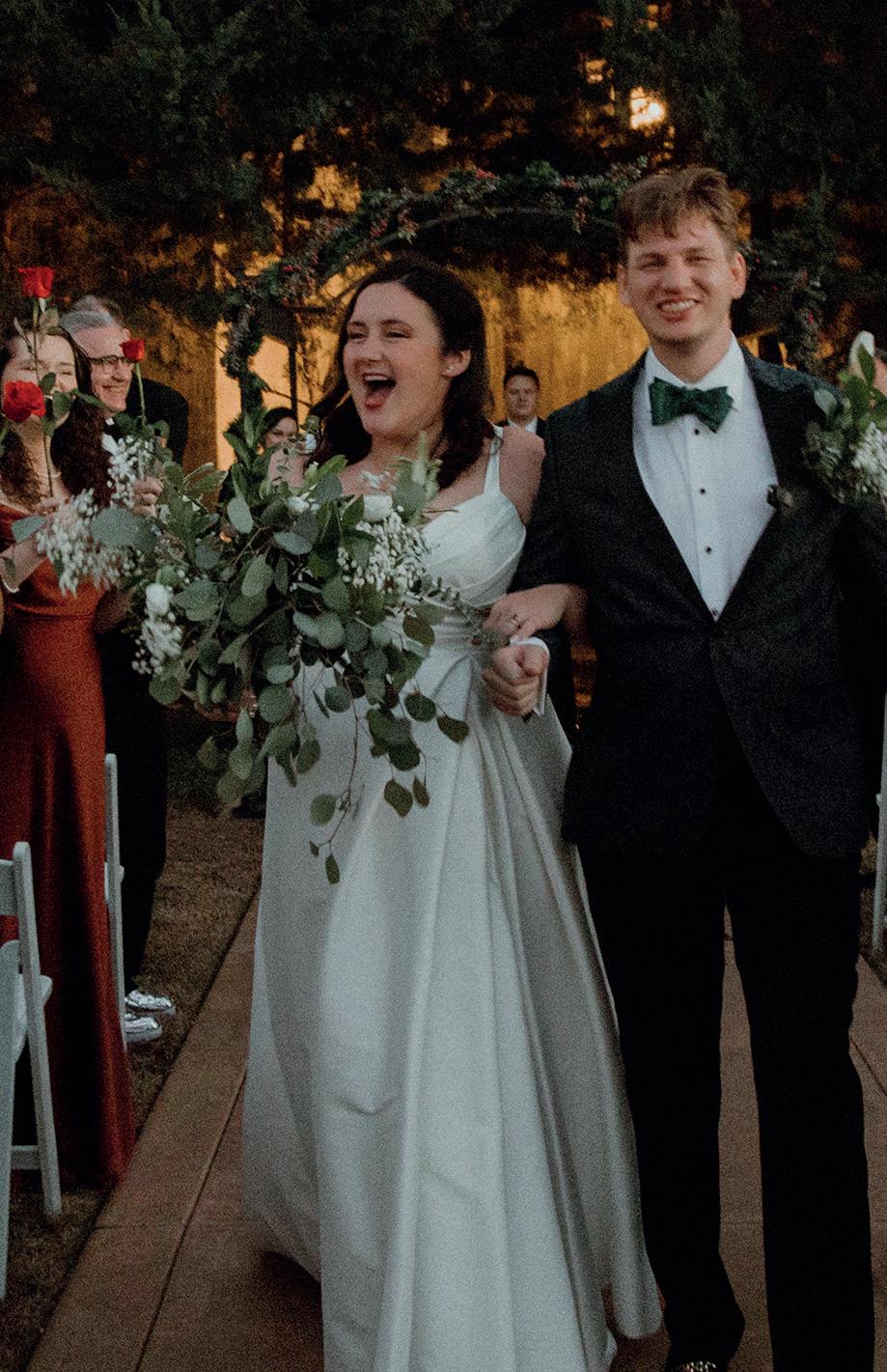
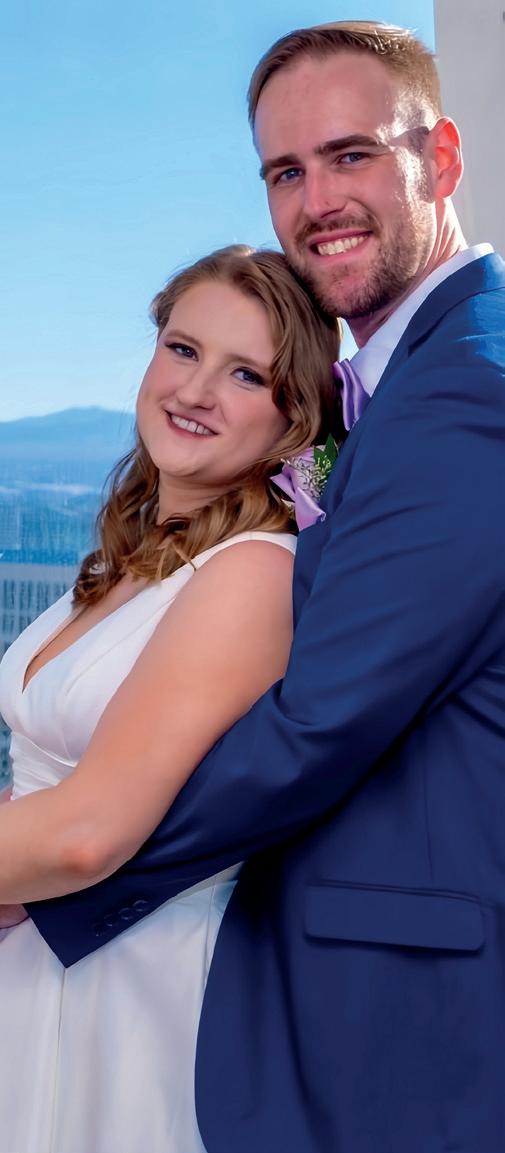
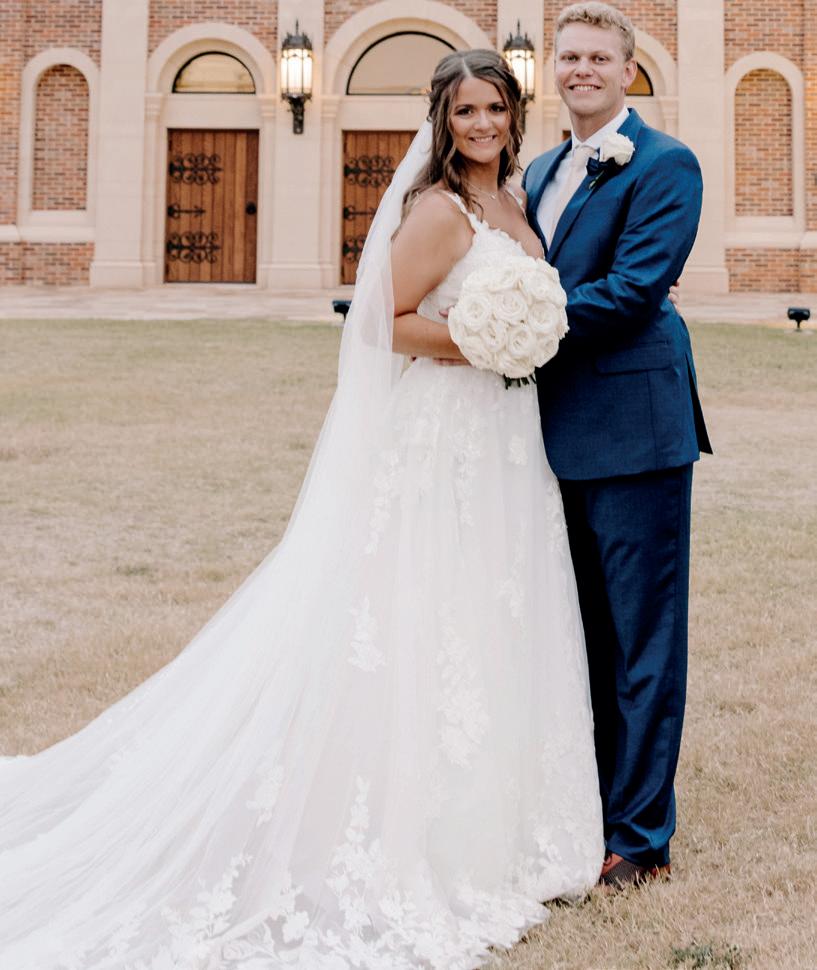
1 Reed Killam (BS ’76), Blaine Hemphill (BS ’75), and Craig Ciarlelli (BS ’77) take their TU pride to new heights on a ridge 12,000 feet above sea level in the backcountry of Colorado.
2 Rick Dickson (BS ’77), vice president and director of athletics, helped welcome football letter winners and new recruits on Jan. 20 at the Dallas-Fort Worth Area Alumni Reception before the men’s basketball game against SMU. Pictured are Dickson and Drew Pearson (BSR ’89), Doug Panfil (BSBA ’79), Rickey Childers (BS ’75), Mack Lancaster (BS ’75), Joshua Smith (incoming student-athlete), Rod Patten (BSBA ’84), Jaxon Lee (incoming student-athlete), David Pearson (BED ’84), and Kelly Beesley (BSBA ’83)
3 Jo Taylor Thibert (BA ’05, MSE ’06) and her husband, Thomas, attended the TU Alumni tent party at TU’s game versus the University of Washington in Seattle last fall.
4 Alumni Association Board member Chevaughn Jackson (BSBA ’06) caught up with fellow alumni at the Dallas-Fort Worth area alumni reception in January. Pictured are Jackson, Tiffany Wardlow (BSBA ’03), associate director of alumni engagement; Meda Merritt (BEX ’02), Dallas Chapter president; Thomas Porter
(BSBA ’14), Alumni Association president; and Melodi Carpenter Parker (BS ’02) Visit TUAlumni.com/Dallas to learn more about the Dallas Chapter.
5 Michael DeShazer (BSCE ’07, MEB ’15) and Houston Chapter President Michael Kumpas (BSBA ’14) were two of the nearly 200 alumni, prospective students, and families in Houston on Jan. 28 at a reception before the Golden Hurricane men’s basketball road victory at Rice University. DeShazer is vice president of business units at Coterra Energy, and Kumpas is contract negotiator at Conoco Phillips. Visit TUAlumni.com/Houston to learn more about the Houston Chapter.
6 Varsha Mathew (MA ’07) is director of human resources at TPC Group in Houston. She and her husband, Jagadeesh Unnam (MSE ’06), attended the Houston TU Alumni reception and TU-Rice basketball game with their children, Viaan (10) and Visma (8).
7 Brian Flake (BPE ’17) is the chair of the TU ’Cane Crawl 2024 committee. Pictured are (first row) Ron Walker (BST ’95, MA ’96), associate dean of TU’s Oxley College of Health & Natural Sciences; Flake; Karlie Oney (BA ’18); Abbey Reynolds (BSBA ’14); (second row) Denisha Garner
(BSBA ’17, BA ’17), assistant director of stewardship at TU; Megan Senol (BSBA ’18, MBA ’19), coordinator of annual giving at TU; John Speaker (BS ’83); Calvin Moniz (BSBA ’06, MBA ’08, JD ’15); Mary Jo Speaker (BS ’83); Paula Kuykendall (BSBA ’86), Tulsa Chapter president; Scott Hawkins (BA ’92); and Lene Davis (BA ’97). ’Cane Crawl is scheduled for April 20, and more information is online at TUAlumni.com/CaneCrawl.
8 Kyla Sloan (BSP ’17, MS ’19) (left) is a speech language pathologist at Fort Bend Independent School District in Texas. She attended the January Houston Alumni reception and caught up with Kamrin Thornton (BSN ’22) (center), a nurse at Memorial Hermann Convenient Care Center Emergency Room in Houston, and Peyton Manning (BSBA ’19). Peyton is a business analyst for Phillips 66 in Houston.
9 Madeline Garvis (BSN ’18) is a registered nurse in the oncology unit at Memorial Herman Health System in Houston, Texas. She recently caught up with friends including Peyton Manning (BSBA ’19) (second from left) at a reception in Houston before the TU-Rice basketball game.
Our online version of Class Notes provides you the opportunity to update your information as you wish. If you are interested in submitting your news directly to TU, please use the following QR code, or you may send your Class Notes by mail to:
Office of Alumni Engagement
800 S. Tucker Drive • Tulsa, OK 74104
tualumni@utulsa.edu
and your Golden Hurricane classmates do, too!
Submit your Class Notes at TUAlumni.com/classnotes
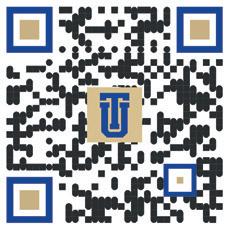
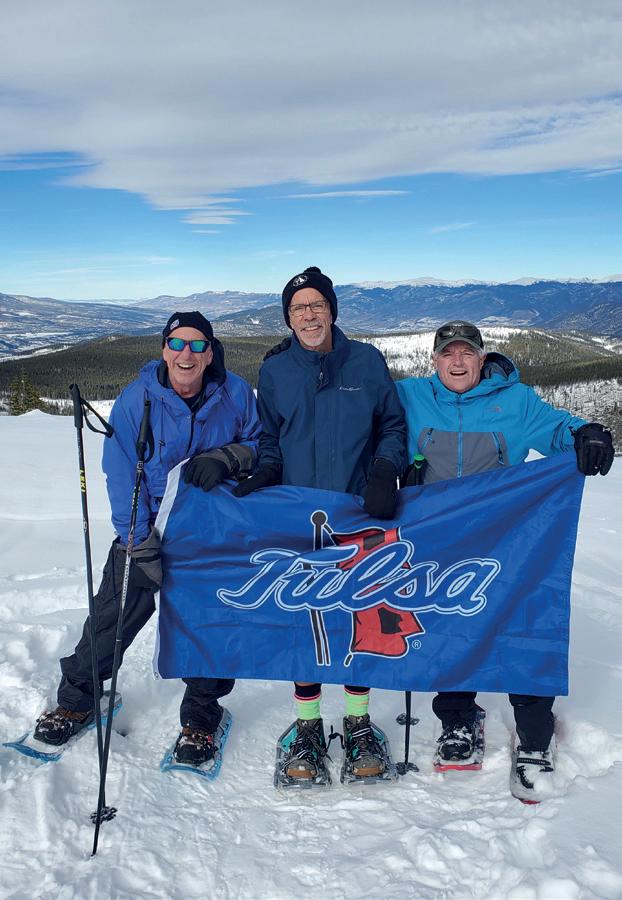
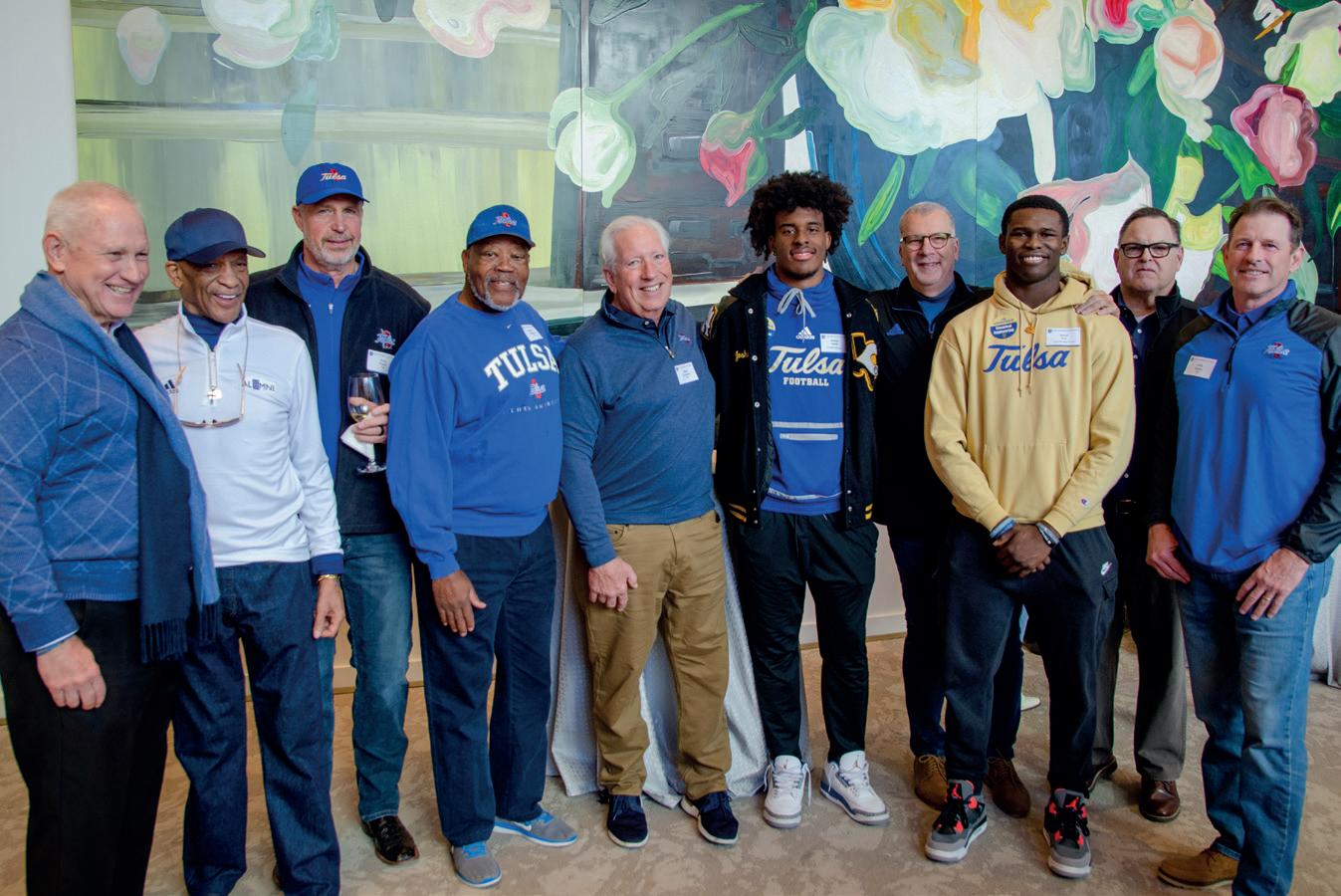
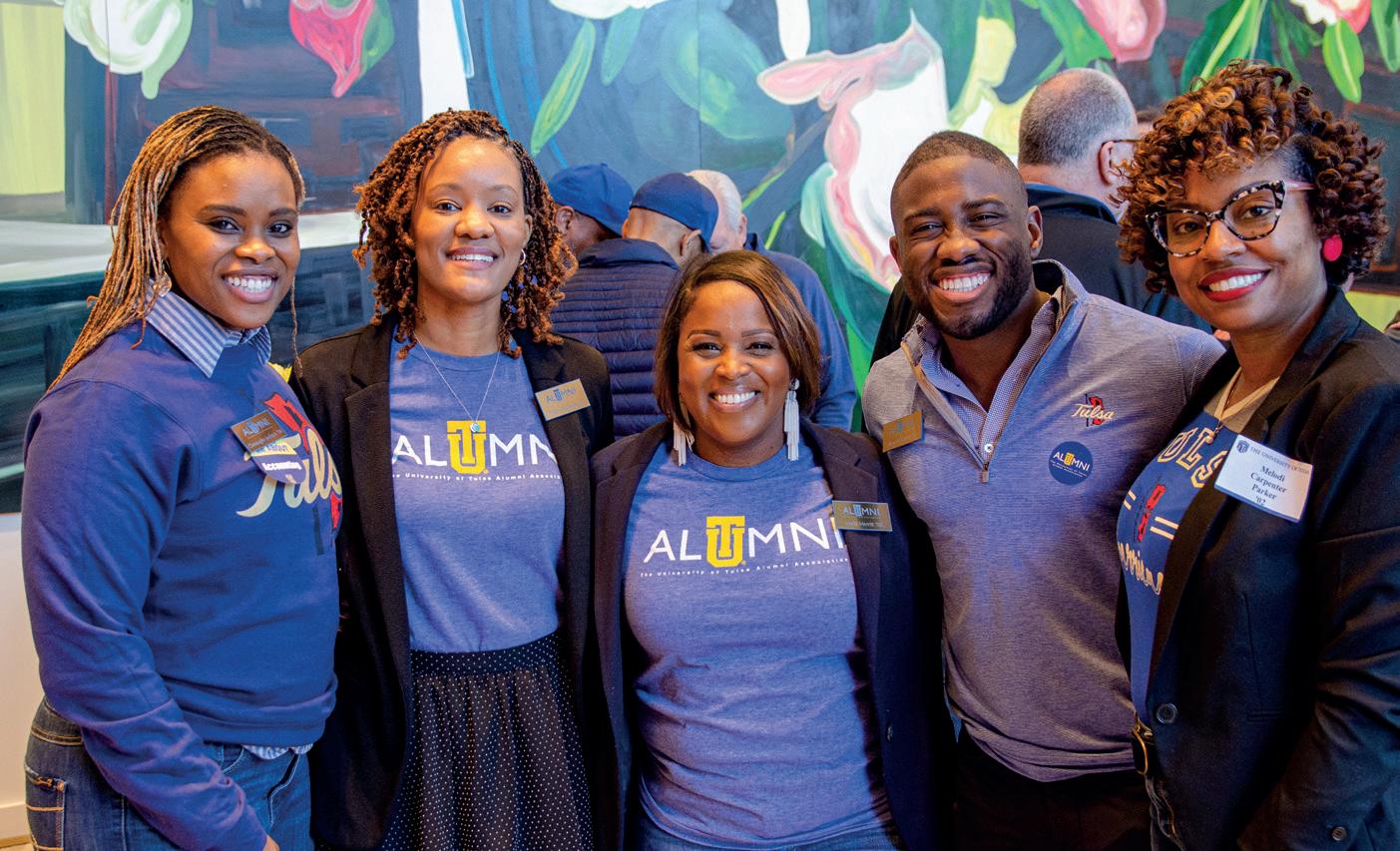
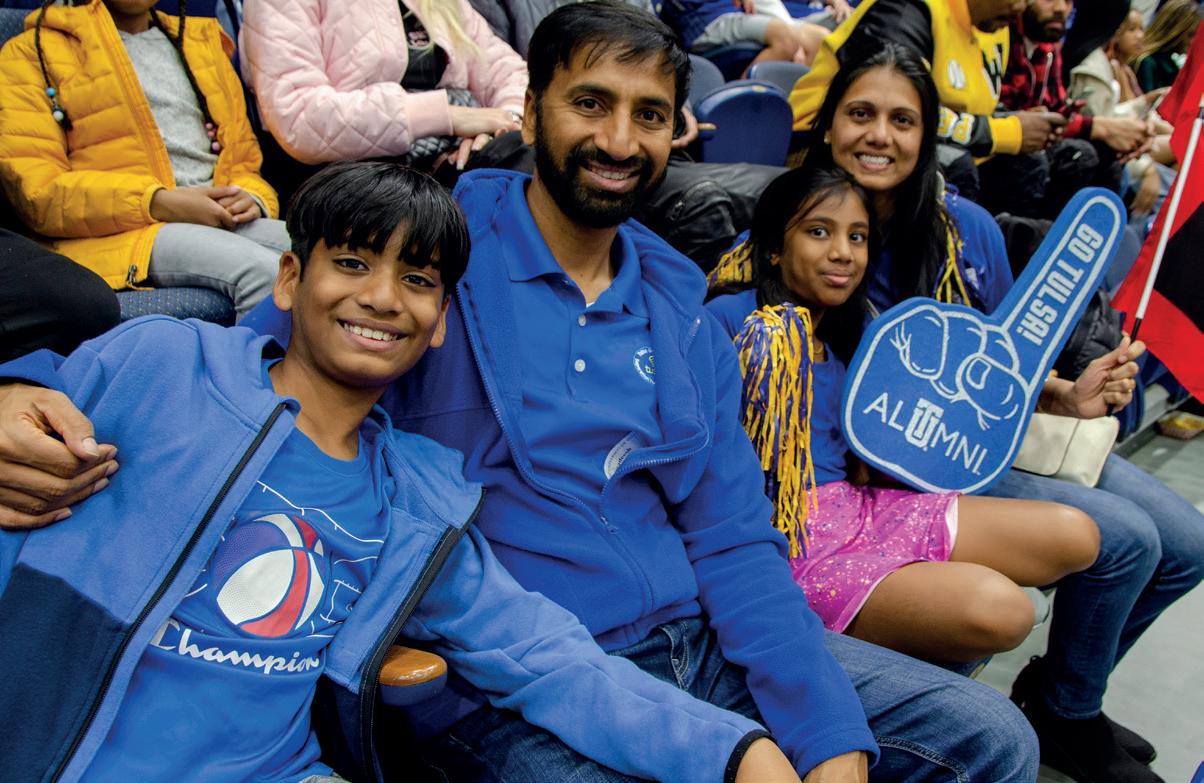



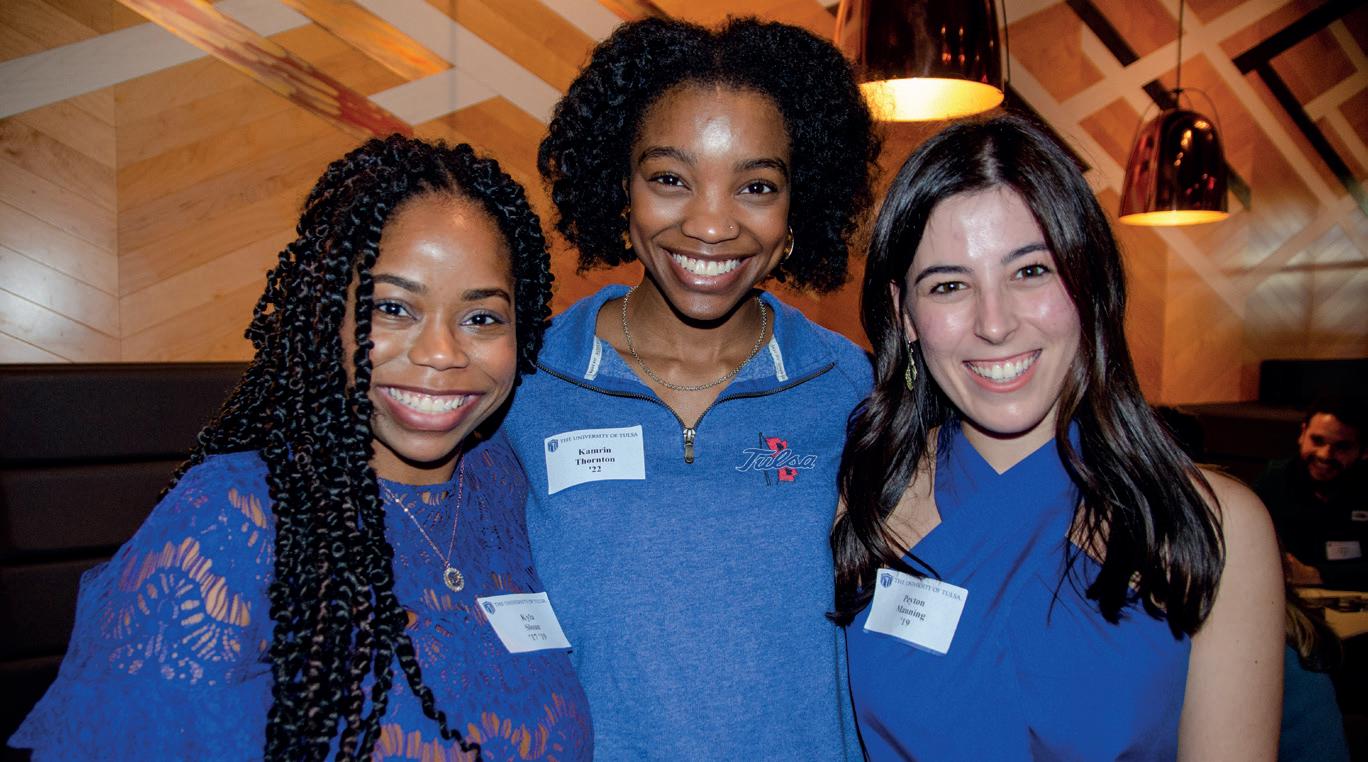





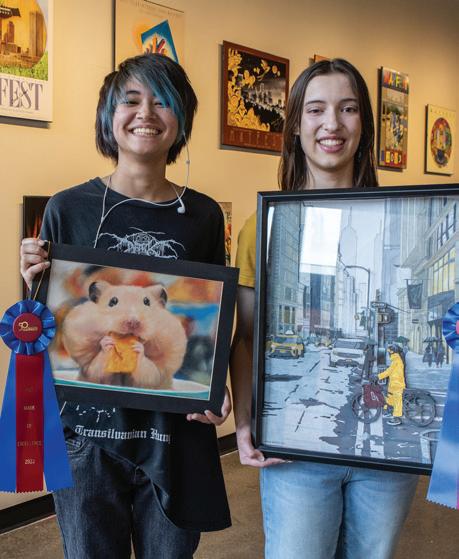












Art. Music. Food.
The University of Tulsa is proud to elevate the promotion of visual and performing arts through this free, family-friendly, three-day, outdoor festival in the downtown Tulsa Arts District and Historic Greenwood District. This year marks the second Tulsa Mayfest presented by The University of Tulsa.

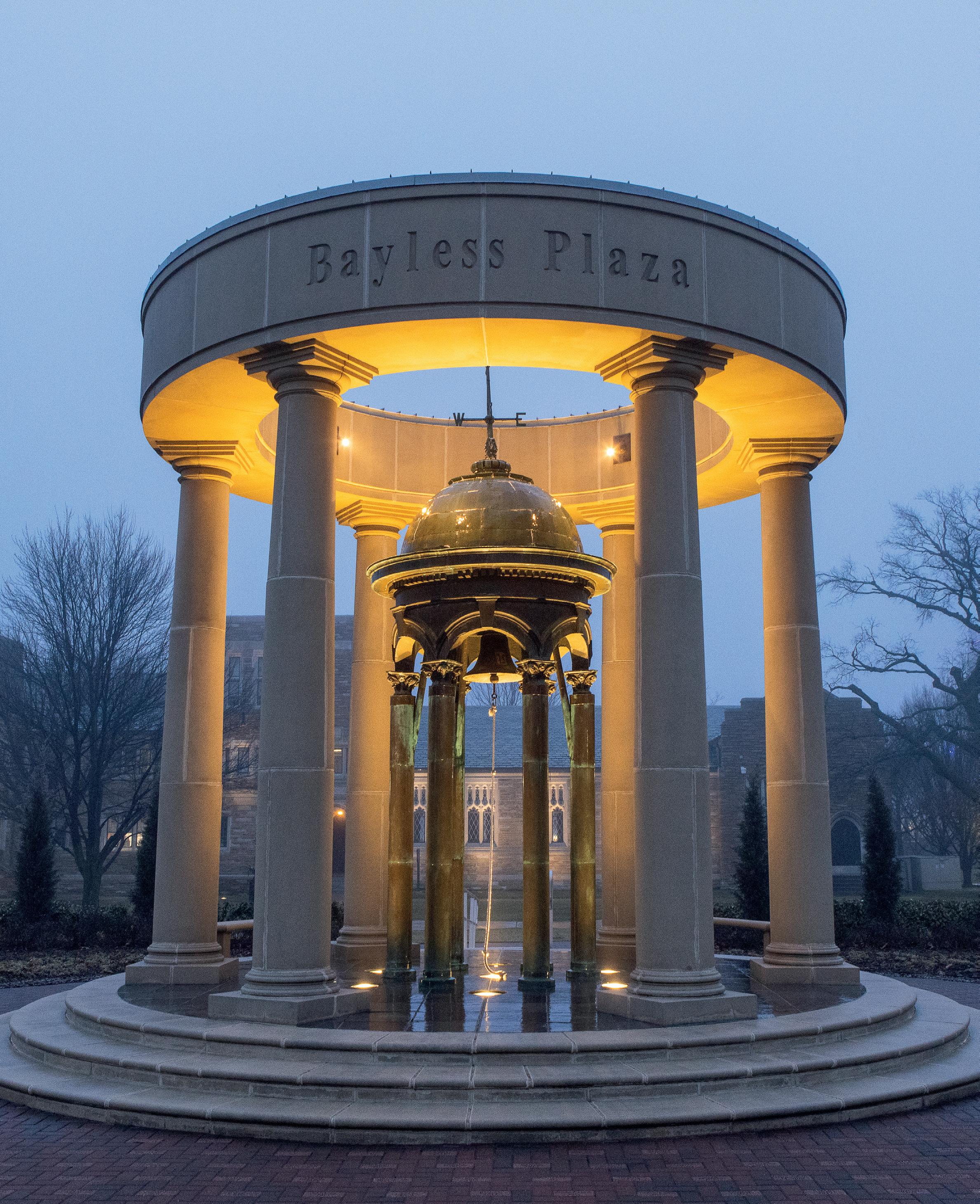
TU does not discriminate on the basis of personal status or group characteristics including, but not limited to individuals on the basis of race, color, religion, national or ethnic origin, age, sex, disability, veteran status, sexual orientation, gender identity or expression, genetic information, ancestry, or marital status. Questions regarding this policy may be addressed to the Office of Human Resources, 918-631-2616. TU#24157
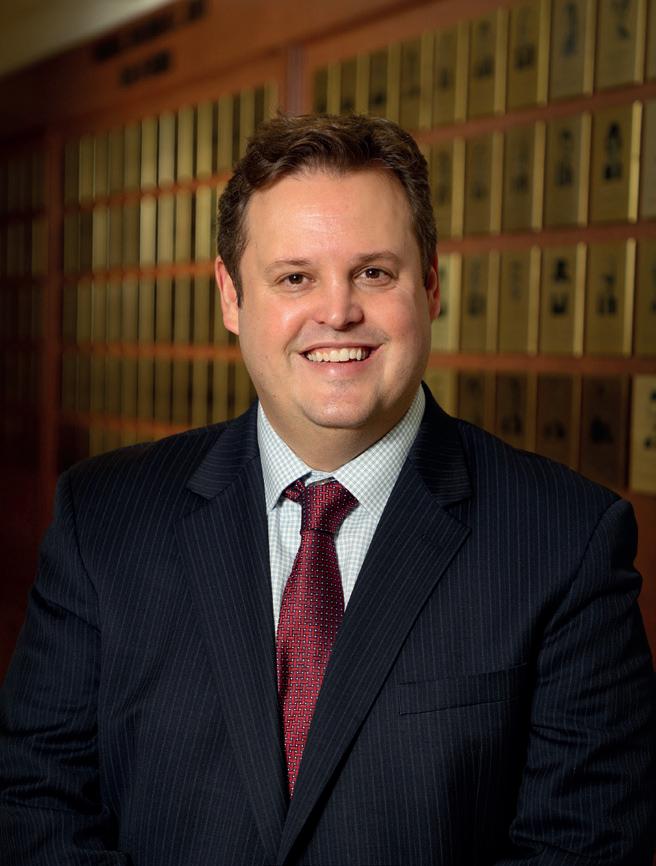
james.corey@utulsa.edu

The University of Tulsa’s new vice president for university advancement and alumni engagement
If you’ve attended TU athletic events, college activities, or alumni celebrations in 2024, you’ve probably already been introduced to new VP James Corey, who has been busy getting to know our university and its biggest fans.
James most recently served as assistant vice president of development at American University in Washington, D.C., where he provided strategic oversight for the creation and advancement of fundraising initiatives. James is committed to TU’s mission, and we welcome his expertise and enthusiasm in support of the Golden Hurricane family.
Reign ‘Cane!